
|
TORAH PORTIONS
yeom
MASEI (Journeys)
Numbers 33:1-36:13
There are 45 Aleph-Tavs in this week's Torah portion
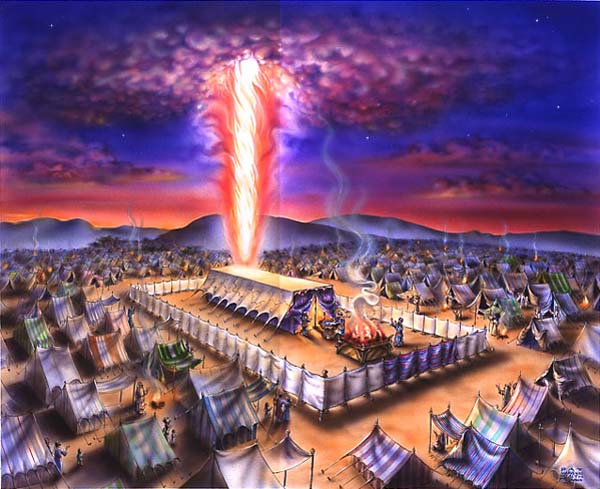
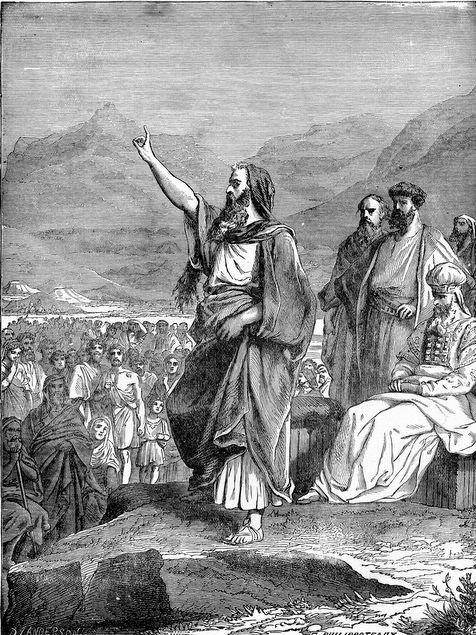
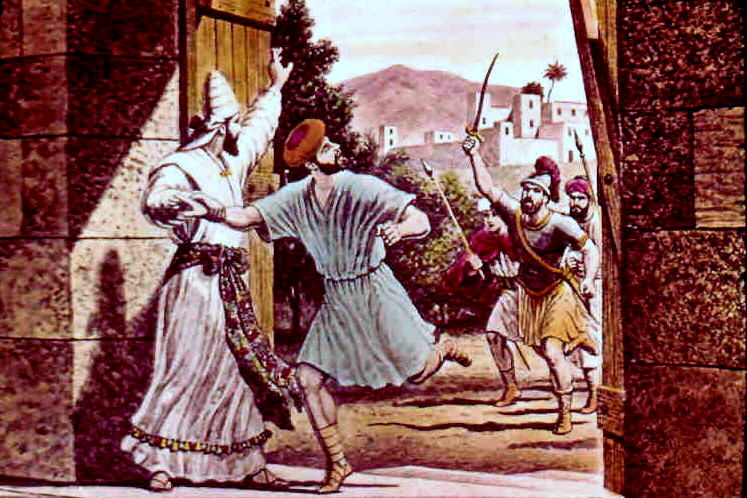
Note: you will need the oldheb.ttf (old Hebrew) and the SGreek Mediuim fonts to see the Hebrew and Greek text, as well as the three English fonts: Cooper Black, Impact and Frontlight MT Light. Right click the links and choose "Save Target As". Then go to the file, and either right click them and choose "install", or drag them into the font page.
oldheb.ttf
SGreek Medium
Cooper Black
Impact
Frontlight MT Light
NOTE: All of the yous and yours underlined as "you" and "your" indicates that the you and the your are plural. Also any of the words that are in bold pink lettering as "you" refers to the feminine gender, but it is only applied when it does not commonly refer to a woman. This only is applied to this week's Torah portion text at this time.
CHAPTER 33
Numbers 33:1-56
Num 33:1 These are the journeys of the Sons of Israel, whom they went out from the land of Egypt, by their armies, on the hand of Moses and Aaron, 2 and Moses wrote ta-their outgoings, by their journeys, upon the Mouth of hwhy: and these are their journeys, by their outgoings.
3 And they pulled up (journeyed) from Rameses in the first renewed month, on the five ten (fiveteen, fifteen) day of the first renewed month; after the Passover, the Sons of Israel, they went out on a high hand to the eyes of all of the Egyptians. 4 And Egypt was burying ta which hwhy had struck among them: every firstborn, and on their elohim, hwhy did (made, executed) Judgments.
5 And the Sons of Israel, they pulled up (journeyed) from Rameses, and they camped in Succoth,
6 and they pulled up (journeyed) from Succoth, and they camped in Etham, which is on the edge of the wilderness,
7 and they pulled up (journeyed) from Etham, and returned upon Pi Hahiroth, which is upon the face of Baal Zephon:
and they pulled up (journeyed) to the face of Migdol,
8 and they pulled up (journeyed) from P'ni Hahiroth (Pi Hahiroth, the face of Hahiroth), and went over in the midst of the sea to the wilderness, and they went a way of three days in the Wilderness of Etham, and they camped in Marah,
9 and they pulled up (journeyed) from Marah, and came to Elim: and in Elim were two ten (twoteen, twelve) eyes of water, and seventy palm trees; and they camped there,
10 and they pulled up (journeyed) from Elim, and they camped upon the Reeds Sea [(Yam Suph, the Sea of Reeds)],
11 and they pulled up (journeyed) from the Reeds Sea [(Yam Suph, the Sea of Reeds)], and they camped in the Wilderness of Sin,
12 and they pulled up (journeyed) from the Wilderness of Sin, and they camped in Dophkah,
13 and they pulled up (journeyed) from Dophkah, and they camped in Alush,
14 and they pulled up (journeyed) from Alush, and they camped in Rephidim, and water was not there for the people to drink,
15 and they pulled up (journeyed) from Rephidim, and they camped in the Wilderness of Sinai,
16 and they pulled up (journeyed) from the Wilderness of Sinai, and they camped in Kibroth-Hattaavah,
17 and they pulled up (journeyed) from Kibroth-Hattaavah, and they camped in the Hazeroth,
18 and they pulled up (journeyed) from Hazeroth, and they camped in Rithmah,
19 and they pulled up (journeyed) from Rithmah, and they camped at Rimmon-Parez,
20 and they pulled up (journeyed) from Rimmon-Parez, and they camped in Libnah,
21 and they pulled up (journeyed) from Libnah, and they camped in Rissah,
22 and they pulled up (journeyed) from Rissah, and they camped in Kehelathah (Meeting Area),
23 and they pulled up (journeyed) from Kehelathah (Meeting Area), and they camped in Mount Shapher,
24 and they pulled up (journeyed) from Mount Shapher, and they camped in Haradah,
25 and they pulled up (journeyed) from Haradah, and they camped in Makheloth,
26 and they pulled up (journeyed) from Makheloth, and they camped in Tahath,
27 and they pulled up (journeyed) from Tahath, and they camped in Tarah,
28 and they pulled up (journeyed) from Tarah, and they camped in Mithcah,
29 and they pulled up (journeyed) from Mithcah, and they camped in Hashmonah,
30 and they pulled up (journeyed) from Hashmonah, and they camped in Moseroth,
31 and they pulled up (journeyed) from Moseroth, and they camped in Bene Jaakan,
32 and they pulled up (journeyed) from Bene Jaakan, and they camped in Hor Hagidgad (Hole of the Cut Cleft Rocks),
33 and they pulled up (journeyed) from Hor Hagidgad (Hole of the Cut Cleft Rocks), and they camped in Jotbathah,
34 and they pulled up (journeyed) from Jotbathah, and they camped in Ebronah,
35 and they pulled up (journeyed) from Ebronah, and they camped in Ezion Gaber,
36 and they pulled up (journeyed) from Ezion Gaber, and they camped in the Wilderness of Zin, she is Kadesh,
37 and they pulled up (journeyed) from Kadesh, and they camped in Hor of the Mount [(Mount of the Hor, Mount Hor)], on the edge of the land of Edom, 38 and Aaron, the Priest, ascended to Hor of the Mount [(Mount of the Hor, Mount Hor)] upon the Mouth of hwhy, and died there in the fortieth year of the outgoing of the Sons of Israel from the land of Egypt, in the fifth renewed month, on the one of the renewed month, 39 and Aaron was a son of three and twenty and a hundred years in his death on Hor of the Mount [(Mount of the Hor, Mount Hor)],
40 and King Arad, the Canaanite, heard, and he dwelled in the negeb (south) in the land of Canaan, on the coming of the Sons of Israel,
41 and they pulled up (journeyed) from Hor of the Mount (Mount of the Hor, Mount Hor), and they camped in Zalmonah,
42 and they pulled up (journeyed) from Zalmonah, and they camped in Punon,
43 and they pulled up (journeyed) from Punon, and they camped in Oboth,
44 and they pulled up (journeyed) from Oboth, and they camped in Ije of the Abarim, in the border of Moab [(Ije of the Abarim, Eye of the Going Overs)],,
45 and they pulled up (journeyed) from Iim, and they camped in Dibon Gad,
46 and they pulled up (journeyed) from Dibon Gad, and they camped in Almon Diblathaim,
47 and they pulled up (journeyed) from Almon Diblathaim, and they camped in Mountains of the Abarim, to the face of Nebo,
48 and they pulled up (journeyed) from Mountains of the Abarim, and they camped in the plains (going overs) of Moab upon Jordan at Jericho [Jordan-Jericho)],
49 and they camped upon the Jordan, from House of the Jesimoth unto Abel haShittim [(Abel of the Shittim, Abel of the Acacias, Meadow of the Shittim, Meadow of the Acacias)] in the plains (going overs) of Moab.
50 And hwhy spoke to Moses in the plains (going overs) of Moab upon Jordan at Jericho [Jordan-Jericho)], to say, 51 Speak to the Sons of Israel, and you shall say to them, When you have gone over ta-the Jordan to the land of Canaan; 52 and you shall shall drive out (dispossess) ta-all of the dwellers of the land from your faces, and you shall make perish (destroy) ta all of their carved figures (masked figures), and you shall make perish (destroy) ta all of their casted idol (molten, libation) images, and you shall smash down (destroy) ta all of their high places: 53 And you shall possess ta-the land, and you shall dwell in her: for I have given ta-the land to yourselves to possess her. 54 And you shall inherit ta-the land on the lot by your families: to the many, you shall multiply (increase) ta-his inheritance, and to the few, you shall diminish ta-his inheritance: to which the lot shall go out to him there, shall belong to him; you shall inherit by the tribes of your fathers. 55 And if you will not drive out (dispossess) ta-the dwellers of the land from your faces; and shall be whom you let remain of them for pricks (briers, entwinings, hedges) in your eyes, and thorns in your sides, and they shall vex (distress) you upon the land which you shall dwell in her. 56 And shall be, as the which I devise (compare) to do to them, I shall do to you.
(NOTE: Not all verses will have comments)
These are the Israelite's encampments throughout their journeys and their definitions (Note: Strong's concordance references are noted by the "S"):
Verses three and four
1. RAMESES
3 And they pulled up (journeyed) from Rameses in the first renewed month, on the five ten (fiveteen, fifteen) day of the first renewed month; after the Passover, the Sons of Israel, they went out on a high hand to the eyes of all of the Egyptians. 4 And Egypt was burying ta which hwhy had struck among them: every firstborn, and on their elohim, hwhy did (made, executed) Judgments.
RAMSES [in Egypt proper, in ancient Egypt] (In Hebrew "Rah-m'seys" (oomer) S7486): Unknown
This is the location where the Israelites began their journey on the fifteenth day of the first month of Aviv/Nissan. It is noted in the Torah portion of Bo, in the book of Exodus
Exodus 12:51 And was on this same day that hwhy brought out ta-the Sons of Israel from the land of Egypt, upon their armies.
Exodus 13:4 Today, you came out in the renewed month of the Aviv.
And it is noted that they left at nightime, which is noted in the Torah portion of R'ey, in the book of Deuteronomy
Deutereonomy 16:1 Keep (Observe, Guard) the renewed month of the Aviv, and you shall make (do) the Passover to hwhy, your Elohim: for in ta-the renewed month of the Aviv, hwhy, your Elohim, brought you out from Egypt at night.
That means they went out when hwhy led as a Pillar of Fire. That means that the Egyptians who were present during the Israelites' departure witnessed the Pillar of Fire at night.
In Egypt, "Ra" is their sun god, but according to Bill Cloud of Shoreshim Ministries, "ra"- Resh, Ayin- (er) is the word for "evil". Continuing, "meses"- Mem, Samek, Samek (oom) is the Egyptian equivalence to "moshe"- Mem, Shin, Heh (hsm), meaning "to draw out", which Moses' name was called when the Pharaoh's daughter drew him out of the water of the nile, which is noted in the Torah portion of Sh'moth, in the book of Numbers
Exodus 2:5 And the daughter of Pharaoh, she descended (went down) to wash upon the river; And her young women were walking upon the hand of the river; and she saw ta-the ark in the midst of the reeds, and she sent ta-her female servant, and she took her. 6 And she opened her, and she saw him, ta-the lad (male child): and behold, a young boy was weeping. And she had compassion (pity) upon him, and she said, This one is from the lads (male children) of the Hebrews. 7 And his sister, she said to the daughter of Pharaoh, I can go, and I can call a wet nurse from the Hebrew women for you, and she may wet nurse ta-the lad (male child) for you. 8 And the daughter of Pharaoh, she said to her, Go. And the maiden (virgin, secret young girl), she went and she called ta-the mother of the lad (male child). 9 And the daughter of Pharaoh, she said to her, Go (Walk) ta-this lad (male child), and wet nurse him for me, and I, I will give ta-your wages. And the woman, she took the lad (male child), and she wet nursed him. 10 And the lad (male child) grew, and she brought (gave) him to the daughter of Pharaoh, and became to her for a son. And she called his name, Moses: And she said, For I drew him from the water.
In this instance, Rameses in Egypt means "the sun god draws out", but also, in Hebrew, it means "evil draws out". One can also say that the Israelites left the place that draws out evil, but the name can also a play on the other meaning by saying "the Son of God is drawn out", who is Yeshua the Messiah.
!!!hwhy Kl dbk
This next theory gives it a more emphatic meaning to Rameses. As I noted earlier, mases and moshe are the same, but there is another theory. Moshe (hsm) (meses in Egyptian (oom)) is also an abbreviation for the Hebrew word "Moh-shee-akh"- Mem, Shin, Yod, Khet (xysm), meaning "anointed", which is the Greek equivalent for "Christ", in English, "Messiah". This would also be Moses' full name of Moses, a symbolic "Messiah". In my humble, but strong opinion, Rameses (oomer) means "Evil Messiah", or "Anti-Messiah", which is the Greek equivalent for "Anti-Christ". Moses, or Moshe, who was the symbol of the Messiah, brought out the Israelites from the land of Egypt from "the Anti-Messiah". Spiritually, Yeshua HaMashiakh- Yeshua, the Messiah, (in Greek, Jesus, the Christ) delivered us from the spiritual Egyptian world, from the worldly city of Rameses- the "Anti-Messiah".
!!!!!hwhy Kl dbk
A couple of examples regarding the Anti-Messiah coming in these last days, which is noted by the apostle John, his epistle
1 John 2:18 Little children, it is the last time: and as ye have heard that Anti-Messiah shall come, even now are there many anti-messiahs; whereby we know that it is the last time. 19 They went out from us, but they were not of us; for if they had been of us, they would no doubt have continued with us: but they went out, that they might be made manifest that they were not all of us. 20 But ye have an unction from the Holy One, and ye know all things. 21 I have not written unto you because ye know not the Truth, but because ye know it, and that no lie is of the Truth. 22 Who is a liar but he that denieth that Yeshua is the Messiah? He is Anti-Messiah, that denieth the Father and the Son. 23 Whosoever denieth the Son, the same hath not the Father: (but) he that acknowledgeth the Son hath the Father also. 24 Let that therefore abide in you, which ye have heard from the beginning. If that which ye have heard from the beginning shall remain in you, ye also shall continue in the Son, and in the Father.
1 John 4:1 Beloved, believe not every spirit, but try the spirits whether they are of hwhy: because many false prophets are gone out into the world. 2 Hereby know ye the Spirit of hwhy: Every spirit that confesseth that Yeshua, the Messiah, is come in the Flesh is of hwhy: 3 And every spirit that confesseth not that Yeshua, the Messiah, is come in the Flesh is not of hwhy: and this is that spirit of Anti-Messiah, whereof ye have heard that it should come; and even now already is it in the world. 4 Ye are of hwhy, little children, and have overcome them: because greater is He that is in you, than he that is in the world. 5 They are of the world: therefore speak they of the world, and the world heareth them. 6 We are of hwhy: he that knoweth hwhy heareth us; he that is not of hwhy heareth not us. Hereby know we the Spirit of Truth, and the spirit of error. 7 Beloved, let us love one another: for Love is of hwhy; and every one that loveth is born of hwhy, and knoweth hwhy. 8 He that loveth not knoweth not hwhy; for hwhy is Love.
In my humble, but strong opinion, we are in these last days, not just within years, but within months. Based on the information from Jonathan Cahn of Beth Israel Worship Center, these time lines regarding the harbingers he mentioned, We could be either in the Biblical seventh Shemitah year or within the Jubilee Year. In my humble, but strong opinion, the Jewish people in Israel had political talks regarding creating their own state of Israel in 1917 via the Balfour Declaration. Fifty years later, the Jubilee Year, in 1967, the Jewish people recaptured the eastern part of Jerusalem, and now have claimed the whole territory of Jerusalem for the first time in 1900 years. What is fifty years from 1967? 2017!!!, the next Jubilee Year, which had occurred. I am not prophecying. This is just an observation. If this time line is correct, the religious Jews should be in talks with the Israeli government, at minimum, to have a claim to the Temple Mount to start building the Jewish Temple for the first time since King Herod. If this does occur, will this be the approach, or the beginning, of the following year, 2018, of the new cycle of the seven years Shemitah, to start the Seven Years Tribulation? I cannot say, but I can tell you that we are approaching this account not within years, but within "months". On December 5th, 2017, United States President, Donald Trump, did not sign the waiver to delay moving the U.S. Embassy to Jerusalem from Tel Aviv, and the U.S. Embassy at Jerusalem on May 14th, 2018. Donald Trump is called a modern day Cyrus, and the Jerusalem Temple Institute made a commemorative coin with both President Trump and king Cyrus side by side.
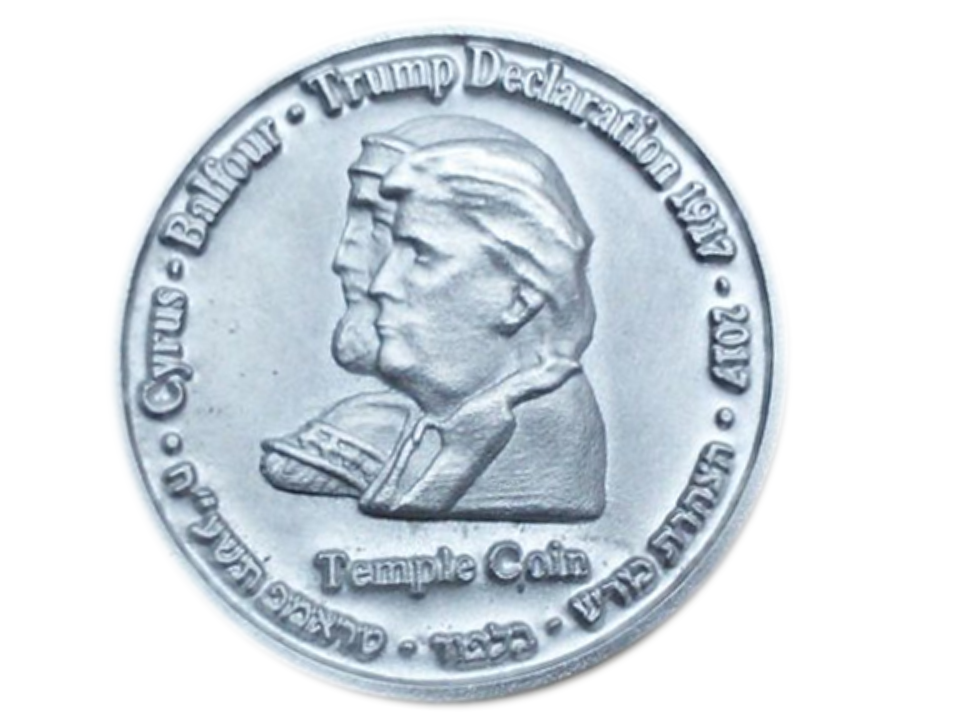
This is another potential sign that has occurred early in 2016. A new exibit of a full and life size Noah's Ark, named Ark Encounter, in Kentucky, has just recently opened to the public, a first in human history, which is based on this account, which is noted in the Torah portion of Noakh, in the book of Genesis
Genesis 6:12 And Elohim saw ta-the Earth, and behold, was corrupt of her; for all flesh had corrupted ta-His Way upon the Earth. 13 And Elohim said to Noah, The end of all flesh has come to My Face; for the Earth is filled of violence from their faces; and behold, I will waste them off [(cast them off)] ta-the Earth. 14 Make for yourself an ark of trees (wood) of gopher (cypress) [(gopher trees, cypress trees, gopher wood, cypress wood)]; you shall make rooms in ta-the ark, and you shall coat (atone, cover) her from the housing (inside) and from without (outside) on pitch (bitumen, cover). 15 And this is which you shall make of her: three hundred cubits shall be the length of the ark, fifty cubits shall be her breadth, and thirty cubits shall be her height. 16 You shall make a window (noon side window, pressed side window) for the ark, and by a cubit you shall finish her from by above; and you shall set the door of the ark on her side; of lowers (unders, [cellars]), a second, and a third you shall make (do) of her. 17 And behold I, I am bringing ta-the flood of waters upon the Earth to waste (cast, destroy) all flesh which is in him the Breath of Life from under the Heavens; all that are on the Earth shall expire.
Is this a "sign" that we are approaching the end times? If so, could this make us "Noahs"? We'll see. Could we also be experiencing this account, which is noted by the apostle Paul in his letter to the assembly in Thessalonica?
1 Thessalonians 4:13 But I would not have you to be ignorant, brethren, concerning them which are asleep, that ye sorrow not, even as others which have no hope. 14 For if we believe that Yeshua died and rose again, even so them also which sleep in Yeshua will hwhy bring with Him. 15 For this we say unto you by the Word of the Lord, that we which are alive and remain unto the coming of the Lord shall not prevent them which are asleep. 16 For the Lord, Himself, shall descend from the heavens with a shout, with the voice of the archangel, and with the Trump (or Shofar) of hwhy: and the dead in Messiah shall rise first: 17 Then we which are alive and remain shall be caught up together with them in the clouds, to meet the Lord in the air: and so shall we ever be with the Lord. 18 Wherefore comfort one another with these words.
We will soon find out, if the account of the Temple Mount talks come to fruition.
Verse five
2. SUCCOTH
5 And the Sons of Israel, they pulled up (journeyed) from Rameses, and they camped in Succoth,
SUCCOTH [in Egypt, in the Sinai Peninsula, in ancient Egypt] (In Hebrew "Soo-koth" (tko) S5523): Booths, from S5521- Hut, tabernacle, tent
This was the Israelites' first stop of their journeys while they were still in Egypt. This is the same Hebrew word for the Biblical Fall High Holy of the Feast of Sukkoth, on the seventh Biblical month of Ethanim/Tishri, starting the fifteenth day of the month, which is noted in the Torah portion of Emor, in the book of Leviticus
Leviticus 23:33 And hwhy spoke to Moses, to say, 34 Speak to the Sons of Israel, to say, On the five ten (fiveteen, fifteenth) day of this seventh renewed month shall be the Feast of the Booths (Tabernacles, Sukkoth) of seven days to hwhy.
I have shown in my teaching "When was Yeshua born? Evidence based on scriptural facts" that Yeshua, the Messiah, was born on the first day of the Biblical feast of Sukkoth (twko). Based on this, hwhy was providing this place, Succoth, as the place for the Israelites to celebrate their deliverance from Egypt. Yeshua will ultimately do the same thing for us by snatching us away for His seven year "Sukkoth Wedding Feast" for us in Yeshua. You can find my Sukkoth teaching, "When Was Yeshua Born? Evidence Based on Scriptural Facts", by clicking on the link below to get to the webpage.
WHEN WAS YESHUA BORN? EVIDENCE BASED ON SCRIPTURAL FACTS
Another example of Sukkoth is in the parable of the virgins, which is noted in the Gospel of Matthew
Matthew 25:10 And while they went to buy, the bridegroom came; and they that were ready went in with him to the marriage: and the door was shut. 11 Afterward came also the other virgins, saying, Lord, Lord, open to us. 12 But he answered and said, Verily I say unto you, I know you not. 13 Watch therefore, for ye know neither the day nor the hour wherein the Son of Man cometh.
I connected this Gospel parable to the Feast of Sukkoth. You can find my teaching "The Parable of the Ten Virgins" by clicking on the link below to get to the webpage.
THE PARABLE OF THE TEN VIRGINS
Verse six
3. ETHAM
6 and they pulled up (journeyed) from Succoth, and they camped in Etham, which is on the edge of the wilderness,
ETHAM [in Egypt, in the Sinai Peninsula, in ancient Egypt] (In Hebrew "Eythahm" (Mta) S864): Arrive, It could also be the plural of S854 "eyth" (ta)- Nearness
There is no information about this location, but it is now known that it is at the edge of the wilderness in the modern day Sinai Peninsula, in Egypt, which I will explain in location number 4.
This place was where hwhy wanted His People to be "drawn near" to Him. Our Heavenly Father wants us to do the same thing by drawing ourselves near to Himself through Yeshua, the Messiah. This is what Yeshua said to His disciples, which is noted in the Gospel of John
John 12:31 Now is the judgment of this world: now shall the prince of this world be cast out. 32 And I, if I be lifted up from the earth, will draw all men unto Me.
Verse seven
4. PI HAHIROTH
7 and they pulled up (journeyed) from Etham, and returned upon Pi Hahiroth, which is upon the face of Baal Zephon:...
PI HAHIROTH [in Egypt, in the eastern Sinai Peninsula, in ancient Egypt] (In Hebrew "Pee Ha-Khee-roth" (tryxh yp) S6367): Mouth of the gorges; Pi: from S6310- mouth, edge, portion, side, from S6284- to puff, blow away; Hiroth: from S2356- cavity, socket, den, from S3252- crevice of a serpent, cell of a prison.
I will provide the scripture information in location number 6.
This place was located at the shore in the traditional Wilderness of Sinai, which is now proven to be still part of Egyptian territory. This is a map during the time of Moses, before 1400 BC, showing the ancient territorial area of Egypt, which includes the Sinai Peninsula
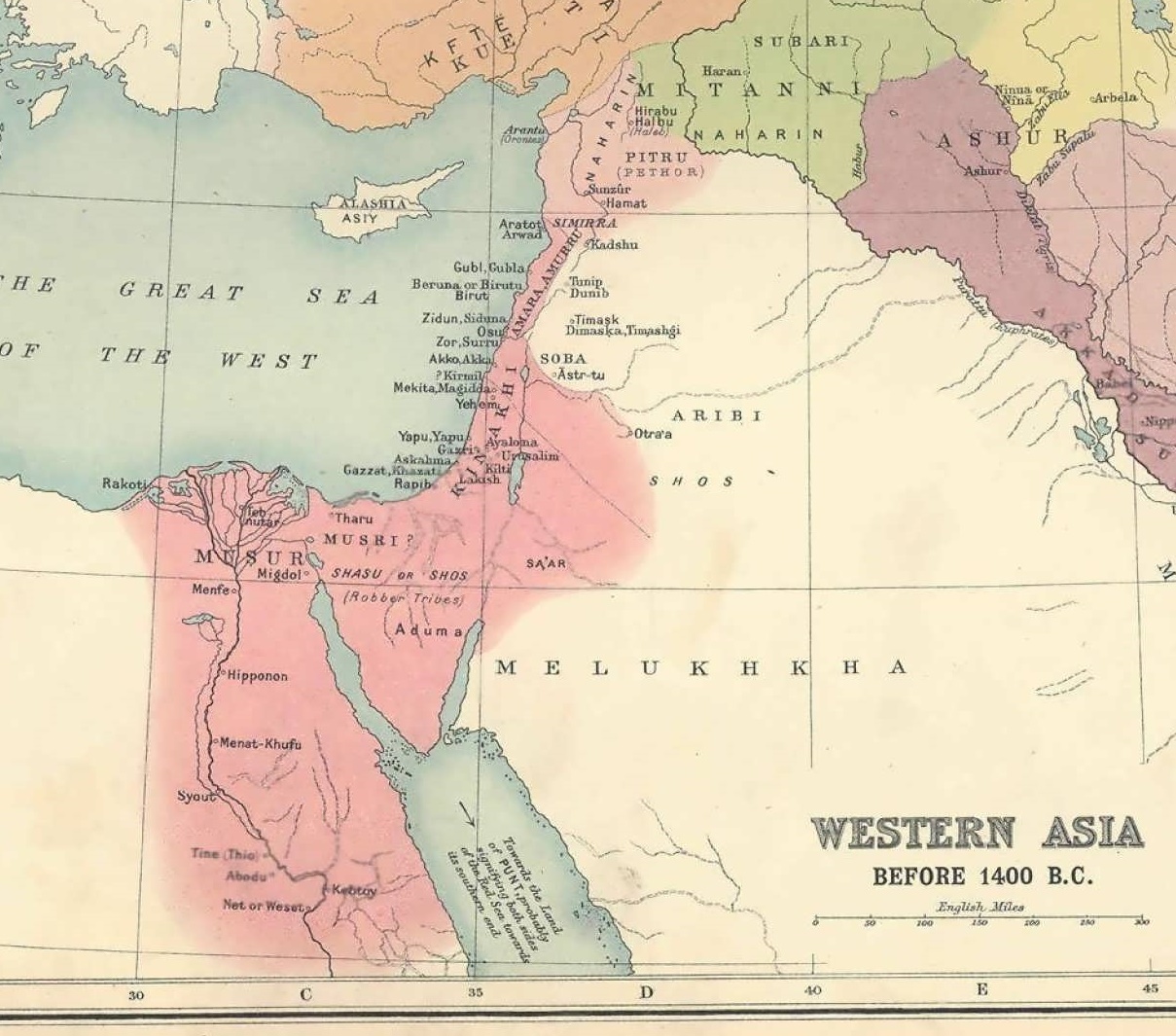
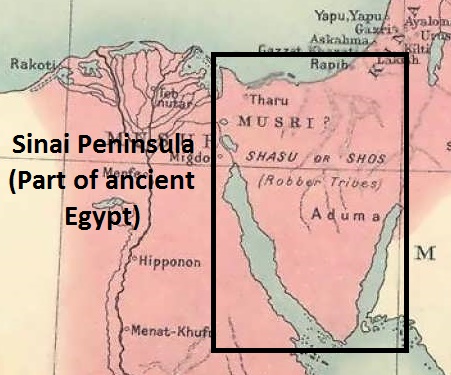
This reveals that the Sinai Peninsula was part of Egypt at the time of Moses, meaning that the Red Sea crossing wasn't west of the Sinai Peninsula. It is located at the entrance of the high mountain that enter today's Nuweiba Beach at the Gulf of Aqaba (also known as "the Gulf of Ya'akov" (the Gulf of Jacob) between modern day Saudi Arabia and Egypt
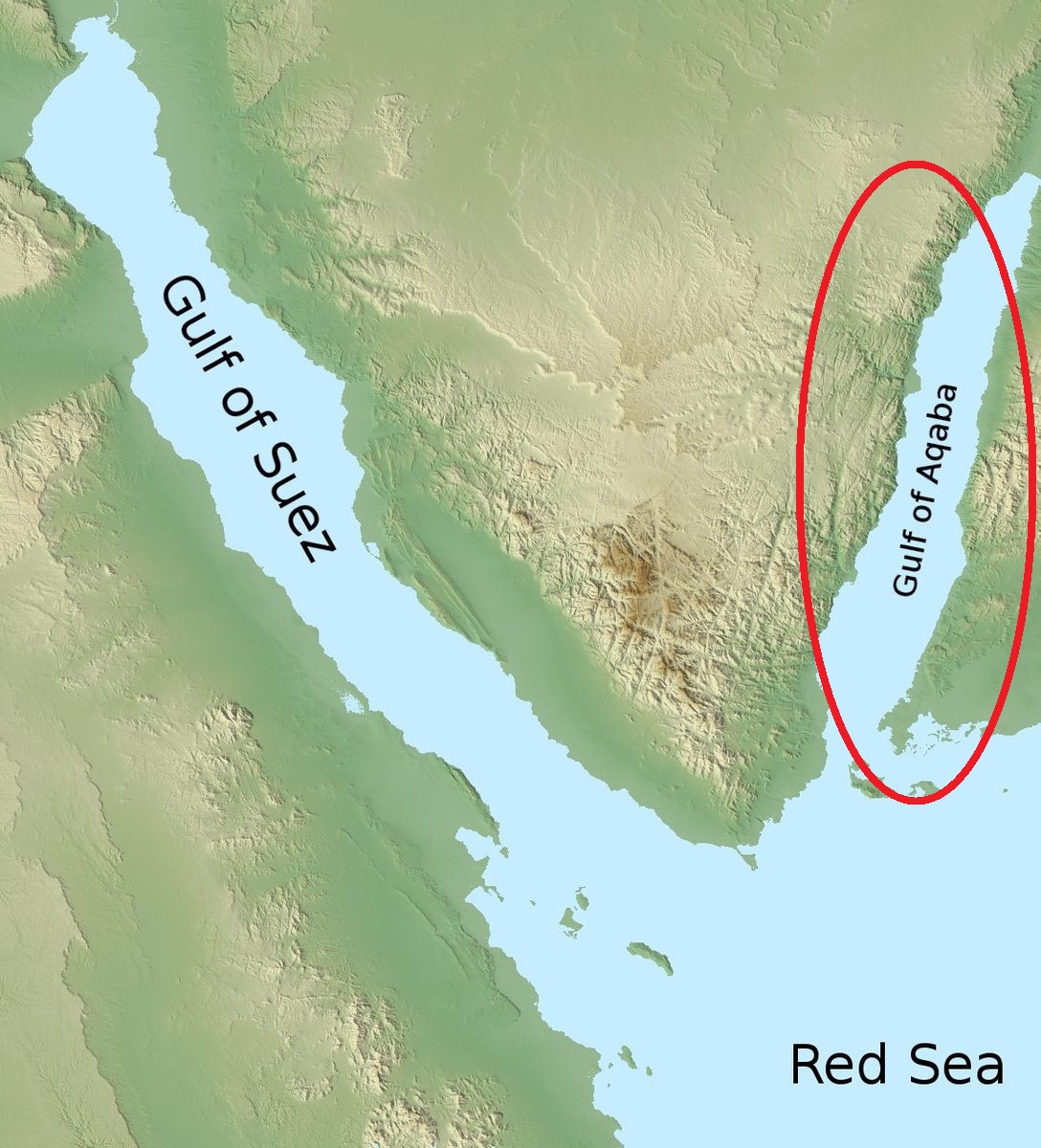
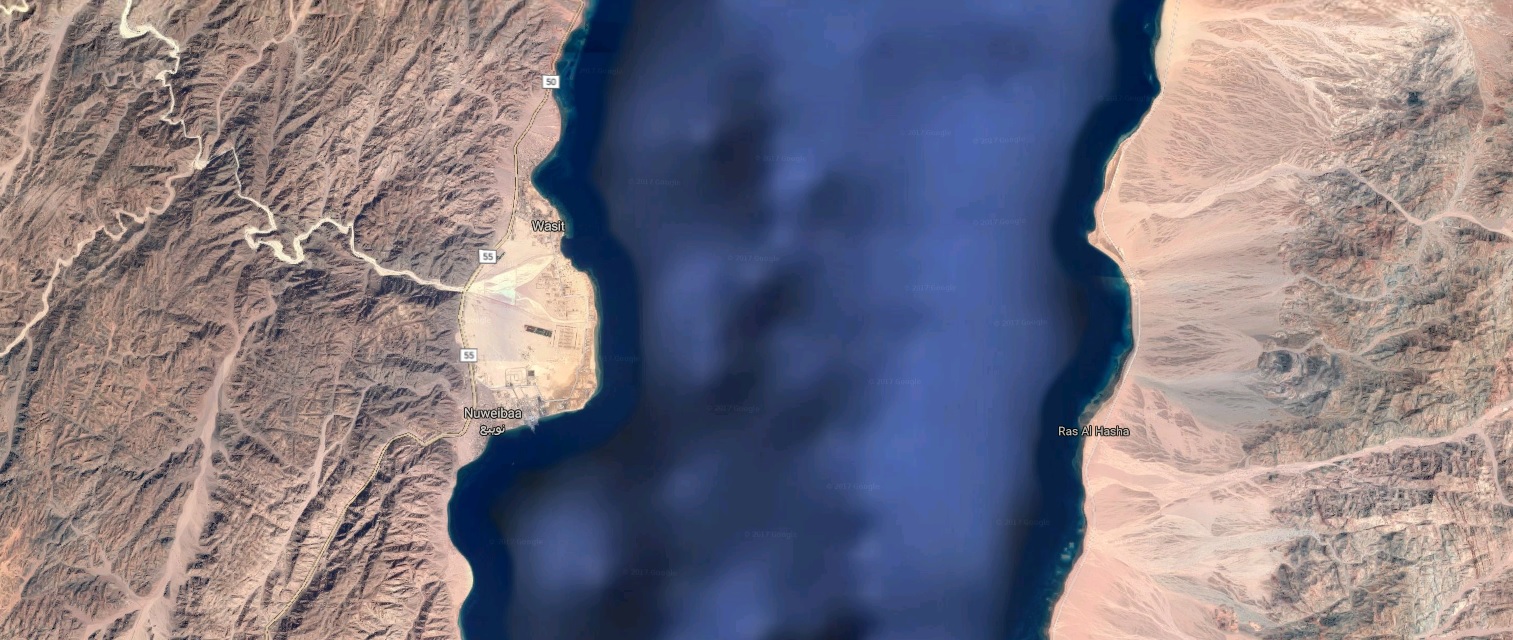
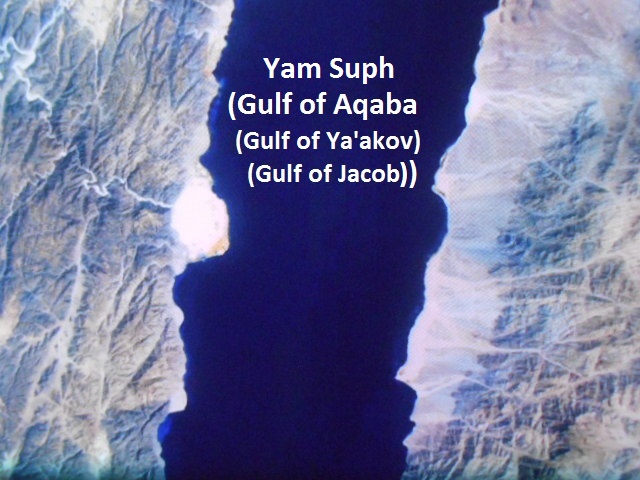
Pi HaHiroth was commonly named to be the high mountains next to the Israelites, where the Israelites were trapped between the ocean and the mountains, but researching further, it is the opening, or entrance, to modern day Nuweiba Beach, on the east coast of the traditional Sinai Peninsula, in modern day Egypt, as well as ancient Egypt.
This was the entrance in which Pharaoh and his army occupied at their arrival, to make sure the Israelites didn't escape.
This is a satelite image of the area of Pi Hahiroth, highlighted in red
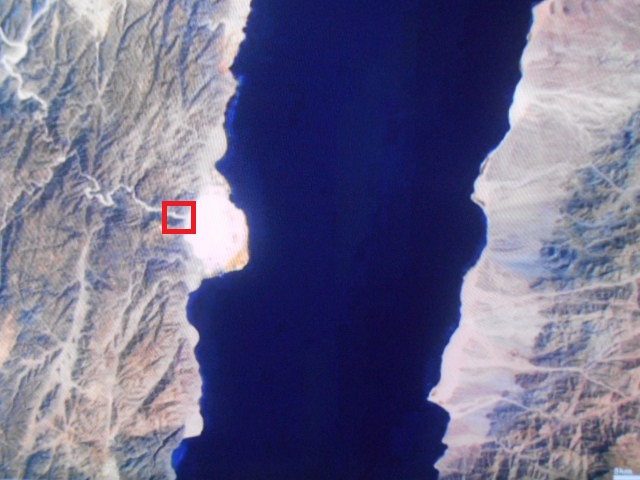
This is an image of the entrance, which is Pi Hahiroth
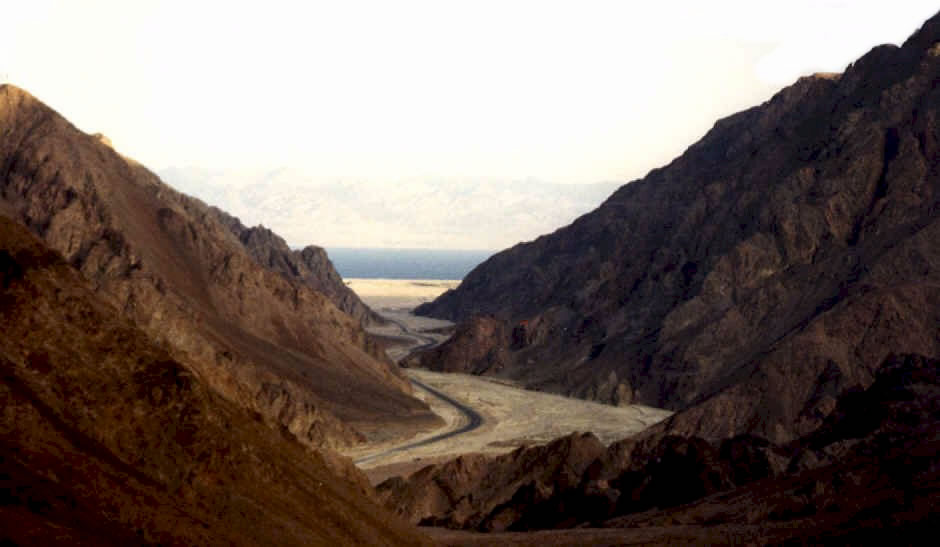
This is a street view of the entrance at Pi Hahiroth. Based on the size of the vehicle, the size of the entrance's proximity is between 350 and 380 feet wide
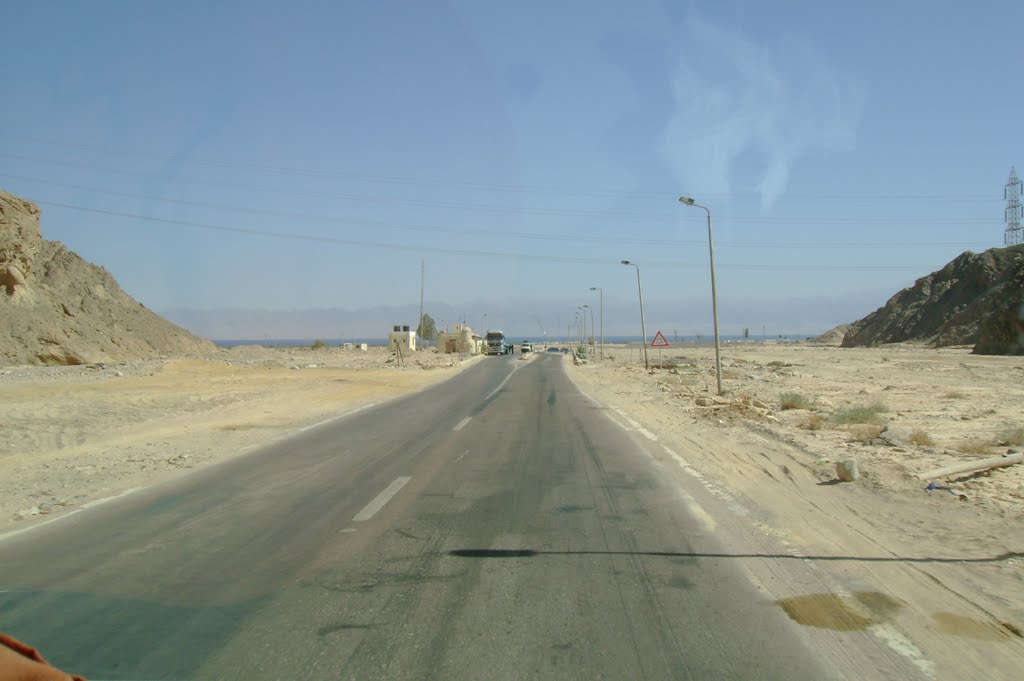
This was the entrance in which Pharaoh and his army occupied at their arrival
This was one of the the areas hwhy wanted His People to look up and cry out to Him for deliverance. This was the Egyptian army's symbolic act to "close the mouth", or "close the door", and to entrap the Israelites from escaping from behind and symbolically from looking back and going back to their old lifestyle of slavery. This is also in a spiritual sense for us as believers in the Messiah to not look back to our old ways and our worldly lifestyles. Yeshua noted an example of this in the Gospel of Luke
Luke 9:61 And another also said, Lord, I will follow Thee; but let me first go bid them farewell, which are at home at my house. 62 And Yeshua said unto him, No man, having put his hand to the plough, and looking back, is fit for the Kingdom of hwhy.
5. BAAL ZEPHON
BAAL ZEPHON [in northeastern Saudi Arabia, in ancient Midian] (In Hebrew "Bah-ahl Ts'phohn" (Nwpu leb) S1189): Master of darkness (winter); Baal: from S1168 A Phoenician diety, from S1167 and 1166- master; from S1166- to marry; Zephon: from 6828- hidden, dark, used only of the north as a quarter (gloomy and unknown), from S6845- to hide (by covering over), hoard or reserve, to deny, to protect, to lurk
These were the mountains located on the other side of the Sea of Reeds (the Gulf of Aqaba) opposite of Pi Hahirtoh at the entrance of Nuweiba Beach in Egypt. This is the edge of the Midianite terrirory, the modern day northeastern part of Saudi Arabia, where Moses dwelled for forty years while residing with his father-in-law, Jethro, the Midianite. While there, Moses became well familiarized with this territory.
This is a satelite image of Baal Zephon highlighted in red
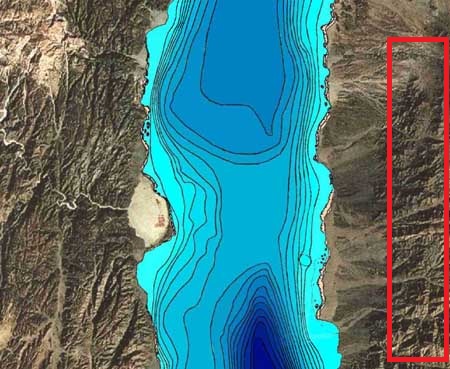
This is the Israelite's position in facing "the Master of Darkness", which is symbolically HaSatan (Satan). This is the same situation in our lives as believers in the Messiah when we are stuck at our spiritual Pi Hahiroth facing the Master of Darkness" in our spiritual walk with our Heavenly Father.
Verse seven
6. MIGDOL
7 ...and they pulled up (journeyed) to the face of Migdol,
MIGDOL [in Egypt, in the eastern Sinai Peninsula, in ancient Egypt] (In Hebrew "Meeg-dohl" (ldgm) S4024): Tower (from gadol- great)
These were the mountains on the Isaraelites' back side of the entrapment where they could not escape. From these three places, located in the area, with no place to turn, the Israelites should have looked up and cried out to hwhy. Instead, the Israelites spoke evil against Moses. This is noted, as well as the information of these last three stops, which is noted in the Torah portion of B'shalakh, in the book of Exodus
Exodus 14:1 And hwhy spoke to Moses, to say, 2 Speak to the Sons of Israel, and they will return, and they will camp by the face of Pi Hahiroth, between Migdol and between the sea; you shall camp upon (over) the sea by facing opposite of Baal Zephon. 3 And Pharaoh will say of the Sons of Israel, They are entangled in the land. The wilderness has shut up upon them. 4 And I will strengthen ta-the heart of Pharaoh and will pursue (chase) after them; and I will be glorified (honored) on Pharaoh, and on all of his force (valiant ones); and Egypt, they may know that I am hwhy. And they did so.... 9 And Egypt, they pursued (chased) after them, and all of the horses and chariots of Pharaoh, and his horsemen (hoofmen), and his force (valiant ones), they overtook them camping upon the sea, upon Pi Hahiroth, to the face of Baal Zephon. 10 And Pharaoh drew near, and the Sons of Israel lifted up ta-their eyes, and behold, Egypt was marching (journeying) after them; and they feared much: and the Sons of Israel, they cried to hwhy. 11 And they said to Moses, That because (failing) no graves were in Egypt to take us to die in the wilderness? What is this you have done to us by bringing us out from Egypt?
This is a satelite image of the location of Migdol, highlighted in red
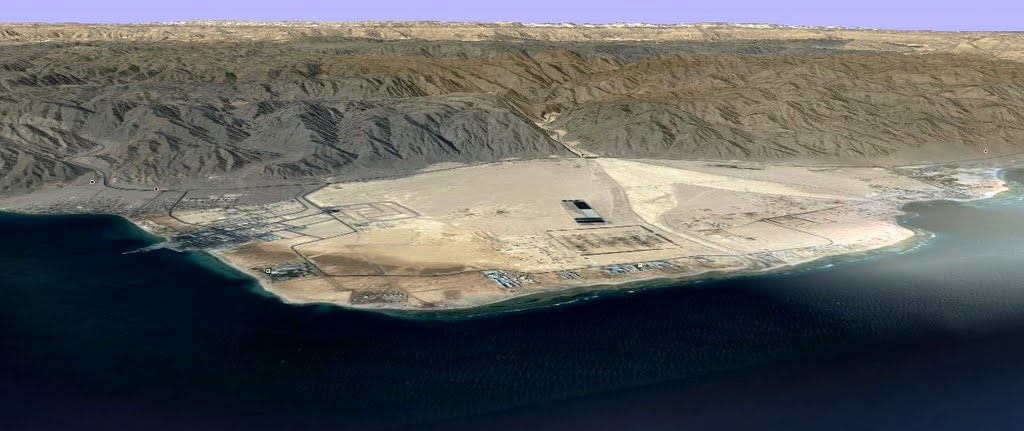
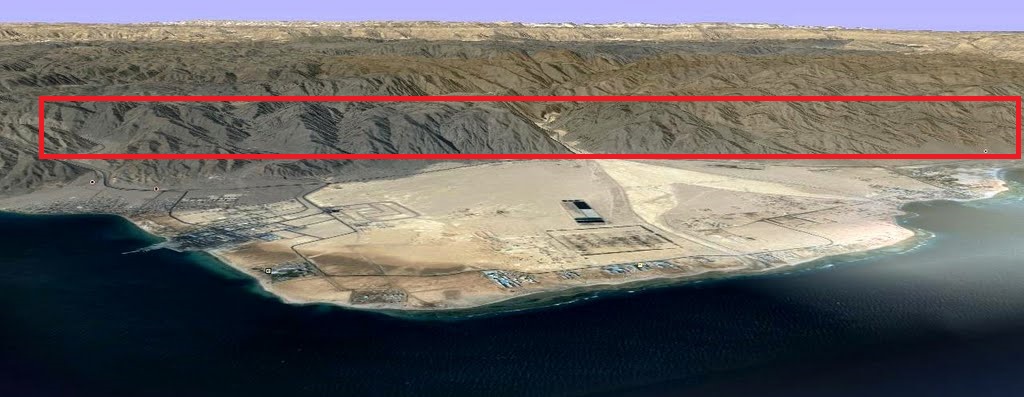
This area was properly named "Migdol", because of its "greatness", or "highness". It was, and is, considered "one great and high wall". For us as believers in the Messiah, this location is symbolized by our spiritual great mountains, or spiritual walls, that we cannot go through. There are times in our lives where we would be spiritually trapped between a spiritual ocean and spiritual mountains with a spiritual closed mouth, or spiritual closed door, with nowhere to go, or to escape, and our Heavenly Father wants us to look up to Him to cry out to Him to deliver us from our spiritual entrapment. Also, with all three spiritual places in this spiritual area, there is nowhere to spiritually turn, or go back, and the only thing we can do is to look up and cry out to our Heavenly Father through Yeshua, the Messiah, to save us and deliever us from these blockades, which the Israelites should have done at modern day Nuweiba Beach. As Yeshua noted in the Gospel of Luke
Luke 21:28 And when these things begin to come to pass, then look up, and lift up your heads; for your redemption draweth nigh.
In another spiritual sense, we could also say to those Migdol Mountains to be moved from our paths in our walk with Him, which Yeshua noted in the Gospel of Matthew
Matthew 17:20 And Yeshua said unto them, Because of your unbelief: for verily I say unto you, If ye have faith as a grain of mustard seed, ye shall say unto this mountain, Remove hence to yonder place; and it shall remove; and nothing shall be impossible unto you.
This would be our last resort. If it doesn't happen, then the last thing to do is to "look up".
We believers in the Messiah have the right to look up to Him for salvation and deliverance, because we have Yeshua (meaning "salvation") in our lives. This connects us with the Kingdom of Heaven, a.k.a. the "vertical" relationship, with Him, because it connects with our relationship with Him through the "vertical" first five words (commandments). Whereas, the world only looks at the world, a.k.a. the "horizontal" relationship, with mankind only (a.k.a. the "Babylonial Society"), and don't have a relationship with the Messiah to complete the vertical Kingdom connection to the vertical-horizontal relationship between the Heavens and the Earth. The world tries to make laws based on the last five words (commandments), but in vain, because they cannot have the last five words (commandments) without the first five words (commandments).
This is an image of all three locations in Egypt and Saudi Arabia
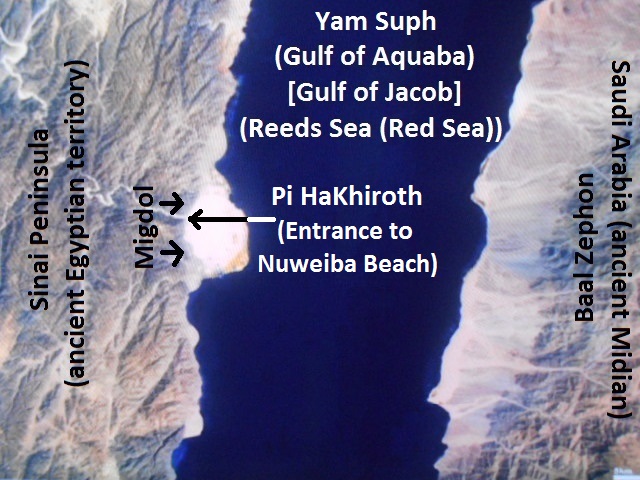
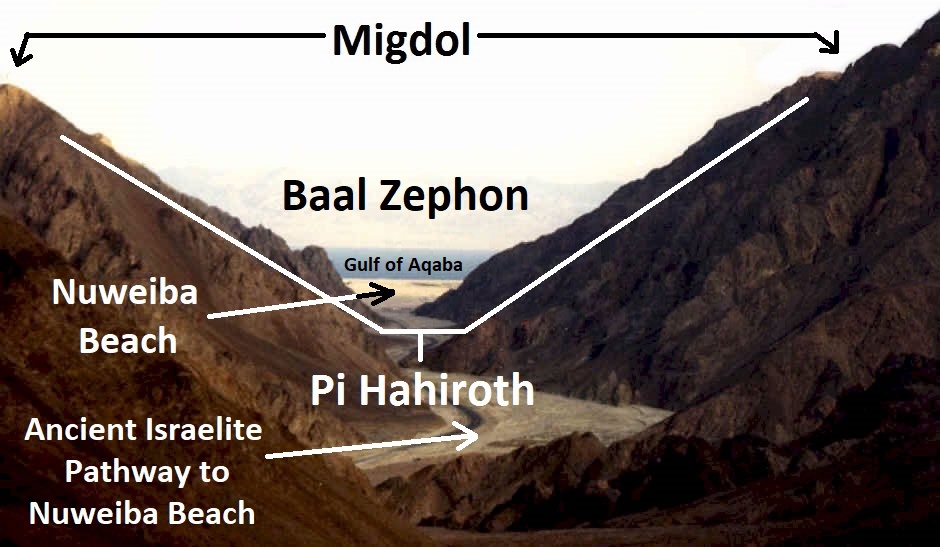
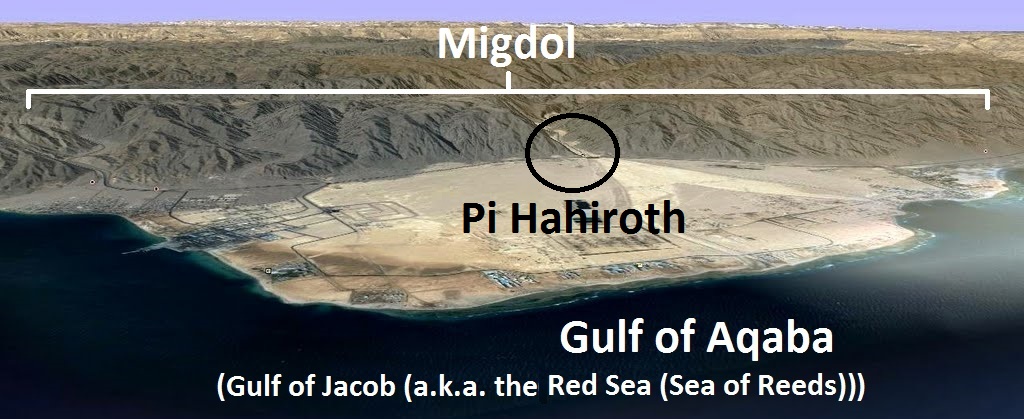
This image is an idea how the cloud have covered Pi Hahiroth between the Egyptian army and the Israelites
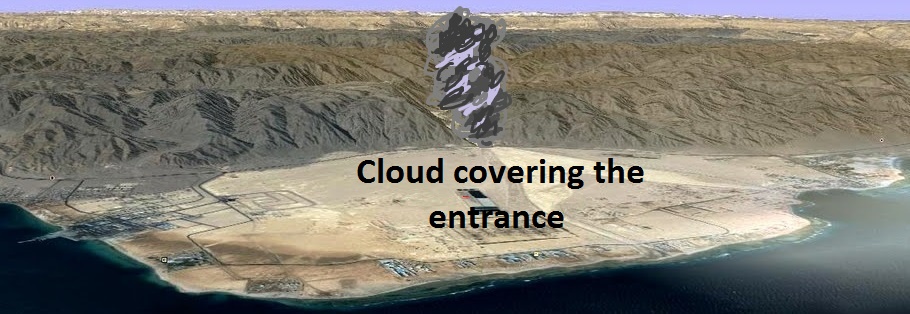
Ending this section, you can read my teaching "The Exodus Story" by clicking on the link below to get to the webpage
THE EXODUS STORY
Verse eight
7. WILDERNESS OF ETHAM
8 and they pulled up (journeyed) from P'ni Hahiroth (Pi Hahiroth, the face of Hahiroth), and went over in the midst of the sea to the wilderness, and they went a way of three days in the Wilderness of Etham, and they camped in Marah,
WILDERNESS OF ETHAM [in northeastern Saudi Arabia, in Midian] (In Hebrew "Meed-bahr Ey-thahm" (Mta rbdm) S864): Unkown, but most likely from S854- Nearness, as in the Wilderness of Nearness.
This was not a place, but a region in northeastern Saudi Arabia. This was also called the Wilderness of Shur. This was the Israelites' first stop in Midianite territory since they were delievered and saved from Pharaoh and his army, as noted in the Torah portion of B'shalakh, in the book of Exodus
Exodus 15:22 And Moses pulled up (journeyed) Israel from the Sea of Reeds, and they went out to the Wilderness of Shur; and they went three days in the wilderness, and they did not find water.
This was where the Israelites would be going through a period of journeying to be drawn near to hwhy. We as believers at times experience this same situation in our lives by "drawing near" to our Heavenly Father in this time in our walk with Him, whether by prayer, and/or giving thanks, and/or praising and/or worshipping Him, as well as talking to Him, and also by being still to listen to our Heavenly Father's Voice, and following His Word and His Rhema Words.
8. MARAH
MARAH [in northeastern Saudi Arabia, in Midian] (In Hebrew "Mah-rah" (hrm) S4785, S4751, S4843): Bitter
This is the area where the Israelites were getting bitter against Moses for not finding water, as noted in the Torah portion of B'shalakh, in the book of Exodus
Exodus 15:23 And they came to Marah, and they were not able to drink the waters from Marah, for they were bitters: Upon thus, her name was called Marah. 24 And the People, they murmured upon (over) Moses, to say, What shall we drink? 25 And cried to hwhy; and hwhy showed (pointed out, instructed, made see) him a tree, and was cast (thrown) to the waters, and the waters, they became sweet:...
The water is symbolized by the Ruakh HaKodesh (the Holy Spirit) where they were spiritually refreshed. Spiritually, our Heavenly Father allows us as believers in the Messiah to experience this by not being restored with the Ruakh HaKodesh (the Holy Spirit) in order to test us to see if we get bitter ourselves against Him. We can pray to Him to restore us with the Ruakh HaKodesh (the Holy Spirit), but it is up to Him, in His timing, where He will choose to restore it. I have been experiencing this myself recently as I am still today.
Verse nine
9. ELIM
9 and they pulled up (journeyed) from Marah, and came to Elim: and in Elim were two ten (twoteen, twelve) eyes of water, and seventy palm trees; and they camped there,
ELIM [in northeastern Saudi Arabia, in Midian] (In Hebrew "Ey-leem" (Myla) S362): Palm trees, from S352- strong, ram, oak or other strong trees
This was the location where the seventy date palm trees are located, as noted in the Torah portion of B'shalakh, in the book of Exodus
Exodus 15:27 And they came to Elim, and there were two ten (twoteen, twelve) eye-wells of water, and seventy palm trees: And they camped there upon (over, by) the waters.
This is a satelite image of Elim
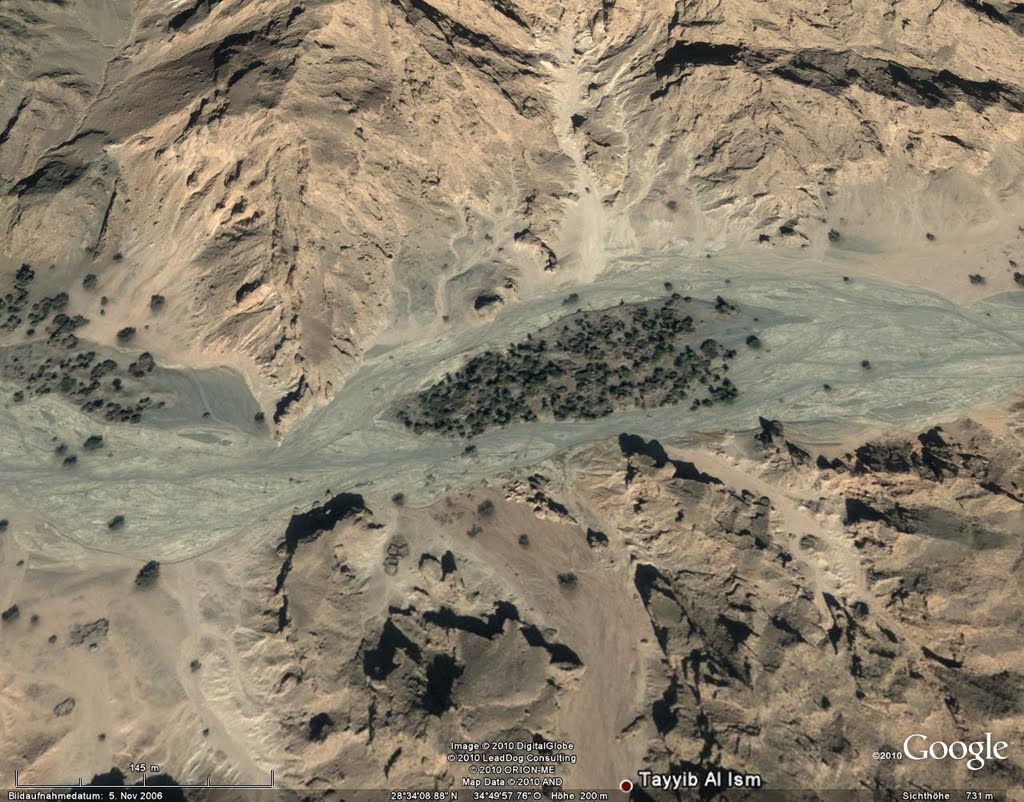
This is a picture of the palm trees in Elim
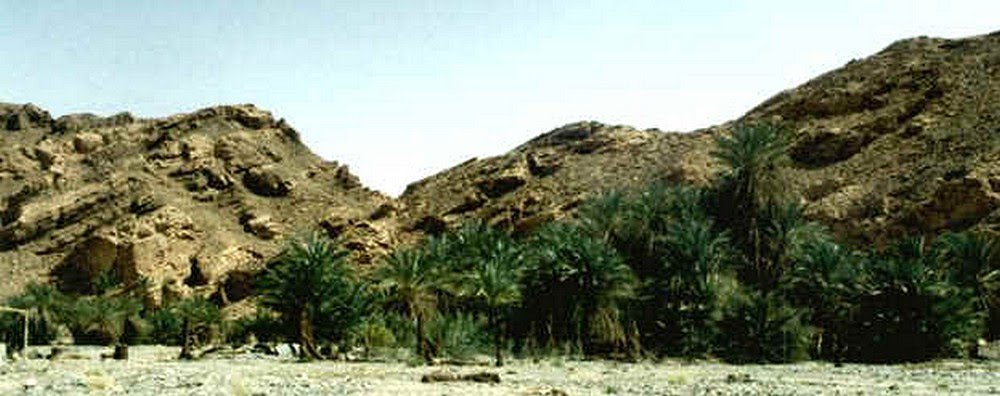
This was hwhy's way for the Israelites to be "strengthened" as well as getting their strength restored. We as believers in the Messiah also experience this when our Heavenly Father renews our strength via the Ruakh HaKodesh (the Holy Spirit). The Prophet Isaiah explains this well in his book
Isaiah 40:28 Hast thou not known? Hast thou not heard, that the everlasting Elohim, hwhy, the Creator of the ends of the earth, fainteth not, neither is weary? There is no searching of His Understanding. 29 He giveth Power to the faint; and to them that have no might He increaseth strength. 30 Even the youths shall faint and be weary, and the young men shall utterly fall: 31 But they that wait upon hwhy shall renew their strength; they shall mount up with wings as eagles; they shall run, and not be weary; and they shall walk, and not faint.
Verse ten
10. YAM SUPH
10 and they pulled up (journeyed) from Elim, and they camped upon the Reeds Sea [(Yam Suph, the Sea of Reeds)],
YAM SUPH [at the shore in northeastern Saudi Arabia, in Midian] (In Hebrew "Yahm Sooph" (Pwo My) S3220, S5448, S5489: Sea of Reeds, Sea of Papyrus
As I noted earlier, this is located between modern day Egypt and modern day northeastern Saudi Arabia, which is noted in the Torah portion of B'shalakh, in the book of Exodus
Exodus 13:17 And was, in Pharaoh sending away ta-the People, and Elohim did not lead them of the way of the land of the Philistim, for he was near; for Elohim said, Lest the People shall repent [(shall be sorry)] in their seeing battle (war) and they will return to Egypt: 18 And Elohim circumvented (turned) ta-the People the way of the wilderness of the Sea of Reeds: And the armed Sons of Israel ascended from the land of Egypt.
This sea is named, because of Egypt's use of the Papyrus plant to make "paper". This is an image of the Papyrus Plants

This is the the same location on the other side of the Gulf of Aqaba (the Gulf of Jacob (Red Sea (Sea of Reeds))), which was their fourth and final part of the Israelites location where they could not go any further.
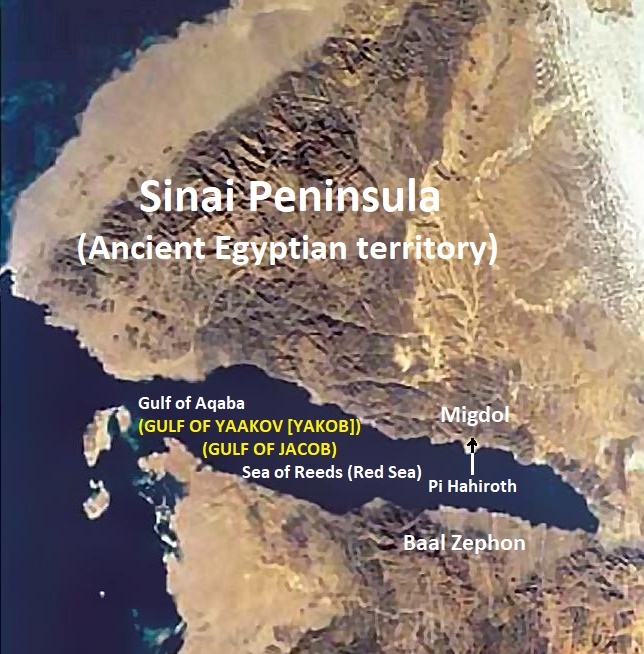
The Israelites were kind of "back tracking" in their journey by returning to the Sea of Reeds, but most likely not at the same location where they crossed through the sea. While they were on Egypt's side of the Sea, one way of symbolizing this was for hwhy to start symboically "write a new chapter" in their lives by looking up and crying out to Him to deliver them from the mighty Egyptian army, which hwhy did by parting the Yam Suph, or Sea of Papyrus, to create a dry sandy highway for them to cross over. This also shows us that after they were on the Saudi Arabian side, the Midianite side, of the Sea, hwhy was starting to write that new chapter for them in their lives. This is also applied in our lives as believers in the Messiah in our walk with the Heavenly Father writing that new chapter in our lives, when we accepted Yeshua the Messiah as our Lord and Savior. As the apostle Paul noted in his letter to the assembly in Corinth
2 Corinthains 5:17 Therefore if any man be in Messiah, he is a new creature: old things are passed away; behold, all things are become new.
Verse eleven
11. WILDERNESS OF SIN
11 and they pulled up (journeyed) from the Reeds Sea [(Yam Suph, the Sea of Reeds)], and they camped in the Wilderness of Sin,
WILDERNESS OF SIN [in northeastern Saudi Arabia, in Midian] (In Hebrew "Meed-bahr Seen" (Nyo rbdm) S5512): (From Hebrew-Greek Key Study Bible and Genesius' Hebrew Grammar) clay, mire (Sin is also a pagan moon god)
This is a region in northeastern Saudi Arabia.
This is part of the Israelites walk by walking through a symbolic "mire" in their lives, an act of spritual struggling in their walk. This is applied to us believers in our spiritual walk with our Heavenly Father by taking us through a spiritual mire of issues in our lives, whatever they may be, but He will provide a way to get us through this wilderness period.
Verse twelve
12. DOPHKAH
12 and they pulled up (journeyed) from the Wilderness of Sin, and they camped in Dophkah,
DOPHKAH [in northeastern Saudi Arabia, in Midian] (In Hebrew "Doph-kah" (hqpd) S1850): Knock, from S1849- by analogy to press severely, beat knock, drive
There is no information about this location.
This is the time for the Israelites to press forward as well as being pressed, like an olive press to press the olives to bring forth olive oil. This is applied to us as believers in our walk, when we are "pressed" so that the oil of the Ruakh HaKodesh (the Holy Spirit) will come forth. An indirectly related example of this pressing is when Yeshua spoke to the multitude, which is noted in the Gospel of Luke
Luke 6:38 Give, and it shall be given unto you; good measure, pressed down, and shaken together, and running over, shall men give into your bosom. For with the same measure that ye mete withal it shall be measured to you again.
Another way looking at this, is when we are pressed in the human spirit, like the apostle Paul did, which is noted in the book of Acts
Acts 18:5 And when Silas and Timotheus were come from Macedonia, Paul was pressed in the spirit, and testified to the Jews that Yeshua was the Messiah.
And the apostle Paul noted of his experience of being pressed by the people in Asia, which he noted in his letter to the assembly in Corinth
2 Corinthians 1:8 For we would not, brethren, have you ignorant of our trouble which came to us in Asia, that we were pressed out of measure, above strength, insomuch that we despaired even of life:
Verse thirteen
13. ALUSH
13 and they pulled up (journeyed) from Dophkah, and they camped in Alush,
ALUSH [in Saudi Arabia, in Midian] (In Hebrew "Ah-loosh" (swla) S442): Unknown. The best I can figure out that it could have came from the word Lush (swl), from S3888- To knead, as in kneading dough from a kneading trough
There is no information about his location.
If the meaning of this location is correct, the Israelites were symbolically put through the kneading trough to be "kneaded" into hwhy's Bread, which required them to be "grounded" in their lives. Our Heavenly Father does this same thing in our lives by spiritually kneading us, an act of spiritual grinding, to be "little living breads" in Yeshua, the Messiah.
!!!hwhy Kl dbk
Verse fourteen
14. REPHIDIM
14 and they pulled up (journeyed) from Alush, and they camped in Rephidim, and water was not there for the people to drink,
REPHIDIM [in northeastern Saudi Arabia, in Midian] (In Hebrew "R'phee-deem" (Mdypr) S7508): Ballusters, from S7507- railing (as spread along), from S7502- spread (like a bed), comfort
This place, in satelite view, shows the location of Rephidim in its narrow and spread out location
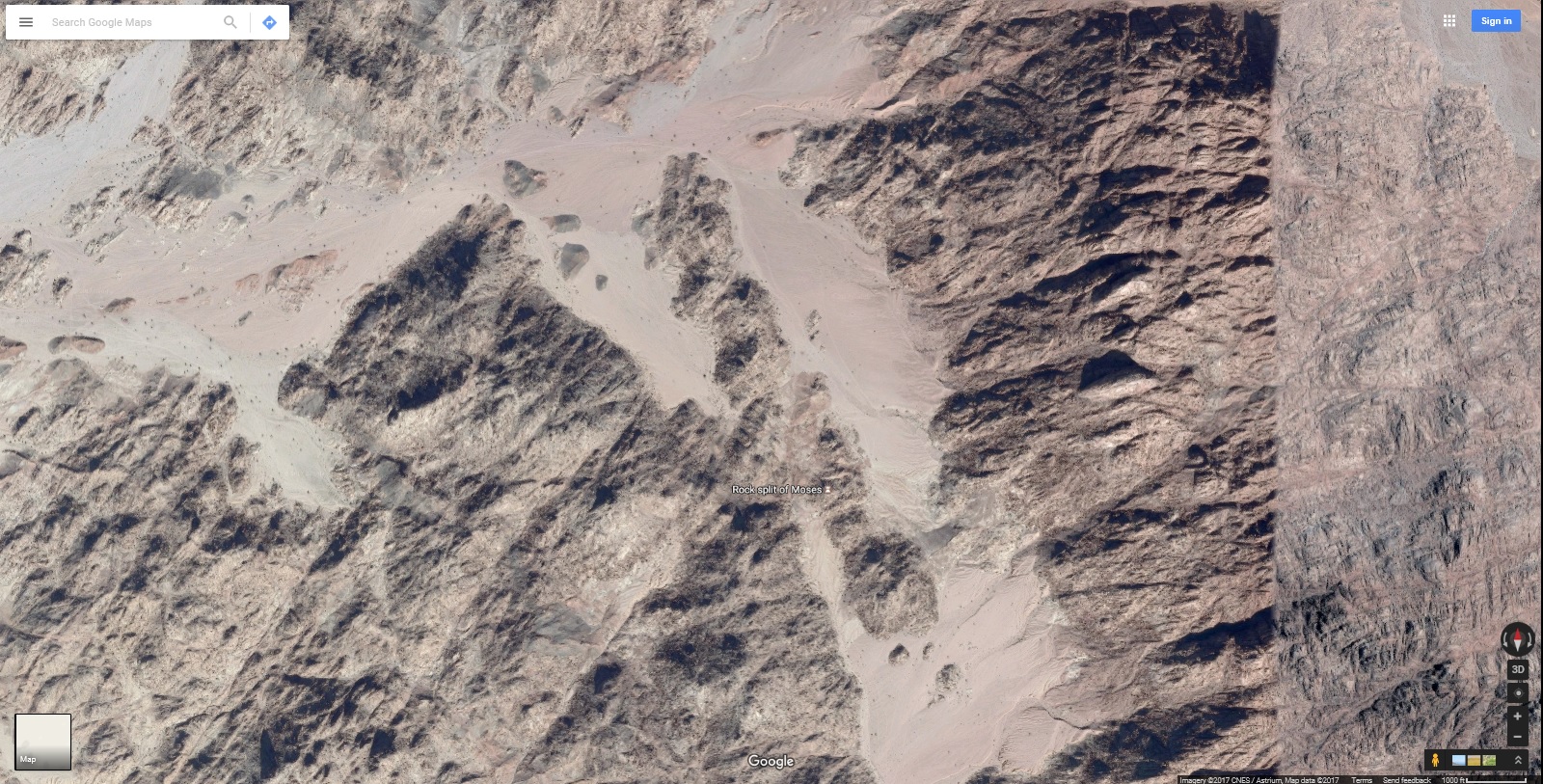
This is where the gigantic split rock pillar is located, and if you notice, it looks like a spread out pillar (to me, it almost looks like a catcher's mit)
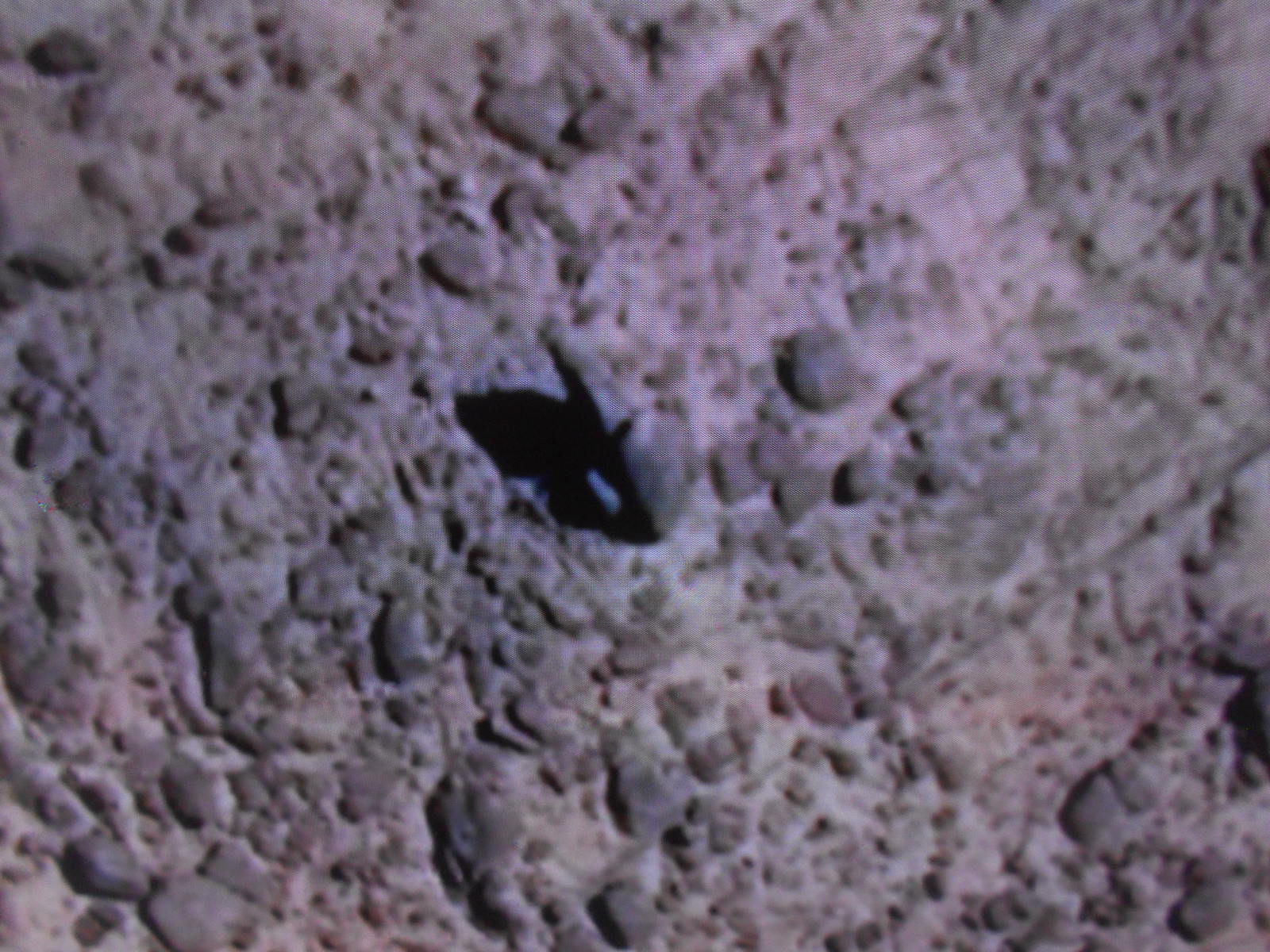
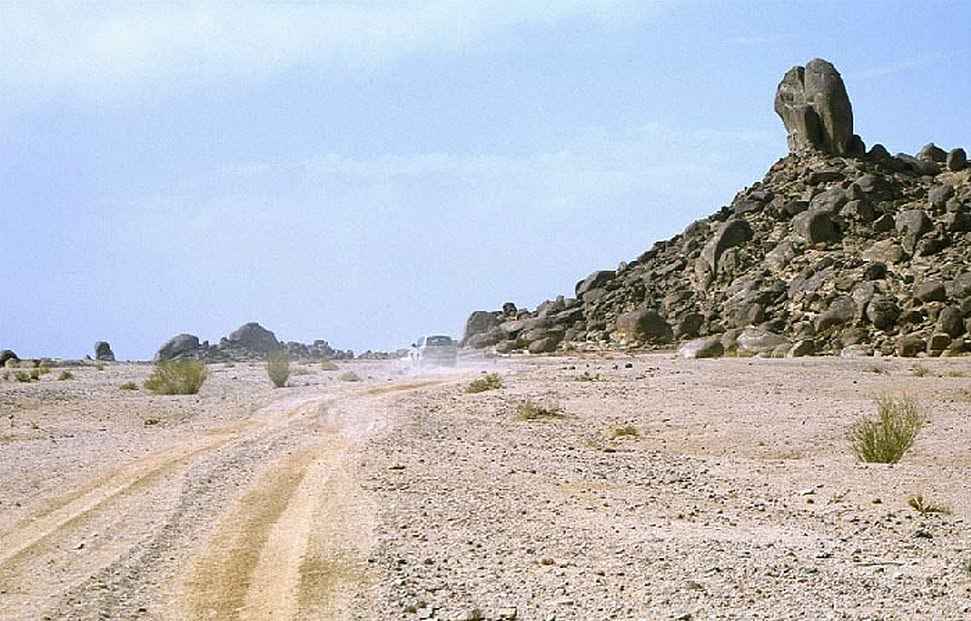
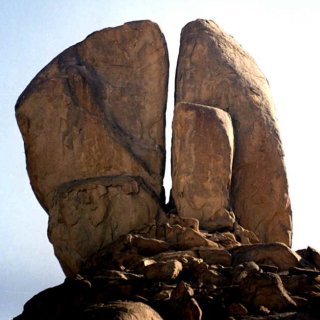
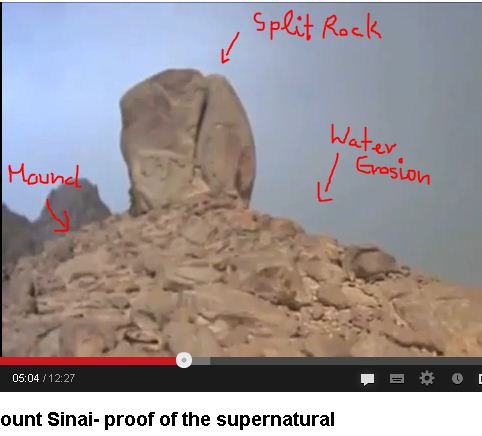
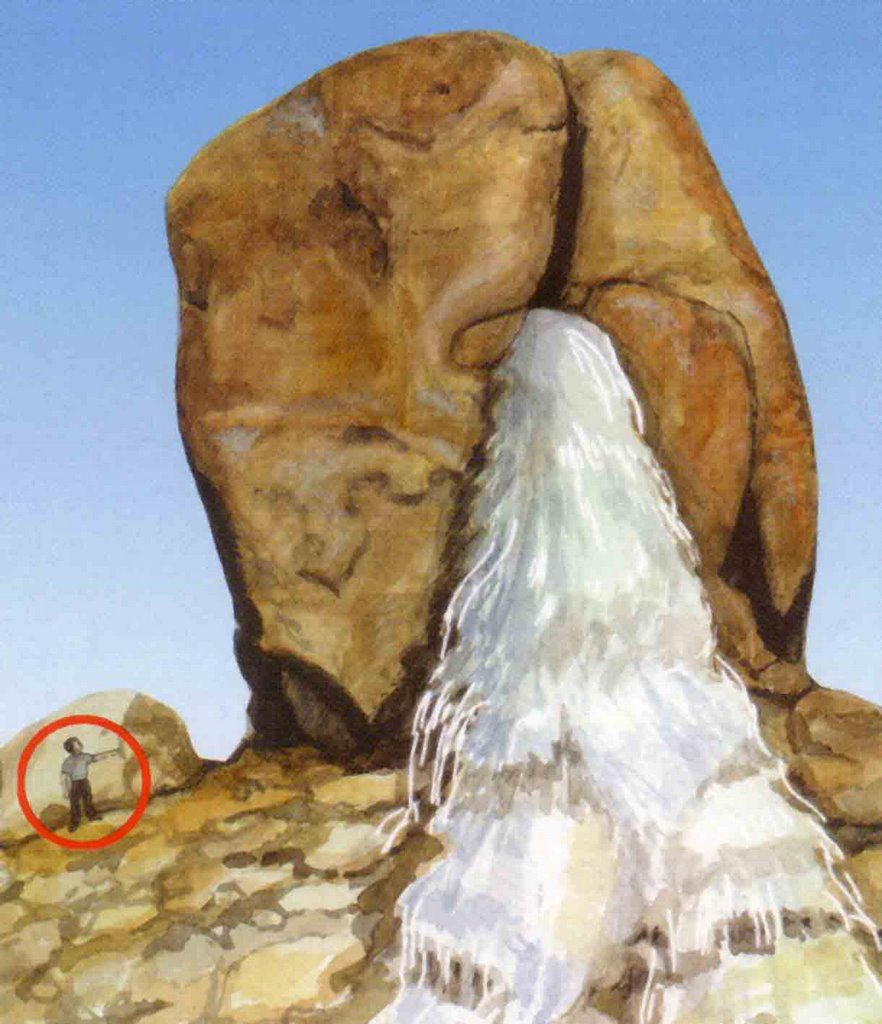
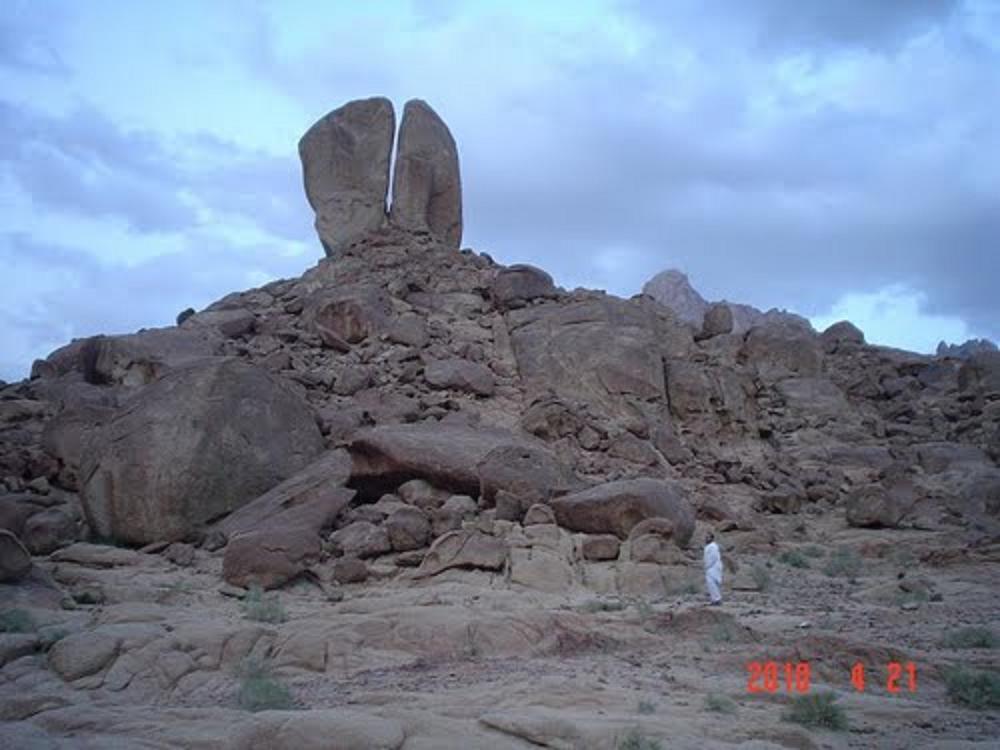
This is the location where the Israelites contended with Moses for water, and were given water from this rock. For the Israelites, it is where they were becoming thirsty, which is noted in the Torah portion of B'shalakh, in the book of Exodus
Exodus 17:1 And all of the Congregation of the Sons of Israel, they pulled up (journeyed) from the Wilderness of Sin, by their journeys upon the Mouth of hwhy, and they camped in Rephidim: and was no water for the People to drink. 2 And the People contended (strived) with Moses, and they said, Give water to us, and we may drink! And Moses said to them, Why (How) are you contending with me? Why (How) are you testing (tempting) ta-hwhy?! 3 And the People thirsted there for the water; and the People murmured upon (over) Moses, and said, To what is this that you have ascended us from Egypt to have me dead, and ta-my sons, and ta-my livestock on the thirst? 4 And Moses cried to hwhy, to say, What shall I do to this People? Yet a little and they will skullstone (stone) me. 5 And hwhy said to Moses, Go over to the face of the People, and take from the Elders of Israel with you; And your staff (rod, branch) which you struck ta-the river on him, take in your hand, and you go. 6 Behold, I will stand to your face there upon the cliff rock in Horeb; and you shall strike on the cliff rock, and water shall come out from him, and the People may drink. And Moses did so to the eyes of the Elders of Israel.
This location could be where the Israelite's patience was spead out thin by becoming impatient. We as believers are placed in a spiritual state to be spiritually spread out to test our patience, when we get spiritually thirsty, to see if we get spiritually spread out thin in our faith, while waiting for results and answer from our Father, as well as to get spiritually refreshed with the Ruakh HaKodesh (Holy Spirit). But His Timing is always perfect, and we need to be patient with Him to provide.
Verse fifteen
15. WILDERNESS OF SINAI
15 and they pulled up (journeyed) from Rephidim, and they camped in the Wilderness of Sinai,
WILDERNESS OF SINAI [in northeastern Saudi Arabia, also known as Jebel al Lawz, in Midian] (In Hebrew "Meed-bahr See-nai" (ynyo rbdm) S5514): Unkown, but after researching, it is from S5572- "s'neh" (hno), meaning prick, bramble bush
This is the location where Moses and hwhy met at Mount Sinai, which is located in the Wilderness of Sinai, in northeastern Saudi Arabia. It is known today as Jebel al Lawz.
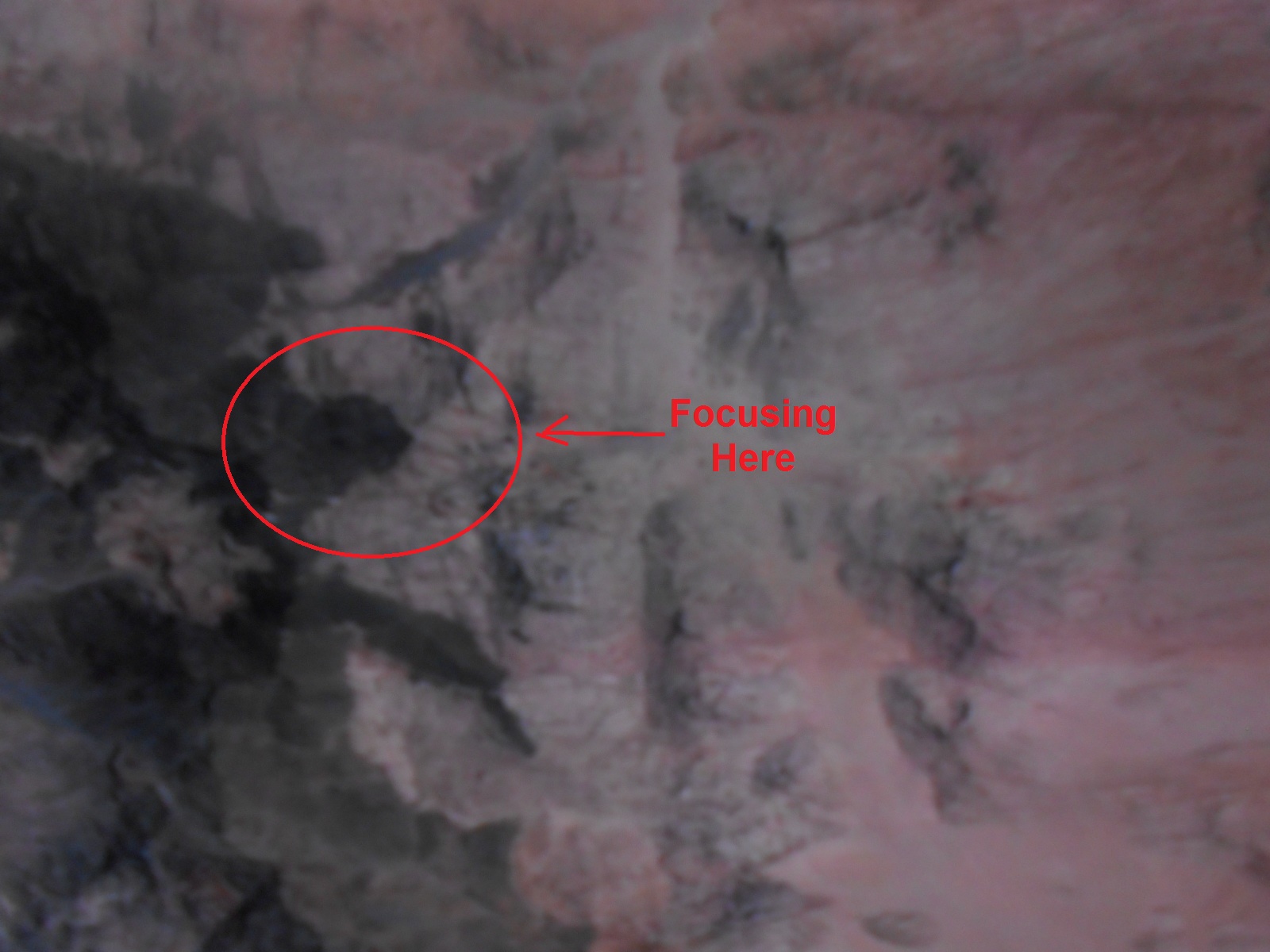
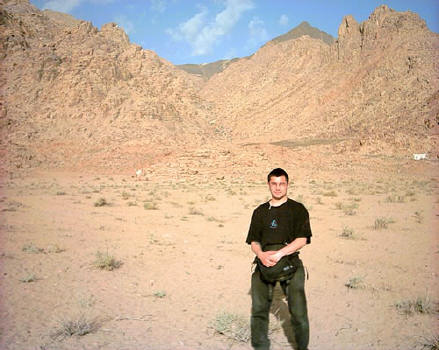
Calculating their stay at Mount Sinai, they stayed at this location for eleven months and five days, and this is where they received most of the Torah. This is the account of their arrival, which is noted in the Torah portion of Yithro, in the book of Exodus
Exodus 18:5 And Jethro, father-in-law of Moses, and his sons, and his wife, came to Moses to the wilderness where he camped there at the Mountain of The Elohim:
This is where the Israelites get "pricked" in receiving the Ten Words (Commandments) from hwhy. As believers, we get spiritually pricked when we are to receive the Word from our Heavenly Father, especially a Rhema Word, from our Heavenly Father. Yeshua is "the Word" made Flesh, which is noted in the Gospel of John
John 1:1 In the beginning was the Word, and the Word was with Elohim, and the Word was Elohim. 2 The same was in the beginning with Elohim. 3 All things were made by Him; and without Him was not any thing made that was made.... 14 And the Word was made Flesh, and dwelt among us, (and we beheld His Glory, the Glory as of the Only Begotten of the Father,) full of grace and truth.
We have been spiritually pricked to receive Yeshua as our Lord and Savior, and are continuously pricked to continuously receive His Word in our daily walk with Him.
!!!hwhy Kl dbk
You can see a little more information of the Ten Words (Commandments) in the Torah portion of Yithro by clicking on the link below to get to the webpage.
YITHRO
Verse sixteen
16. KIBROTH HATTAAVAH
16 and they pulled up (journeyed) from the Wilderness of Sinai, and they camped in Kibroth-Hattaavah,
KIBROTH HATTAAVAH [in northeastern Saudi Arabia, in Midian] (In Hebrew "Kee-vroth Hah-Tah-ah-vah" (hwath trbq) S6914, from S6913 and S8378: Graves of the lust (longing), from S8378- lust, longing, delight, satisfaction, charm
This is the location where the Israelites complained of the various kinds of foods they had in Egypt and were eating only manna, forgetting that they were in severe slavery in Egypt. They asked, or "lusted", for flesh. They got what they wanted, which hwhy gave them quail, and were slain for it, and were buried there. This is the account of their arrival which is noted in the Torah portion of B'ha-alothkhah, in the book of Exodus
Numbers 11:4 And the collected (gathered) multitude which were in their nearness, they lusted a lust: and the Sons of Israel, they turned (returned), and they wept also, and they said, Who shall have us eat flesh? 5 We remember ta-the fish which we ate in Egypt freely (at nothing); ta the cucumbers, and ta the melons, and ta-the leeks, and ta-the onions, and ta-the garlic: 6 And now, our soul is dried up: is not anything, failing to the Man (Manna) at our eyes.
This is the symbolic meaning of the quail:
Quail: Flesh/Flesh of the World/Flesh of Sin/Death
We as believers need to be careful ourselves by not lusting after things, especially spiritual things, for we could get ourselves into trouble. This is what the apostle James noted in his epistle
James 1:12 Blessed is the man that endureth temptation: for when he is tried, he shall receive the Crown of Life, which the Lord hath promised to them that love Him. 13 Let no man say when he is tempted, I am tempted of hwhy: for hwhy cannot be tempted with evil, neither tempteth he any man: 14 But every man is tempted, when he is drawn away of his own lust, and enticed. 15 Then when lust hath conceived, it bringeth forth sin: and sin, when it is finished, bringeth forth death. 16 Do not err, my beloved brethren.
The aposlte John noted this in his epistle
1 John 2:15 Love not the world, neither the things that are in the world. If any man love the world, the Love of the Father is not in him. 16 For all that is in the world, the lust of the flesh, and the lust of the eyes, and the pride of life, is not of the Father, but is of the world. 17 And the world passeth away, and the lust thereof: but he that doeth the Will of hwhy abideth for ever.
We are to be contempt, which the apostle Paul noted in his letters to the assembly in Phillipia, to Timothy, and in the book of the Hebrews
Phillipians 4:11 Not that I speak in respect of want: for I have learned, in whatsoever state I am, therewith to be content.
1 Timothy 6:8 And having food and raiment let us be therewith content.
Hebrew 13:5 Let your conversation be without covetousness; and be content with such things as ye have: for he hath said, I will never leave thee, nor forsake thee.
In other words, be content in Yeshua, the Messiah.
Verse seventeen
17. HAZEROTH
17 and they pulled up (journeyed) from Kibroth-Hattaavah, and they camped in the Hazeroth,
HAZEROTH [Unknown, most likely in Saudi Arabia] (In Hebrew "Khah-tsey-roth" (trux) S2698): Yards (as in enclosed), hamlet (as in surrounded with walls), from S2691- yard, court, village, from S2690- trumpet, blow (on an instrument)
This was the location where Miriam, Moses' elder sister was plagued for seven days, because she attacked Moses, which is noted in the Torah portion of B'ha-alothkhah, in the book of Numbers
Numbers 12:10 And the Cloud turned away from upon the Tent; and, behold, Miriam was with leprousy as the snow: and Aaron faced to Miriam, and behold, was leprous. 11 And Aaron said unto Moses, On me, my adon (lord, master), not now do you not put (lay, set) sin upon us, which we have done slackly (dotely, foolishly), and of which we have sinned. 12 Not now she shall be as the dead which in his coming out from the womb of his mother, and half of his flesh is consumed (devoured). 13 And Moses cried to hwhy, to say, El now! Have healing to her now! 14 And hwhy said to Moses, And her father, spitting, shall spit on her face, that she be not reproached (taunted, insulted) seven days? She shall be shut out seven days from outside by the Camp, and afterwards, she shall be gathered. 15 And Miriam, she was shut out from outside by the Camp seven days: and the People did not pull up (journey) until the gathering (adding) of Miriam. 16 And afterwards, the People, they pulled up (journeyed) from Hazeroth, and encamped in the Wilderness of Paran.
Regarding this journey stop, it is a place where they were considered as a hamlet, or as a place where they were isolated. In relation to us as believers in the Messiah, we are at times put in isolation, feel alone and feel that no one is there to help us. The prophet Elijah felt this simialar way when he faced the prophets of Baal regarding who's elohim is the Elohim, which is noted in the book of the Kings
1 Kings 18:21 And Elijah came unto all of the People, and said, How long halt ye between two opinions? If hwhy be the Elohim, follow Him: but if Baal, then follow him. And the People answered him not a word. 22 Then said Elijah unto the People, I, even I only, remain a prophet of hwhy; but Baal's prophets are four hundred and fifty men.
Later, Isaiah isolated himself, escaping from the death threat by Queen Jezebel, and went into hiding at a cave on Mount Sinai, which is noted in the book of the Kings
1 Kings 19:8 And he arose, and did eat and drink, and went in the strength of that meat forty days and forty nights unto Horeb, the Mount of the Elohim [Mount Sinai]. 9 And he came thither unto a cave, and lodged there; and, behold, the Word of hwhy came to him, and he said unto him, What doest thou here, Elijah?
This is an image of Mount Sinai showing the location of Elijah's Cave
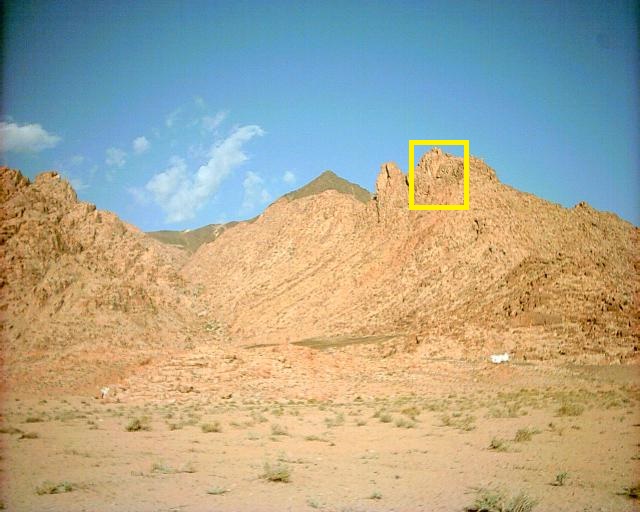
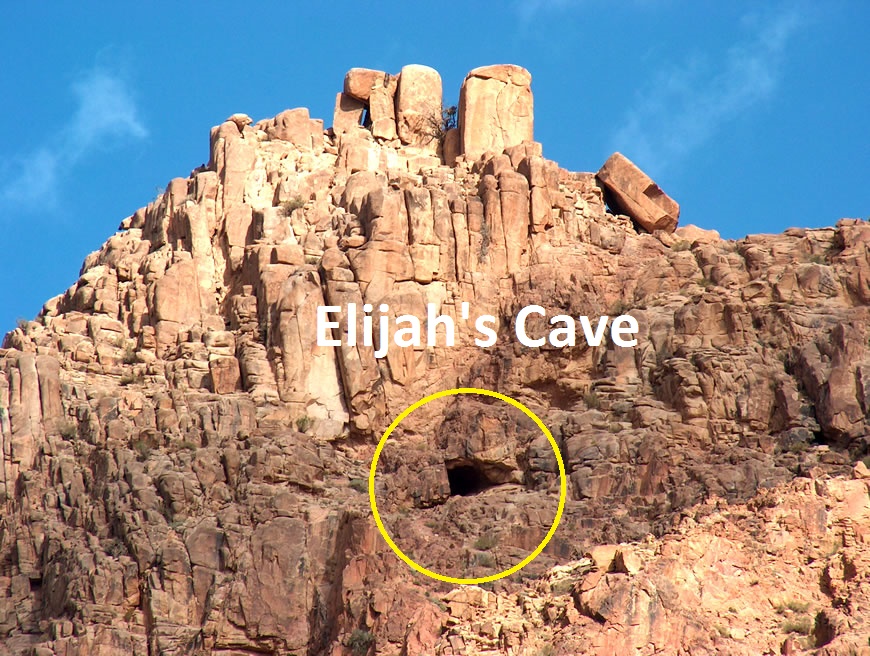
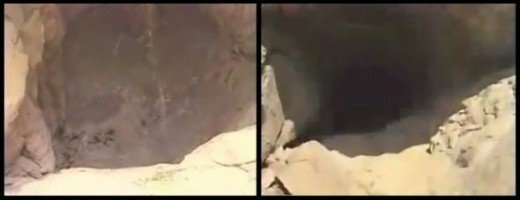
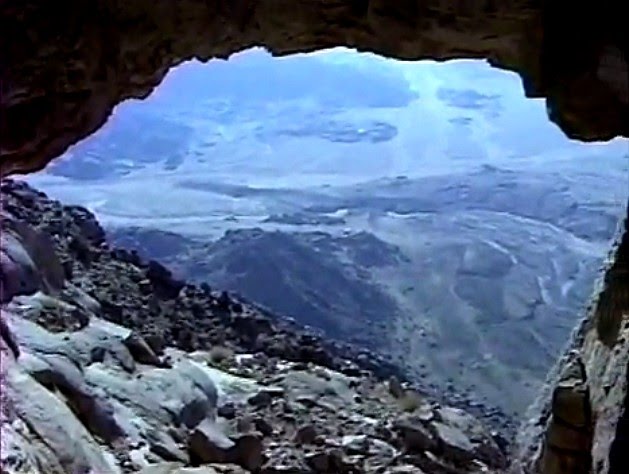
That's how we as believers feel at times too. We have to hide and be like hamlets in our own cave locations, sometimes we are isolated from others based on personal tragic situations, like losing a loved one. We also experince this when we teach others, or preach the Gospel of truth, to others, then we get spiritually spent, or get attacked spiritually, mentally, emotionally, psychologically, and physically, etc., and have to hide to get restored. Our Heavenly Father knows that we need this time at this spiritual location in these kinds of situations in our lives, and He is there to be with us until it is time for us to get up and move on in our walk of life in Him. This is what Yeshua noted in the Gospel of Matthew
Matthew 28:20 Teaching them to observe all things whatsoever I have commanded you: and, lo, I am with you alway, even unto the end of the world. Amen.
Verse eighteen
18. RITHMAH
18 and they pulled up (journeyed) from Hazeroth, and they camped in Rithmah,
RITHMAH [Unknown, most likely in Saudi Arabia] (In Hebrew "Reeth-mah" (hmtr) S7575): from S7574- a Spanish broom, Juniper tree, from S7573- a pole, to bind, to yoke up (to the pole of a vehicle)
This location was probably named for their Juniper trees.
This is probably a location where the Israelites were to be "yoked" to hwhy. This also applies to us as believers to be yoked to our Heavenly Father through Yeshua, via the Ruakh HaKodesh (the Holy Spirit). Yeshua said for us to take on His yoke, which is noted in the Gospel of Matthew
Matthew11:29 Take My Yoke upon you, and learn of Me; for I am meek and lowly in heart: and ye shall find rest unto your souls. 30 For My yoke is easy, and My burden is light.
The apostle Paul noted to not to be yoked with unbelievers, which he noted in his letter to the assembly in Corinth
2 Corinthians 6:14 Be ye not unequally yoked together with unbelievers: for what fellowship hath righteousness with unrighteousness? And what communion hath light with darkness? 15 And what concord hath Messiah with Belial? Or what part hath he that believeth with an infidel? 16 And what agreement hath the Temple of hwhy with idols? For ye are the Temple of the Living Elohim; as hwhy hath said, I will dwell in them, and walk in them; and I will be their Elohim, and they shall be My People. 17 Wherefore come out from among them, and be ye separate, saith hwhy, and touch not the unclean thing; and I will receive you, 18 And will be a Father unto you, and ye shall be My sons and daughters, saith hwhy Almighty.
Verse nineteen
19. RIMMON PAREZ
19 and they pulled up (journeyed) from Rithmah, and they camped at Rimmon-Parez,
RIMMON PAREZ [Unkown, most likely in Saudi Arabia] (In Hebrew "Ree-mohn Pah-rehts" (urp Nmr) S7428): Pomegranate of the Breach (Or a risen breach); Rimmon: S7416- pomegranate, from S7426- to rise; Parez: S6556- to break, from S6555- to break out, breach, disperse, scatter
This was probably a place that had Pomegranite trees.
It looks like that the Israelites experienced those who rose up to be "breaches" against Moses and the People within their camps again, in their walk with hwhy, to disobey Him and His Word. Bill Cloud of Shoreshim Ministries noted that the enemy doesn't attack from the outside, but within the assembly. This could be also those in our assemblies and congregations, or friends or brethren who will rise up and try to breach our relationship with our Heavenly Father. Be alert and watchful. Also test their spirits, which the apostle John noted in his epistle
1 John 4:1 Beloved, believe not every spirit, but try the spirits whether they are of hwhy: because many false prophets are gone out into the world. 2 Hereby know ye the Spirit of hwhy: Every spirit that confesseth that Yeshua the Messiah is come in the Flesh is of hwhy: 3 And every spirit that confesseth not that Yeshua the Messiah is come in the Flesh is not of hwhy: and this is that spirit of Anti-Messiah, whereof ye have heard that it should come; and even now already is it in the world. 4 Ye are of hwhy, little children, and have overcome them: because greater is He that is in you, than he that is in the world.
Verse twenty
20. LIBNAH
20 and they pulled up (journeyed) from Rimmon-Parez, and they camped in Libnah,
LIBNAH [Unkown, most likely in Saudi Arabia] (In Hebrew "Leev-nah" (hnbl) S3841): From S3839- whitish tree, perhaps the storax, from S3835- white, from S3843- a brick (build)
This was probably a location where there were white Storax trees.
This was a place where the Israelites were to be built up in their walk with hwhy and His Word after the breaching at the previous location. This also applies to us as believes in the Messiah if something happened to us in being tempted in order to provoke us to breach. Then our Heavenly Father will take us to a period to be built up in our faith in Him.
Notice that these past three locations all had to do with trees: the Juniper tree, the Pomegranite tree and the Storax tree, and they were symbolically an act to yoke, an act to be breached and an act to build)
Verse twenty-one
21. RISSAH
21 and they pulled up (journeyed) from Libnah, and they camped in Rissah,
RISSAH [Unkown, most likely in Saudi Arabia] (In Hebrew "Rees-sah" (hor) S7446): Ruin, from S7450- to comminute, to moisten, from S7447- dripping into pieces, a ruin, dew-drop
This had to be a place where it was well known to have a lot of dew, most likely in the morning.
This is symbolized by hwhy's Mercies that are new in the morning, which the prophet Jeremiah noted in the book of Lamentations
Lamentation 3:22 It is of hwhy's Mercies that we are not consumed, because His Compassions fail not. 23 They are new every morning: great is Thy Faithfulness.
King Solomon symbolized the Bridegroom, whom later was revealed as Yeshua, coming to His love, the believers, with dew of the morning, which King Solomon noted in the book of the Song of Solomon
Song of Solomon 5:2 I sleep, but my heart waketh: it is the voice of my beloved that knocketh, saying, Open to me, my sister, my love, my dove, my undefiled: for my head is filled with dew, and my locks with the drops of the night.
The dew could also be symbolized by the Ruakh HaKodesh (the Holy Spirit). We as believers always have to ask our Heavenly Father to be renewed with the Ruakh HaKodesh (the Holy Spirit) in our minds, which the apostle Paul noted in his letter to the assembly in Ephesus
Ephesians 4:23 And be renewed in the spirit of your mind;
The apostle Paul noted to Titus to be renewed of His Spirit, which he noted in his letter to Titus
Titus 3:3 For we ourselves also were sometimes foolish, disobedient, deceived, serving divers lusts and pleasures, living in malice and envy, hateful, and hating one another. 4 But after that the kindness and love of hwhy our Saviour toward man appeared, 5 Not by works of righteousness which we have done, but according to His mercy he saved us, by the washing of regeneration, and renewing of the Holy Spirit;
Verse twenty two
22. KEKELATH
22 and they pulled up (journeyed) from Rissah, and they camped in Kehelathah (Meeting Area),
KEKELATH [Unkown, most likely in Saudi Arabia] (In Hebrew "K'hey-lah-thah" (htlhq) S6954): Convocation, congregation, from S6950- to congregate, convoke, assemble
This was probably a place with a lot of assemblies located within the area.
It was a period of time where the Israelites did much gathering. There are times where we as believers need to be assembling with other believers, whether online, or at a congregation, to be built up and be encouraged.
Verse twenty three
23. MOUNT SHAPHER
23 and they pulled up (journeyed) from Kehelathah (Meeting Area), and they camped in Mount Shapher,
MOUNT SHAPHER [Unkown, most likely in Saudi Arabia] (In Hebrew " Hahr Shah-phehr" (rps rh) S2022; S8234): A goodly mountain: Shapher: From S8233- beauty, from S8231- glisten, fair, goodly
This mountain location must have been a beautiful place they have resided.
Shapher has the similar Hebrew word as the shophar (rpws), a ram's horn, and they come from the same Hebrew root word. It was a time for the Israelites to bring out their beauty as a result in following hwhy and His Word. This also applies to us as believers by following our Heavenly Father and obeying His Heavenly Word, and to bring out His Beautiness through us, as well as our Heavenly Father revealing our spiritual beautiness through Him, in Yeshua.
Indirectly related, another issue relates having a shofar blown on the Mountain in Jerusalem. The times that it has been done is during the Biblical Festive High Holy Days of hwhy, and the new moons, which King David noted in the book of Psalms
Psalms 81:3 Blow the shofar in the new moon, in the full moon, for the day of our Feast. 4 For He is a Statute for Israel, and an Ordinance for the Elohim of Jacob.
But on the negative end, the shofar could be used on the Mountain of Jerusalem for to warn Jerusalem, and the Israelites, that danger is coming, which is noted in the book of the prophet Joel
Joel 2:1 Blow ye the shofar in Zion, and sound an alarm in My Holy Mountain: let all the inhabitants of the land tremble: for the Day of hwhy cometh, for it is nigh at hand; 2 A day of darkness and of gloominess, a day of clouds and of thick darkness, as the morning spread upon the mountains: a great people and a strong; there hath not been ever the like, neither shall be any more after it, even to the years of many generations. 3 A fire devoureth before them; and behind them a flame burneth: the land is as the garden of Eden before them, and behind them a desolate wilderness; yea, and nothing shall escape them. 4 The appearance of them is as the appearance of horses; and as horsemen, so shall they run. 5 Like the noise of chariots on the tops of mountains shall they leap, like the noise of a flame of fire that devoureth the stubble, as a strong people set in battle array. 6 Before their face the people shall be much pained: all faces shall gather blackness. 7 They shall run like mighty men; they shall climb the wall like men of war; and they shall march every one on his ways, and they shall not break their ranks: 8 Neither shall one thrust another; they shall walk every one in his path: and when they fall upon the sword, they shall not be wounded. 9 They shall run to and fro in the city; they shall run upon the wall, they shall climb up upon the houses; they shall enter in at the windows like a thief. 10 The earth shall quake before them; the heavens shall tremble: the sun and the moon shall be dark, and the stars shall withdraw their shining: 11 And hwhy shall utter His Voice before His Army: for His Camp is very great: for He is strong that executeth His Word: for the day of hwhy is great and very terrible; and who can abide it? 12 Therefore also now, saith hwhy, turn ye even to Me with all your heart, and with fasting, and with weeping, and with mourning: 13 And rend your heart, and not your garments, and turn unto hwhy, your Elohim: for He is gracious and merciful, slow to anger, and of great kindness, and repenteth him of the evil. 14 Who knoweth if he will return and repent, and leave a blessing behind him; even a Food (Grain) offering and a Drink Offering unto hwhy, your Elohim?
We as believers in the Messiah are watchmen and watchwomen on the walls on the Mountain of Jerusalem, which the Prophet Isaiah noted in his book
Isaiah 62:6 I have set watchmen upon thy walls, O Jerusalem, which shall never hold their peace day nor night: ye that make mention of ta-hwhy, keep not silence,
When we see trouble, or warning signs, we are to blow our own shofars on the mountains, whether venue we are called by our Heavenly Father to use, otherwise their souls will be required of us, which the Prophet Ezekiel noted in his book
Ezekiel 3:17 Son of man, I have made thee a watchman unto the House of Israel: therefore hear the Word at My Mouth, and give them warning from Me. 18 When I say unto the wicked, Thou shalt surely die; and thou givest him not warning, nor speakest to warn the wicked from his wicked way, to save his life; the same wicked man shall die in his iniquity; but his blood will I require at thine hand. 19 Yet if thou warn the wicked, and he turn not from his wickedness, nor from his wicked way, he shall die in his iniquity; but thou hast delivered ta-thy soul. 20 Again, When a righteous man doth turn from his righteousness, and commit iniquity, and I lay a stumblingblock before him, he shall die: because thou hast not given him warning, he shall die in his sin, and his righteousness which he hath done shall not be remembered; but his blood will I require at thine hand. 21 Nevertheless if thou warn the righteous man, that the righteous sin not, and he doth not sin, he shall surely live, because he is warned; also thou hast delivered ta-thy soul.
The prophet Isaiah noted those who resided in Zion, which is the Kingdom's nickname of Jerusalem, which is noted in his book
Isaiah 61:3 To appoint unto them that mourn in Zion, to give unto them beauty for ashes, the oil of joy for mourning, the garment of praise for the spirit of heaviness; that they might be called trees of righteousness, the Planting of hwhy, that He might be glorified.
We as believers also need to be like a Jerusalem in the Messiah, as well as being the Temple of the Ruakh HaKodesh (the Holy Spirit).
Mount Zion is also called the City of David, and King David made note of its beauty, which is noted in the book of Psalms
Psalms 48:1 A Song and Psalm for the sons of Korah. Great is hwhy, and greatly to be praised in the city of our Elohim, in the mountain of His holiness. 2 Beautiful for situation, the joy of the whole earth, is Mount Zion, on the sides of the north, the city of the Great King.
We are also to look to the City of David, in Jerusalem, a.k.a. Mount Zion, of its beauty as well, because it is symbolically our Heavenly Father's beauty, and we are cherish its beauty in our hearts. This is what king David noted in the book of the Psalms
Psalm 137:5 If I forget thee, O Jerusalem, let my right hand forget her cunning. 6 If I do not remember thee, let my tongue cleave to the roof of my mouth; if I prefer not Jerusalem above my chief joy.
Verse twenty four
24. HARADAH
24 and they pulled up (journeyed) from Mount Shapher, and they camped in Haradah,
HARADAH [Unkown, most likely in Saudi Arabia] (In Hebrew "Hah-rah-dah" (hdrh) S2732): From S2731 fear, anxiety, from S2730- fearful, reverential, from S2729- to shudder with terror, to fear, to hasten (with anxiety). This is where we get our English word "horrid"
Going from beauty to dreadfulness, and from joy to fear, this must have been one dreadful place for the Israelites.
The Israelites were taken to an area where they were most likely experience things that could be dreadful and fearful. We as believers will experience this time in our spiritual lives as well, but we have the Heavenly Father to depend on, and He is with us, which the prophet Isaiah noted in his book
Isaiah 41:10 Fear thou not; for I am with thee: be not dismayed; for I am Thy Elohim: I will strengthen thee; yea, I will help thee; yea, I will uphold thee with the Right Hand of My Righteousness.
This is a similar matter when the Israelites were to go over the Jordan to take possession of the land after the twelve spies returned, but they believed the evil report and feared, which Moses noted in the Torah portion of D'varim, in the book of Deuteronomy
Deuteronomy 1:29 And I said to you, Do you not dread, and do you not be afraid from them. 30 hwhy, your Elohim, that is going to your faces, He shall war for you, according to (as) all that was done at you in Egypt to your eyes;
The apostle Paul noted to Titus to not fear, because he was not given a spirit of fear, which is noted in his letter to Titus
2 Timothy 1:7 For hwhy hath not given us the spirit of fear; but of power, and of love, and of a sound mind.
And also indirectly related to fear to work out one's salvation with fear and trembling, which the apostle Paul noted in his letter to the assembly in Phillipia
Phillipians2:12 Wherefore, my beloved, as ye have always obeyed, not as in my presence only, but now much more in my absence, work out your own salvation with fear and trembling.
Verse twenty five
25. MAKHELOTH
25 and they pulled up (journeyed) from Haradah, and they camped in Makheloth,
MAKHELOTH [Unkown, most likely in Saudi Arabia] (In Hebrew "Mahk-hey-loth" (tlhq) S4722): Assemblies, from S4721- an assembly, from S6950- to congregate, convoke, assemble
This must have been another place where there were a lot of assembling.
It makes sense that after going though a period of dread and fear, they needed to be encouraged and strenghtened again by congregating and assembling. This also applies to us as believers in the Messiah for us to go to our assemblies and congregations to be restored, whatever venue of congregations one uses.
Verse twenty six
26. TAHATH
26 and they pulled up (journeyed) from Makheloth, and they camped in Tahath,
TAHATH [Unkown, most likely in Saudi Arabia] (In Hebrew "Thah-khath" (txt) S8480): From S8478- the bottom (as depressed), below, from S8430- humble
This place must have looked depressing.
This must have been a time the Israelites experienced depression, as well as humbleness to hwhy. If the Israelites don't humble themselves, they will get depressed. We as believers will experience depression at times in our lives, but we also need the time to humble ourselves to our Heavenly Father. And weird as it sounds, if we don't, we will be brought to a spiritual depression. Yeshua noted that we are to be humbled as little children, which is noted in the Gospel of Matthew
Matthew 18:4 Whosoever therefore shall humble himself as this little child, the same is greatest in the Kingdom of Heaven.
If we humble ourselves, Yeshua will lift us up, which is noted in the Gospel of Matthew
Matthew 23:12 And whosoever shall exalt himself shall be abased; and he that shall humble himself shall be exalted.
If we as believers don't humble ourselves, He will humble us to depression. Let's be humble before Him continually.
Verse twenty seven
27. TARAH
27 and they pulled up (journeyed) from Tahath, and they camped in Tarah,
TARAH [Unkown, most likely in Saudi Arabia] (In Hebrew "Thahr-akh" (xrt) S8646): Unknown. It's probably from S2960 "tohr-akh" (xrj), from S2959 "tarakh" (xrj)- burdensome, trouble, weary
This probably was a place known to have troubles.
If this is the right definition, the Israelites were brought here, because they were weary and burdened. They could have also experienced some troubling times as well. We as believers in the Messiah will experience these issues in our lives. This could have been another location for them to be restored.
Verse twenty eight
28. MITHCAH
28 and they pulled up (journeyed) from Tarah, and they camped in Mithcah,
MITHCAH [Unkown] (In Hebrew "Meeth-kah" (hqtm) S4989, S4987): Sweetness, from S4985- to suck, to relish, to be sweet
This was probably a place that looked sweet.
It is possible that the Israelites were there to suck the sweetness of the Word of hwhy. We as believers in the Messiah are also to suck the sweetness of His Word, as well as His Rhemas, when He speaks to us. As King David noted in the book of Psalms
Psalm 119:103 How sweet are Thy Words unto my taste! Yea, sweeter than honey to my mouth!
Indirectly, sweetness could be an act of meditation, which king David also noted in the book of Pslams
Psalm 104:34 My meditation of Him shall be sweet: I will be glad in hwhy.
Verse twenty nine
29. HASHMONAH
29 and they pulled up (journeyed) from Mithcah, and they camped in Hashmonah,
HASHMONAH [Unkown, possibly in Saudi Arabia] (In Hebrew "Khash-moh-nah" (hnmsx) S2832): Fertile, from S2831- apparently wealthy
This place must have been fertile.
The Israelites were led to a good place for their livestock to feed on the pastures. It was also a place for the Israelites to symbolically become fertile in their souls in their relationship with hwhy and His Word, as they just left the place of weariness. This spiritually applies to us as believers when our Heavenly Father takes us from weariness to spiritual fertile land and makes us spiritually fertile in Him. This is also related to us as believers in which King David noted in the book of Psalms
Psalm 23:1 A Psalm of David. hwhy is my Shepherd; I shall not want. 2 He maketh me to lie down in green pastures: He leadeth me beside the still waters. 3 He restoreth my soul: He leadeth me in the paths of righteousness for His Name's sake.
Verse thirty
30. MOSEROTH
30 and they pulled up (journeyed) from Hashmonah, and they camped in Moseroth,
MOSEROTH [in Syria, outside Edom] (In Hebrew "Moh-sey-roth" (twrom) S4149): Correction, or corrections, from S4147- chastisement, halter, restraint, from S3256- chastise (literally with blows or figuratively with words), to instruct
This was probably a place where the Israelites were chastised. This is also called Mosera, and it is the same location that Mount Hor is located where Aaron, the High Priest died, as noted in the Torah portion of Eykev, in the book of Deuteronomy
Deuteronomy 10:6 And the Sons of Israel, they pulled up (journeyed) from Beeroth of the sons of Jaakan to Mosera: there Aaron died, and was buried there; and Eleazar, his son, was Priestshipping (Priesthooding, acting Priest) of his stead.
It was located south below the Dead Sea, along the border where the Israeites would settle. It is strongly possible that it is known today as Jebal Nebi Harun.
The Israelites must have done something that caused hwhy to chastise them. This also applies to us as believers in the Messiah if we disobey our Heavenly Father, whether by our words, attitudes, our decisions or our actions. The apostle Paul noted of one goes through chastisement, which is noted in the book of the Hebrews
Hebrews 12:3 For consider Him that endured such contradiction of sinners against Himself, lest ye be wearied and faint in your minds. 4 Ye have not yet resisted unto blood, striving against sin. 5 And ye have forgotten the exhortation which speaketh unto you as unto children, My son, despise not thou the Chastening of hwhy, nor faint when thou art rebuked of Him: 6 For whom hwhy loveth He chasteneth, and scourgeth every son whom He receiveth. 7 If ye endure chastening, hwhy dealeth with you as with sons; for what son is He whom the father chasteneth not? 8 But if ye be without chastisement, whereof all are partakers, then are ye bastards, and not sons. 9 Furthermore we have had fathers of our flesh which corrected us, and we gave them reverence: shall we not much rather be in subjection unto the Father of spirits, and live? 10 For they verily for a few days chastened us after their own pleasure; but He for our profit, that we might be partakers of His Holiness. 11 Now no chastening for the present seemeth to be joyous, but grievous: nevertheless afterward it yieldeth the peaceable fruit of righteousness unto them which are exercised thereby.
Verse thirty-one
31. BENE JAAKAN
31 and they pulled up (journeyed) from Moseroth, and they camped in Bene Jaakan,
BENE JAAKAN [in Syria, outside Edom] (In Hebrew "B'ney Yah-ah-kahn" (Nqey ynb) S1142): Sons of Yaakan (or sons of torture); Bene: from S1121- a son, from S1129- to build; Yaakan: from S3292, from S6130- tortuous, to twist
This was a location that was settled by the sons of Yaakan. It is also called Beeroth as noted in the previous stop.
There must have been inhabitants around this location that were torturing the Israelites. There are people like that in our areas that will torture us as believers, as well as times when we have been spiritually tortured. We have seen many examples of it in our society today, in our own nation, which has been unheard of in times past. This is a spiritual point in our lives where our faiths are tested, and we need to be strenghtened in righteous and in truth, as well as to stand for the truth. This is what the apostle Paul notd in his letter to the assembly in Rome
Romans 5:2 By whom also we have access by faith into this Grace wherein we stand, and rejoice in hope of the Glory of hwhy.
Verse thirty two
32. HOR HAGIDGAD
32 and they pulled up (journeyed) from Bene Jaakan, and they camped in Hor Hagidgad (Hole of the Cut Cleft Rocks),
HOR HAGIDGAD [in Syria, outside Edom] (In Hebrew "Khohr Hah-geed-gahd" (dgdgh rx) S2735): Hole of the cleft; Hor: from S2356- cavity, socket, den, from S3252- crevice of a serpernt, cell of a prison; Hagidgad: from S1412, from S1413- to crowd, to gash (as if by pressing into), cut selves
There must have been a cave at this location. It was also called Gudgodah, which is noted in the Torah portion of Eykev, in the book of Deuteronomy
Deuteronomy 10:7 From there they pulled up (journeyed) at the Gudgodah;...
This is symbolically "a crowded crevice", which is not easy to move. We as believers feel spiritually crowded at times, whatever the spiritual crowdedness is.
Verse thirty three
33. JOTBATHAH
33 and they pulled up (journeyed) from Hor Hagidgad, and they camped in Jotbathah,
JOTBATHAH [possibly in Syria, outside Edom] (In Hebrew "Yaht-vah-thah" (htbjy) S3193): From S3192- pleasantness, from S3190- make well (literally- beautiful, figuratively- happy, successful), benefit, goodly
This place was also called "Jotbath", which is noted in the Torah portion of Eykev, in the book of Deuteronomy
Deuteronomy 10:7 From there they pulled up (journeyed) at the Gudgodah; and from the Gudgodah to Jotbath, a land of torrents of waters.
This must have been another pleasant location.
Symbolically, after being "crowded" from the previous location, they are relieved to be at a much better place. This is also symbolically how hwhy wants us as believers to see Him. Spiritually, we as believers are to express our happiness and goodness toward Him, as well as others, to show and reveal the beauty of our Heavenly Father. This is what the prophet Isaiah noted in his book
Isaiah 52:7 How beautiful upon the mountains are the feet of Him that bringeth good tidings, that publisheth peace; that bringeth good tidings of good, that publisheth salvation; that saith unto Zion, Thy Elohim reigneth!
This is what king David noted in the book of the Psalms
Psalms 144:15 Happy is that People, that is in such a case: yea, happy is that People, whose Elohim is hwhy.
Yeshua expressed an example to His disciples to express their happiness in their acts, which is noted in the Gospel of John
John 13:13 Ye call me Master and Lord: and ye say well; for so I am. 14 If I then, your Lord and Master, have washed your feet; ye also ought to wash one another's feet. 15 For I have given you an example, that ye should do as I have done to you. 16 Verily, verily, I say unto you, The servant is not greater than his lord; neither He that is sent greater than He that sent Him. 17 If ye know these things, happy are ye if ye do them.
Verse thirty four
34. EBRONAH
34 and they pulled up (journeyed) from Jotbathah, and they camped in Ebronah,
EBRONAH [probably in Syria, outside Edom] (In Hebrew "Ah-vroh-nah" (hnrbe) S5684): From S5683- transitional, from S5676- a region across, from S5674- cross over, go over
This place was most likely known to be a regional location, based on the information, which is noted in the Torah portion of D'varim, in the book of Deuteronomy
Deuteronomy 2:8 And we have gone over from ta our brothers, the sons of Esau, that are dwelling in Seir, from the way of the Arabah, from Elath, and from Ezion Gaber, and we faced, and we went over the way of the Wilderness of Moab,
To the Israelites, this was symbolically their "transitional period", or their "crossing over period". We was believers in the Messiah go through spiritual transitions in our lives, whether we are going through changes in our callings, or our jobs, or in our relationships, etc. Abraham and Joseph were called "the Hebrew" (yrbe), the similar Hebrew word, meaning "the crossed over one". When we accepted and recieved Yeshua as our Lord and Savior, we "spiritually crossed over" into eternity, and away from the symbolic Egyptian world. This is the same thing the Israelites did when they left Egypt.
Verse thirty five
35. EZION GABER
35 and they pulled up (journeyed) from Ebronah, and they camped in Ezion Gaber,
EZION GABER [in Syria, outside Edom] (In Hebrew "Eh-tsee-ohn Gah-vehr" (rbg Nwyue) S6100): Backbone-like of a man (mighty man); Ezion: from S6096- to spine (as giving firmness to the body), from S6095- to fasten; Gaber: from S3197- mighty man or warrior, a person simply, from S3196- to be strong, to prevail, act insolently
This was at the border, which is noted in the Torah potion of D'varim, in the book of Deuteronomy, as mentioned in the Israelites' previous stop, in stop number 34.
This was most likely a stage where the Israelites will symbolically get their spine as a mighty man in order to fight their enemies when the time comes for them to cross over the Jordan, as from the previous location's name, to the promised land. We as believers will be facing these transitions in our lives by receiving our spiritual backbones to be spiritual mighty ones, whether to fight spiritual enemies, also known as spiritual warfare, or on a next spiritual calling, etc. Guaranteed, it always start with prayers by going to our Heavenly Father which is a process of getting our spiritual backbones. Regarding fighting our enemies, this is what the apostle Paul noted in his letter to the assembly in Ephesus
Ephesians 6:12 For we wrestle not against flesh and blood, but against principalities, against powers, against the rulers of the darkness of this world, against spiritual wickedness in high places.
Verse thirty six
36. WILDERNESS OF ZIN
36 and they pulled up (journeyed) from Ezion Gaber, and they camped in the Wilderness of Zin, she is Kadesh,
WILDERNESS OF ZIN [in Syria, outside Edom] (In Hebrew "Meed-bahr Tseen" (Nu rbdm) S6790): A crag
This is the location outside Edom where Miriam died and Moses struck the rock twice in his anger instead of speaking to it, as hwhy commanded to Moses and Aaron, which is noted in the Torah portion of Khukath, in the book of Numbers
Numbers 20:1 And the Sons of Israel, of all of the Congregation, they came at the Wilderness of Zin in the first renewed month: and the People dwelled in Kadesh; and Miriam, she died there, and she was buried there. 2 And was no water for the Congregation: and they assembled upon (over) Moses and upon (over) Aaron.... 6 And Moses and Aaron went from the face of the Assembly to the Entrance of the Tent of Appointment, and they fell upon their faces: and the Glory of hwhy appeared to them. 7 And hwhy spoke to Moses, to say, 8 Take ta-the staff (rod, branch), and assemble ta-the Congregation, you, and Aaron, your brother, and you shall speak to the lofty rock (craggy rock, ragged rock, stronghold, fortress) to their eyes; and shall give his water, and you shall bring out the water from the lofty rock (craggy rock, ragged rock, stronghold, fortress) for them: and you shall make ta-the Congregation and ta-their beasts (cattle, brutish beasts, brutish cattle) shall imbibe (quaff, drink).... 11 And Moses raised ta-his hand, and struck ta-the lofty rock (craggy rock, ragged rock, stronghold, fortress) among his staff (rod, branch) two times: and much of the waters, they came out, and the Congregation, she drank and their beasts (cattle, brutish beasts, brutish cattle) also.
This is what www.vocabulary.com says regarding a crag:
"A crag is a rough, jagged section of a rock. Some sections of Maine are made up of rugged crags and rocky beaches".
In the State of Maine, in the United States, there are a lot of shale rocks. Those rocks are layered stone, and when it is broken, it would look like rugged rocks. This was a region containing rough rugged rocks. This is symbolized for the Israelites going through "craggy" times, or rough times. This also applies to us as belivers in the Messiah when we go through a spiritual "rough and craggy ride". This occurs when things are going fine until there are issues that throw spiritual monkey wrenches at us out of nowhere. I have personally experienced this while working on these Torah portions. I will be working on these no problem until I come to a point where there is something that I cannot figure out and have a rough time with it. This is just one example out of many.
37. KADESH
KADESH [in Syria, outside Edom] (In Hebrew "Kah-deysh" (sdq) S6946): Sanctuary, from S6942- sanctify, to be clean
This is a lcoation in the Wilderness of Zin, which is noted in Scripture in the previous stop, and is located at the borders of Edom, which is noted in the Torah portion of Khukath, in the book of Numbers
Numbers 20:16 And we cried to hwhy, and has heard our voice, and sent a Messenger, and brought us out from Egypt: and, behold, we are in Kadesh, a city at the edge of your border:
This was the Israelites' symbolic next step to be sanctified after the rough times in their previous stop. This spiritually applies to us as believers by being sanctified by the Blood of the Messiah as well as being sanctified by His Word. Yeshua gave an example of sanctification with the Word toward His disciples, (as well as us), which is noted in the Gospel of John
John 17:15 I pray not that Thou shouldest take them out of the world, but that Thou shouldest keep them from the evil. 16 They are not of the world, even as I am not of the world. 17 Sanctify them through Thy Truth: Thy Word is Truth. 18 As Thou hast sent Me into the world, even so have I also sent them into the world. 19 And for their sakes I sanctify Myself, that they also might be sanctified through the Truth.
Verse thirty seven through thirty nine
38. HOR OF THE MOUNT [(MOUNT OF THE HOR, MOUNT HOR)]
37 and they pulled up (journeyed) from Kadesh, and they camped in Hor of the Mount [(Mount of the Hor, Mount Hor)], on the edge of the land of Edom, 38 and Aaron, the Priest, ascended to Hor of the Mount [(Mount of the Hor, Mount Hor)] upon the Mouth of hwhy, and died there in the fortieth year of the outgoing of the Sons of Israel from the land of Egypt, in the fifth renewed month, on the one of the renewed month, 39 and Aaron was a son of three and twenty and a hundred years in his death on Hor of the Mount [(Mount of the Hor, Mount Hor)],
MOUNT OF THE HOR [Syria, outside Edom which would be on the original northern border of Israel] (in Hebrew "Hohr Hah-Har" (rhh rh) S2022): From S2023, same of S2024- literally- Mount of the Mount
Mount Hor is known to be located at what would become the northern border for the Israelites when they settle in the land, which is located later in this week's Torah portion
Numbers 34:7 And this shall be a hidden (north) border to you: from the Great Sea you shall designate (point out, mark off) to you Hor of the Mount [(Mount of the Hor, Mount Hor)]:
As I noted earlier, it is the mountain located in Moseroth, and it is the location where Aaron, the High Priest, died on the top of it, which is noted in the Torah portion of Khukath, in the book of Numbers
Numbers 20:22 And pulled up (journeyed) from Kadesh. And the Sons of Israel, of all of the Congregation, they came at the Hor of the Mount [(Mount of the Hor, Mount Hor)]. 23 And hwhy spoke to Moses and to Aaron on the Hor of the Mount [(Mount of the Hor, Mount Hor)], upon the border of the land of Edom, to say, 24 Aaron shall be gathered to his People: for shall not go to the land which I have given to the Sons of Israel, upon which you rebelled at ta-My Mouth by the waters of Meribah. 25 Take ta-Aaron, and ta-Eleazar, his son, and ascend them at the Hor of the Mount [(Mount of the Hor, Mount Hor)]: 26 And shall strip ta-Aaron of ta-his Garments, and you shall have ta-Eleazar, his son, clothe them: and Aaron shall be gathered and shall die there.
Aaron had to die, because he also rebelled against hwhy with Moses at the Rock of Meribah, and his son, Eleazar, became the new High Priest. This was symbolic of dying to the old man (symbolically Aaron), and giving life to the new man (symbolically Eleazar). The Israelites were symbolically dying to their old selves, and being renewed with a new self (symbollically through Aaron's son, Eleazar). Also, the previous Israelite generation died, and the new Israelite generation is alive. This act could be compared to Yeshua, our eternal High Priest, dying on the Mount of Olives, and coming alive again, and later ascended from the Mount of Olives, and ascended to the Kingdom of Heaven. This is a state where we as believers are to spiritually ascend to the mountain and die to our old selves, but revive with a new self in the Messiah. This is what the apostle Paul noted in his letter to the assembly in Corinth
2 Corinthians 5:17 Therefore if any man be in the Messiah, he is a new creature: old things are passed away; behold, all things are become new.
Verse forty-one
39. ZALMONAH
41 and they pulled up (journeyed) from Hor of the Mount [(Mount of the Hor, Mount Hor)], and they camped in Zalmonah,
ZALMONAH [in Syria, outside southeast Edom](In Hebrew "Tsahl-moh-nah" (hnmlu) S6758): Shadiness, from 6757- shade of death (i.e. the grave); from Tsel: S6738- shade, from S6751- to shade as in twilight or an opaque object, from S6750- to tinkle, i.e. rattle together (as the ears in reddening with shame, or the teeth in chattering with fear), from S6749- to tumble down, i.e. settle by a waving motion, sink; and Maveth: S4194- death, pestilence, ruin, from S4191- to die, to kill
The Israelites must have went through an area that looked like a shadow of death.
The Israelites were probably symbolically going through a shadow of death stage in their lives. We as believers have gone through this spiritual experience of being in the shadow of death, when we are going through spiritual situations that could result in spiritual death. The best general example of this is the spiritual deadness of the world we experience on a daily basis. A great example of this is King David's experience when he actually went through the valley of the shadow of death, which is noted in the book of the Pslams
Psalm 23:4 Yea, though I walk through the valley of the shadow of death, I will fear no evil: for Thou art with me; Thy Rod and Thy Staff they comfort me.
The Rod and Staff is Yeshua, the Messiah.
Verse forty two
40. PUNON
42 and they pulled up (journeyed) from Zalmonah, and they camped in Punon,
PUNON [in Syria, in Edom] (In Hebrew "Poo-nohn" (Nnwp) S6325): Perplexity, from S6323- be distracted, from S6373 in Hebrew-Greek Key Study Bible- darkness
This was most likely a place that looked doomly, and gloomy, and of darkness, and probably distractiveness.
This was a location where the Israelites were put into "distractions". We as believers will experience spiritual distractions as well as being in the spiritual darkness, both phsyically as well as spiritually. One major example is the cares of this world, which Yeshua noted in the Gospels of Mark and Luke
Mark 4:19 And the cares of this world, and the deceitfulness of riches, and the lusts of other things entering in, choke the word, and it becometh unfruitful.
Luke 8:14 And that which fell among thorns are they, which, when they have heard, go forth, and are choked with cares and riches and pleasures of this life, and bring no fruit to perfection.
Luke 21:34 And take heed to yourselves, lest at any time your hearts be overcharged with surfeiting, and drunkenness, and cares of this life, and so that day come upon you unawares.
Yeshua says that we as believers are the light of the world, which is noted in the Gospel of Matthew
Matthew 5:14 Ye are the light of the world. A city that is set on an hill cannot be hid.
because Yeshua is the Light of the world, as is also noted in the Gospel of Matthew
John 8:12 Then spake Yeshua again unto them, saying, I am the Light of the world: he that followeth Me shall not walk in darkness, but shall have the Light of Life.
John 9:5 As long as I am in the world, I am the Light of the world.
This could also be where the Israelite were experiencing gloom. We as believers in the Messiah will go though doom and gloom physically, mentally, psychologically, emotionally and spiritually. But this is just a phase in our walk with Yeshua. This is what Job noted when he was experiencing doom and gloom, which is noted in his book
Job 23:1 Then Job answered and said, 2 Even to day is my complaint bitter: my stroke is heavier than my groaning. 3 Oh that I knew where I might find Him! that I might come even to His Seat!... 8 Behold, I go forward, but He is not there; and backward, but I cannot perceive Him: 9 On the left hand, where He doth work, but I cannot behold Him: He hideth Himself on the Right Hand, that I cannot see Him: 10 But He knoweth the Way that I take: when He hath tried me, I shall come forth as gold.
Verse forty three
41. OBOTH
43 and they pulled up (journeyed) from Punon, and they camped in Oboth,
OBOTH [in Syria, outside Moab] (In Hebrew "Ovoth" (tba) S88): Water-skins, from S178- a mumble (i.e. a water skin- from its hollow sound), a necromancer (ventriloquist, as from a jar)
This was probably a place that people did their enchantments through mumbling.
The Israelites were "water-skins", in other words, vessels, facing this state of mumbling, which is an act of HaSatan using ventriloquism, or a "false voice". They could be lured to do this kind of activity, if they gave in to it. We as believers in the Messiah experience these issues as we are earthen vessels, or water-skins, in the Messiah. We face people on a daily basis who are spiritually "mumbling" and some of those speak with "false voices". We as believers also need to not adhere to mumbling voices that are not of our Heavenly Father. The aposlte John noted this in his epistle
1 John 4:1 Beloved, believe not every spirit, but try the spirits whether they are of hwhy: because many false prophets are gone out into the world. 2 Hereby know ye the Spirit of hwhy: Every spirit that confesseth that Yeshua the Messiah is come in the flesh is of hwhy: 3 And every spirit that confesseth not that Yeshua the Messiah is come in the flesh is not of hwhy: and this is that spirit of Anti-Messiah, whereof ye have heard that it should come; and even now already is it in the world.
This includes the mumbling false voices.
Verse forty four
42. IJE OF THE ABARIM
44 and they pulled up (journeyed) from Oboth, and they camped in Ije HaAbarim [(Ije of the Abarim, Eye of the Going Overs)], in the border of Moab,
42 IJE OF THE ABARIM [in Syria, east of Moab] (In Hebrew "Ee-yey Hah-Ah-vah-reem" (Myrbeh yye) S5863): Ruins of the passers; Iy: S5856- a ruin (as if overturned), a heap, from S5753- to crook, literally or figuratively; Avar: S5674- to cross over, go over
This must have been a place where an army came by the place and pillaged it, then destroyed it. This could be compared to the Civil War during the famous "Sherman's March to the Sea", where Union soldiers marched through the southeast section of the states, crossed over areas, pillaged and burned buildings along their route, and put towns into ruin.
This was probably symbolically a test period for the Israelites to see if they will not be ruined in going over this phase. We as believers in Yeshua will experience this spiritual attack by HaSatan in passing over areas, as well as spiritual areas, whether spiritually, mentally, psychologically, emotionally or physically to make our bodies, as Temples of the Ruakh HaKodesh (the Holy Spirit), so that we wouldn't be a heap of ruin, as well as HaSatan making us a ruin from being the vessels for our Adon, Yeshua, the Messiah.
Verse forty five
43. DIBON GAD
45 and they pulled up (journeyed) from Iim, and they camped in Dibon Gad,
DIBON GAD [in Syria, in Moab] (In Hebrew "Dee-vohn Gahd" (dg Nbyd) S1769 and S1410): A sorrowing invasion; Dibon: S1769- pining, from S1727- to mope, i.e. (figuratively) pine, sorrow; Gad: S1410- from S1464- to crowd upon, attack, invade, overcome, from S1413- to crowd, to gash (as if by pressing into), troop
This was probably a place where the Israelites were symbolically going through a period of an invasion of solmenity, or sorrowness. We as blievers will go through sorrowness at times to see if we can "overcome" the sorrowness in our lives that we are going through, whether spiritually, mentally, psychologically, emotionally or physically. In the Torah, Moses warned the Isrelites what would happen to them if they disobey hwhy and His Word, which is noted in the Torah portion of B'khukothai, in the book of Leviticus
Leviticus 26:14 And if you will not listen to Me, and you will not do ta all of these Commandments; 15 And if you despise (reject) in My Statutes, and if your soul, she abhors ta-My Judgments by failing doing ta-all of My Commandments, by your voiding (dissolve, breaking) ta-My Covenant: 16 also I, I will do this to you; And I will appoint upon you terror (panic, trembling), ta-consumption (emaciation, thinness, weakness), and ta-the fever (inflammation), consuming (finishing, expiring) the eyes, and sorrowing (moping, pining) of the soul: and you shall sow your seed for emptiness (worthlessness), and your enemies shall eat him.
hwhy's Judgment includes sorrowing the souls of the Israelites.
Job also noted this experince when he was suffering with sorrow, which is noted in his book
Job 6:10 Then should I yet have comfort; yea, I would harden myself in sorrow: let him not spare; for I have not concealed the Words of the Holy One.
It also applies to us as believers if we disobey our Heavenly Father and His Word. We don't want to be invaded with spiritual sorrow that can be prevented.
Verse forty six
44. ALMON DIBLATHAIM
46 and they pulled up (journeyed) from Dibon Gad, and they camped in Almon Diblathaim,
ALMON DIBLATHAIM [Syria, in Moab] (In Hebrew "Ahl-mohn Deev-lah-thai-mah" (hmytlbd Nmle) S5963): Veiled pressing (or forever pressing); Almon: S5960- hidden, from S5956- to veil from sight, i.e. conceal (literally or figuratively), Related to S5967- forever, everlasting; Diblathaim: S1690- a cake of pressed figs, press together, akin to Zabal: S2082- apparently properly, to inclose, i.e. to reside
This is a place where the Israelites came to a point to be, symbolically, continually pressed in their lives. We as believers in Messiah are spiritually pressed continually in our walk with the Heavenly Father, from all of the various matters in life as long as the prince of this world has dominance until Yeshua saves us from it.
Verse torty seven
45. MOUNTAINS OF THE ABARIM
47 and they pulled up (journeyed) from Almon Diblathaim, and they camped in Mountains of the Abarim, to the face of Nebo,
MOUNTAINS OF THE ABARIM [in Syria, in Moab] (In Hebrew "Hah-rey Hah-Ah-vah-reem" (Myrbeh yrhy): Mountains of the crossings over; Harei: S2022 and S2023, same of S2024- literally- mountains of the regions; Abarim: S5682- regions beyond, from S5676- a region across, beyond, but used only adverbially (with or without a preposition) on the opposite side (especially of the Jordan), from S5674- to cross over, go over
This is the location where Moses will ascend to one of the mountains to die, which is noted in the Torah portion of Ha'azinu, in the book of Deuteronomy
Deuteronomy 32:48 And hwhy spoke to Moses in this same day, to say, 49 Ascend to this Mount Abarim, Mount Nebo, which is in the land of Moab, which is upon the facing of Jericho; and see ta-the land of Canaan which I am giving to the Sons of Israel for a possession: 50 and shall die in the mountain where you are ascending there, and shall be gathered (added) to your People; as which Aaron, your brother, died in Hor of the Mount [(Mount of the Hor, Mount Hor)], and was gathered (added) to his People: 51 upon which you transgressed against Me in the midst of the Sons of Israel in the waters of Meribah, at Kadesh, from the Wilderness of Zin; upon which you did not sanctify Me in the midst of the Sons of Israel. 52 For you shall see from opposite of ta-the land; and there you shall not go to the land which I am giving to the Sons of Israel.
This was most likely the location where leadership will exchange hands before the Isarelites crosses over into the promised land.
In some instances, this is a point in our lives where we as believers will experience a crossing point of mountains in our lives in which we need to let go of things and put them to death, before we continue in our walk with the Heavenly Father, which would be our "spiritual crossing points". It could change the outcome in our future, whether we let go of them, or do we stay stuck in the wilderness in life.
This is also the point when Yeshua died on the Mount of Olives as the anointed one, the Messiah (our symbolic Moses (Moshe, short for Mashiakh)), and crossed over to be our salvation, as Yeshua (the symbolic Joshua, meaning "Yah saves").
46. NEBO
NEBO [in Syria, in Moab](In Hebrew "N'voh" (wbn) S5015): The name of a Babylonian deity
This is the mountain of Nebo where Moses died, which is noted in the Torah portion of V'zoth Ha-B'rakhah, in the book of Deuteronomy
Deuteronomy 34:1 And Moses acsended from the going overs (circumvent region, plains) of Moab to Mount Nebo at the head of the Pisgah, which is upon the facing of Jericho. And hwhy showed him [(made him see)] all of ta-the land of ta-the Gilead unto Dan, 2 and ta all Naphtali, and ta-the land of Ephraim, and Manasseh, and ta all of the land of Judah, unto the hindermost (furthest) sea, 3 and ta-the negeb, and ta-the region (circumvented area, plain) at the cleaved valley area (split area) of Jericho, the city of the palm trees unto Zoar. 4 And hwhy said to him, This is the land which I swore to Abraham, to Isaac, and to Jacob, to say, I will give her to your seed: that seeing of yourself in your eyes, and you will not go over there. 5 And Moses, the servant of hwhy, died there in the land of Moab upon the Mouth of hwhy, 6 and buried him in a narrow area (gorge) in the land of Moab opposite (at the front of) Beth Peor: and a man does not know ta-his burial place unto this day. 7 And Moses was a son of a hundred and twenty years in his death: his eye had not faint (dimmed), and the freshness (force, ?vigor?) had not fled.
This is what the Nelson's Illustrated Bible Dictionary says regarding the Babylonian deity, Nebo:
"KJV word for a Babylonian god (Is. 46:1; Nabu, NKJV) who was believed to preside over literature, the arts, and the sciences. Borsippa, near Babylon, was the seat of Nebo worship".
These all respresent the acts of the using the crafts for worldly purposes, and hwhy wanted Moses (In Hebrew "Moshe"), an abbreviation of "Moshiakh, or Messiah, to die for "the world", including the use of our gifts of crafts for worldly purposes. These things are used for purposes for self, and not for His Glory. We as believers put our use of our gifts of crafts for the world to death by laying them at the foot of the cross of the Messiah, and let Him decide where He wants us to use His Gifts for His Purpose, and if He wants to use some of those gifts that were put at the foot of the cross for His purpose, He will provide them back to us and show us what to do to use them for Him.
Verse forty eight
47. ARBOTH MOAB
48 and they pulled up (journeyed) from Mountains of the Abarim, and they camped in the plains (going overs) of Moab upon Jordan at Jericho [Jordan-Jericho)],
49 and they camped upon the Jordan, from House of the Jesimoth unto Abel haShittim [(Abel of the Shittim, Abel of the Acacias, Meadow of the Shittim, Meadow of the Acacias)] in the plains (going overs) of Moab.
ARBOTH MOAB [in Syria, in Moab] (In Hebrew "Ahr-voth Moh-ahv" (bawm tbre): Arboth: S6160- desert, from S6150- to grow dusky at sundown; Moab: S4124- her (mother's) father
This could be where the Israelites settle by Jordan-Jericho, and mourned for Moses' death for thirty days. This is also the same region that Balak inquired Balaam to arrive and curse the Israelites, which is noted in the Torah portions of Khukath and Balak, in the book of Numbers
Numbers 22:1 And the Sons of Israel, they pulled up (journeyed), and and they camped in the plains (desert) of Moab [(Arboth Moab)] from the region (going over) by Jordan at Jericho [(Jordan-Jericho)].... 5 And sent messengers to Balaam, son of Beor, at Pethor, which is upon the river of the land of the sons of his people, to call for him, to say, Behold, a People has come out from Egypt: behold, has covered (concealed) ta-the eye of the Earth, and he dwells from the front [(from before, from opposite)] of me: 6 And now, come now, curse (execrate) ta-this People for me; for he is bonier (mightier) than me: perhaps I shall be able at striking (smiting) against him, and I will drive (expel) him out from the land: for I know ta-which you bless is with blessing, and whom you curse is cursed.
This is where the Israelites face the point in which they are going start the new Biblical day at sundown to trust in hwhy, and not in their mother and father. We as believers have to let go of our parents to pursue our Heavenly Father, and to love Him more than our parents. Yeshua said this to the people, which is noted in the Gospel of Matthew
Matthew 10:37 He that loveth father or mother more than Me is not worthy of Me: and he that loveth son or daughter more than Me is not worthy of Me.
Yeshua also applied it to fellow believers, as Yeshua said to Peter, which is noted in the Gospel of John
John 21:15 So when they had dined, Yeshua saith to Simon Peter, Simon, son of Jonas, lovest thou Me more than these? He saith unto Him, Yea, Lord; Thou knowest that I love Thee. He saith unto him, Feed My lambs.
48. JORDAN
JORDAN [Syria, in Moab] (In Hebrew "Yahrhdeyn" (Ndry) S3383): Descender, from S3381- to descend, to go downwards, to go to a lower region, as the shore, a boundary, the enemy, etc, to fall, to bring down
This was an area where the Israelites settled, as sourced in verse forty eight of this week's Torah portion, at stop 46 at Nebo.
Continuing with the next location
49. JERICHO
JERICHO [Syria, in Moab] (In Hebrew "Y'ree-khoh" (wxry) S3405): Fragrant, from S3394- the moon, from S3391- a lunation, i.e. month, moon
This was also an area where the Israelites settled, as sourced in verse forty eight of this week's Torah portion, in stop 46 at Nebo.
Putting the two locations together, Jordan-Jericho means "the Descending of the Moon". This is telling us that this is the symbolic mother, based on Joseph's dream, which is noted in the Torah portion Vay-yeyshev, in the book of Genesis
Genesis 37:9 And dreamed still (yet) another dream, and accounted him to his brothers, and said, Behold, I have still calm-dreamed a calm-dream; and behold, the sun and the moon and the one ten (oneteen, eleven) stars were bowing to me. 10 And was accounted (scribed, enumerated, scrolled) to his father, and to his brothers: and his father rebuked (reproved) against him, and said to him, What is this calm-dream that you have calm-dreamed? That coming, I and your mother and your brothers, we shall come to bow to you to the Earth? 11 And his brothers, they envied (were jealous, were zealous) against him; and his father kept (observed, guarded) ta-the word.
This connects to the mountains of Moab (the mother of the father), and that this symbolic Moabite mother is "descending". This symbolically represents "the mother of the world". This could also be considered "the Harlot of Babylon" at the end times, which the apostle John noted in the book of Revelation
Revelation 17:1 And there came one of the seven angels which had the seven vials, and talked with me, saying unto me, Come hither; I will shew unto thee the judgment of the great whore that sitteth upon many waters: 2 With whom the kings of the earth have committed fornication, and the inhabitants of the earth have been made drunk with the wine of her fornication. 3 So he carried me away in the spirit into the wilderness: and I saw a woman sit upon a scarlet coloured beast, full of names of blasphemy, having seven heads and ten horns. 4 And the woman was arrayed in purple and scarlet colour, and decked with gold and precious stones and pearls, having a golden cup in her hand full of abominations and filthiness of her fornication: 5 And upon her forehead was a name written, MYSTERY, BABYLON THE GREAT, THE MOTHER OF HARLOTS AND ABOMINATIONS OF THE EARTH. 6 And I saw the woman drunken with the blood of the saints, and with the blood of the martyrs of Yeshua: and when I saw her, I wondered with great admiration.
Revelation 18:1 And after these things I saw another angel come down from the heavens, having great power; and the earth was lightened with his glory. 2 And he cried mightily with a strong voice, saying, Babylon the Great is fallen, is fallen, and is become the habitation of devils, and the hold of every foul spirit, and a cage of every unclean and hateful bird. 3 For all nations have drunk of the wine of the wrath of her fornication, and the kings of the earth have committed fornication with her, and the merchants of the earth are waxed rich through the abundance of her delicacies.
We are not to be involved, or participate, with the mother of this world, nor of this nation, which are all part of "the Babylonian System and Society", especially this time in the United States, where the Babylonian Society is definitely being strongly formed as we speak.
Indirectly related, Abraham commanded Eliezer, his head servant, to do something unusual, which is noted in the Torah portion of Khay-yey Sarah, in the book of Genesis
Genesis 24:1 And Abraham was old, going in the days: and hwhy had blessed ta-Abraham in allness. 2 And Abraham said to his servant, the elder of his house, the ruler over all that he had, Put now your hand under my testicles: 3 And I will make you swear in hwhy, the Elohim of the Heavens and the Elohim of the Earth that you will not take a wife to my son from the daughters of the Canaanites whom I dwell in his midst: 4 But you will go to my land, and to my kindred, and you will take a wife for my son, for Isaac. 5 And the servant said to him, Perhaps the woman, she is not willing to go out after me to this land: that returning, I shall return ta-your son to the land which you came out from there? 6 And Abraham said to him, Take heed for yourself lest you return ta-my son there. 7 hwhy, Elohim of the Heavens, who took me from the house of my father, and from the land of my birth, and who spoke to me, and who swore to me, to say, I will give ta-this land to your seed; He shall send His Messenger to your face, and you shall take a wife for my son from there. 8 And the woman, if she shall not be willing to go after you, and you shall be innocent of my oath from this: only do you not return ta-my son there. 9 And the servant put ta-his hand under the testacles of Abraham, his lord (master), and swore to him upon this word.
Abraham commanded his head servant in verse two to put his hand under Abraham's testicles. The King James Version translates this word as "thigh", but he was emphasizing his servant to place his hand under his testicles.
Looking at the word TESTACLES
The Hebrew word for testacles is "yah-reyk"- Yod, Resh, Kaph Sophit (Kry). It is from Strong's Concordance number 3409, and its definition
From an unused root meaning to be soft; the thigh (from its fleshy softness); by euphemism the generative parts; figuratively a shank, flank, side: - X body, loins, shaft, side, thigh.
This is where we get our modern English "rack", that is "the testicles".
If ones thinks of it, the word "testicles" is based on the word "testimony". This was a swearing of testimony between Abraham and his elder servant, whom is commonly known to be Eliezer, because he was the supposed heir to "Abram" before the name change, which is noted in the Torah portion of Lekh L'kha, in the book of Genesis
Genesis 15:2 And Abram said, Adonai hwhy, what will you give to me, and I am going childless, and a son of a steward [(a son of Meshec)] is of my house, he is Eliezer of Damascus?
There was no doubt that Eliezer became Abraham's elder servant as years went by. Eliezer would have been roughly twenty years old at minimum when Abram was 85 years old. This was like Joseph being the elder servant to Potiphar, whcih is noted in the Torah portion of Vay-yeyshev, in the book of Genesis
Genesis 39:1 And Joseph had descended (was brought down) to Egypt; and Potiphar, an officer of Pharaoh, Chief of the Executioners, an Egyptian man (Egpytite), bought him from the hand of the Ishmaelim who had descended him [(brought him down)] there. 2 And hwhy was at ta-Joseph, and was a prosperous man; and was in the house of his lord (master), the Egyptian (Egyptite). 3 And his lord (master) saw that hwhy was with him, and of all that He did, hwhy was prospering in his hand. 4 And Joseph found grace (favor) in his eyes, and ministered him: and made him overseer upon his house, and of all existed to him was given in his hand.
The reason that Abraham made Eliezer put his hand under his testacles, because that was where Abraham's source of his seed comes from, meaning that this is not just for him, but for his "seed" after him.
Indirectly related, in the future, Joshua brought the Israelites to cross over the Jordan River into the promised land, and the first place they went to destroy was the city of Jericho, which is noted in the book of Joshua
Joshua 6:1 Now Jericho was straitly shut up because of the Sons of Israel: none went out, and none came in. 2 And hwhy said unto Joshua, See, I have given into thine hand Jericho, and ta-the king thereof, and the mighty men of valour.... 26 And Joshua adjured them at that time, saying, Cursed be the man before hwhy, that riseth up and buildeth ta-this city ta-Jericho: he shall lay the foundation thereof in his firstborn, and in his youngest son shall he set up the gates of her.
Jericho is the Hebrew "Y'rey-khoh" (wxyry), meaning "moon". Though the Hebrew letters aren't the same, they are the same in sound, and Jericho could also be a play on the word "yah-reyk" (Kry). Jericho could also be an alternate meaning for "testacles". If this is true, we can say that hwhy was telling Joshua to have the Israelites destroy the "symbolic testacles" of the Canaanites, because that would be the place where they produce the symbolic "seed" of the nation. When Jericho is destroyed, it destroyed Canaan's symbolic seed, their "symbolic reproductive system of their testacles", so that they couldn't reproduce . This would be why Joshua told the Israelites that those who would try to rebuild Jericho (the symbolic "testicles" of Canaan) would be cursed for it, because it would be a symbolic act to restore Canaan's symbolic reproductive system.
Ending with this indirectly related segment, we as believers are to make sure that the symbolic and spiritual Jericho seed in our lives, which is sin, stays destroyed, or dead, and to not to allow it to be rebuilt. This is what the apostle James noted in his epistle
James 1:12 Blessed is the man that endureth temptation: for when he is tried, he shall receive the crown of life, which the Lord hath promised to them that love Him. 13 Let no man say when he is tempted, I am tempted of hwhy: for hwhy cannot be tempted with evil, neither tempteth He any man: 14 But every man is tempted, when he is drawn away of his own lust, and enticed. 15 Then when lust hath conceived, it bringeth forth sin: and sin, when it is finished, bringeth forth death. 16 Do not err, my beloved brethren.
Amen to that.
Verse forty nine
50. BETH OF THE JESIMOTH
49 and they camped upon the Jordan, from House of the Jesimoth unto Abel haShittim [(Abel of the Shittim, Abel of the Acacias, Meadow of the Shittim, Meadow of the Acacias)] in the plains (going overs) of Moab.
BETH OF THE JESIMOTH [in Syira, in Moab] (In Hebrew "Beyth Ha-Y'shee-moth" (tmsyh tyb) S1020): House of the desolation (or House of the waste), from S1004 and plural form of S3451; Jesimoth: S3451- desolation, from S3456- to lie waste
This was most likely a place of desolation.
One possibility of this place could have been to show the Israelites that this was not part of the promised land. Another aspect could be that they were to be in a place where they were to be symbolically "desolate", before they cross over to the promised land. There are times for us as believers in our spiritual walk with our Heavenly Father that we would feel "desolate" and "wasted" with the issues of the day. We as believers have to go to Him and ask Him to save us from the spiritual house of the desolations in our lives and to help us out in these times in need.
51. ABEL OF THE SHITTIM
ABEL OF THE SHITTIM [in Syria, in Moab] (In Hebrew "Ah-vehl Ha-Sheet-teem" (Myjsh lba) S63): Meadow of the Acacias (or Meadow of the thorns) From S58 and plural form of S7848; Abel: S58- a meadow, plain, to be grassy; Shittim: S7848- the acacia (from its scourging thorns), from S7850- but only as a denominative from H7752) to flog, a goad, scourge, from S7752- a lash (literally or figuratively), from S7751- to push forth, to lash (the sea with oars), to row, to travel, mariner, rower, run to and fro
This is a location that had Acacia trees.
This place was probably known to contain thorns that could be used for scourging. This is the same location, with the other location names in verse forty nine of this week's Torah portion chapter, where Joshua sent two men to spy out Jericho, as well as Balaam prophecying in favor of Israel against Balak's wishes, which are noted in the books of Joshua and the prophet Micah
Joshua 2:1 And Joshua, son of Nun, sent out of Shittim two men to spy secretly, saying, Go view ta-the land, and ta-Jericho. And they went, and came into an harlot's house, named Rahab, and lodged there.
Micah 6:5 O my People, remember now what Balak, King of Moab consulted, and what Balaam, son of Beor, answered him from Shittim unto Gilgal; that ye may know the Righteousness of hwhy.
This was the Israelites' symbolic act to be "scourged" with the Word of hwhy before they crossed over to the promised land. This would also be the Israelites' final stage before the Israelites arrive into the promised land. We as believers received "spiritual scourging" from the Gospel of Yeshua, the Word made Flesh, before we received Him as our Savior and Lord, to live in eternity with Him, and being continually "spiritually scourged" through His written Word, as well as His Rema Word to stay in eternity, because we have received Yeshua who was "scourged" for us. We couldn't get into eternity if Yeshua didn't get scourged for our sins first.
These are their name locations, their definitions, their symbolisms, and their spiritual applications in their journeys. Many Messianic/Hebraic Roots teachers noted that each of us experience these similar kind of journies with our relationship with hwhy/Yeshua, as we as believers go through these kinds spiritual stops in our lives.
Ephraim Judah, son of Monte Judah, of Lion and Lamb Ministries, has a DVD, titled, "42 Journeys in the Wilderness". You can click on the image below to get to the webpage to order it.
- - - - - - - - - - - - - - - - - - - - - - - - - - - - - - - - - - - - - - - - - - - - - - - - - - - - - - - - - - - - - - - - - - - - - - - - - - - - - - - - -
DISCLAIMER
The views and opinions expressed, from these different formats of teachings below, are solely those of the personnel and do not necessarily reflect the views or opinions of The Aleph-Tav Project.
- - - - - - - - - - - - - - - - - - - - - - - - - - - - - - - - - - - - - - - - - - - - - - - - - - - - - - - - - - - - - - - - - - - - - - - - - - - - - - - - -
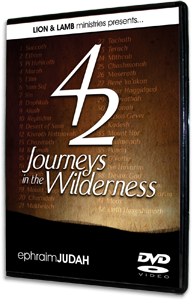
There are others who have teachings on this subject.
See if you can find from these locations where you you are, and what you might be experiencing today.
Verses thirty seven through thirty nine
37 and they pulled up (journeyed) from Kadesh, and they camped in Hor of the Mount [(Mount of the Hor, Mount Hor)], on the edge of the land of Edom, 38 and Aaron, the Priest, ascended to Hor of the Mount [(Mount of the Hor, Mount Hor)] upon the Mouth of hwhy, and died there in the fortieth year of the outgoing of the Sons of Israel from the land of Egypt, in the fifth renewed month, on the one of the renewed month, 39 and Aaron was a son of three and twenty and a hundred years in his death on Hor of the Mount [(Mount of the Hor, Mount Hor)],
Notice that Aaron died in Mount Hor on the fortieth year in the fifth month. The people mourned for Aaron's death for thirty days, which is noted in the Torah portion of Khukath, in the book of Numbers
Numbers 20:28 And Moses stripped ta-Aaron of ta-his Garments, and had ta-Eleazar, his son clothed them; and Aaron died there in the head of the mountain (the Hor): and Moses and Eleazar came down from the mountain (the Hor). 29 And all of the Congregation, they saw for Aaron had expired. And all of the House of Israel, they mourned ta-Aaron thirty days.
That means that the Israelites did not leave Mount Hor until, at the earliest, the first day of the sixth month, in the fortieth year.
This means that all of the journeys from Mount Hor in Moseroth to the plains of Jordan-Jericho were within four months on the fortieth year, at the earliest, on the first day of the sixth month, and it was during the eleventh month of the fortieth year that they landed at Jordan-Jericho, which is noted in the Torah portion of D'varim, in the book of Deuteronomy
Deuteronomy 1:1 These are the words which Moses spoke to all of Israel in over the Jordan in the wilderness, in the plain (in over) opposite Suph, between Paran, and between Tophel, and Laban, and the Hazeroth, and Di Zahab, 2 one ten (oneteen, eleven) days from Horeb at the way of Mount Seir unto Kadesh Barnea. 3 And was in the fortieth year, in the tenth ten (tenthteen, eleventh) renewed month, on the one of the renewed month, Moses spoke to the Sons of Israel according to (as) all which hwhy commanded him to them; 4 after he had struck ta Sihon, King of the Amorites, who was dwelling in Heshbon, and ta Og, King of the Bashan, who was dwelling in Astaroth, in Edrei: 5 In over the Jordan, in the land of Moab, had assayed (yeilded, began) Moses at declaring (engraving, digging) ta-this Teaching (Torah),...
Verses fifty through fifty three
50 And hwhy spoke to Moses in the plains (going overs) of Moab upon Jordan at Jericho [Jordan-Jericho)], to say, 51 Speak to the Sons of Israel, and you shall say to them, When you have gone over ta-the Jordan to the land of Canaan; 52 and you shall shall drive out (dispossess) ta-all of the dwellers of the land from your faces, and you shall make perish (destroy) ta all of their carved figures (masked figures), and you shall make perish (destroy) ta all of their casted idol (molten, libation) images, and you shall smash down (destroy) ta all of their high places: 53 And you shall possess ta-the land, and you shall dwell in her: for I have given ta-the land to yourselves to possess her.
This will be the Israelites' next step after they entered the promised land to destroy all of the perverse and pagan elohim. This would be an act of honoring and obeying the Third Word (Commandment) to not have any elohim to hwhy's Face, which is noted in the Torah portion of Yithro, in the book of Exodus
Exodus 20:3 Shall not be for yourself no other elohim upon (over) My Face. 4 You shall not make (do) for yourself a vessel image (carved image), and any image (form) which is in the Heavens from above, and which is in the Earth from below, and which is in the waters from underneath to the Earth: 5 You shalt not bow to them, and you shall not serve them: for I am hwhy, your Elohim, am a Jealous El, visiting the iniquity of the fathers, upon the sons, upon the threes, and upon the fours for hating Me; 6 And doing mercy to thousands for loving Me, and for the keepers (guards, observers) of [(for keeping (guarding, observing))] My Commandments.
Verses fifty four through fifty six
54 And you shall inherit ta-the land on the lot by your families: to the many, you shall multiply (increase) ta-his inheritance, and to the few, you shall diminish ta-his inheritance: to which the lot shall go out to him there, shall belong to him; you shall inherit by the tribes of your fathers. 55 And if you will not drive out (dispossess) ta-the dwellers of the land from your faces; and shall be whom you let remain of them for pricks (briers, entwinings, hedges) in your eyes, and thorns in your sides, and they shall vex (distress) you upon the land which you shall dwell in her. 56 And shall be, as the which I devise (compare) to do to them, I shall do to you.
When they entered into the promised land, they did not do what they were told to do, and they let some of the Canaanites live, and they became a snare to them.
Later in time, the people of Zidon were being a thorn to the Northern House of Israel, and were a cause to be ousted out the promised land, and would scatter them throughout the world. The prophet Ezekiel made this prophecy against Zidon, which is noted in his book
Ezekiel 28:20 Again the Word of hwhy came unto me, saying, 21 Son of man, set thy face against Zidon, and prophesy against her, 22 And say, Thus saith Adonai hwhy; Behold, I am against thee, O Zidon; and I will be glorified in the midst of thee: and they shall know that I am hwhy, when I shall have executed judgments in her, and shall be sanctified in her. 23 For I will send into her pestilence, and blood into her streets; and the wounded shall be judged in the midst of her by the sword upon her on every side; and they shall know that I am hwhy. 24 And there shall be no more a pricking brier unto the House of Israel, nor any grieving thorn of all that are round about them, that despised them; and they shall know that I am Adonai hwhy. 25 Thus saith Adonai hwhy; When I shall have gathered ta-the House of Israel from the people among whom they are scattered, and shall be sanctified in them in the sight of the heathen, then shall they dwell in their land that I have given to My servant, Jacob. 26 And they shall dwell safely therein, and shall build houses, and plant vineyards; yea, they shall dwell with confidence, when I have executed judgments upon all those that despise them round about them; and they shall know that I am hwhy, their Elohim.
Indirectly related, in contrast, the apostle Paul had to deal with his own thorn, which he noted in his letter to the assembly in Corinth
2 Corinthians 12:6 For though I would desire to glory, I shall not be a fool; for I will say the truth: but now I forbear, lest any man should think of me above that which he seeth me to be, or that he heareth of me. 7 And lest I should be exalted above measure through the abundance of the revelations, there was given to me a thorn in the flesh, the messenger of HaSatan to buffet me, lest I should be exalted above measure. 8 For this thing I besought the Lord thrice, that it might depart from me. 9 And he said unto me, My Grace is sufficient for thee: for My Strength is made perfect in weakness. Most gladly therefore will I rather glory in my infirmities, that the Power of Messiah may rest upon me. 10 Therefore I take pleasure in infirmities, in reproaches, in necessities, in persecutions, in distresses for Messiah's sake: for when I am weak, then am I strong. 11 I am become a fool in glorying; ye have compelled me: for I ought to have been commended of you: for in nothing am I behind the very chiefest apostles, though I be nothing.
In this case, Paul's thorn was used for a benefit for him to stay humble to not exalt himself in the knowledge and revelations he received from our Lord. I know the feeling personally, because I am currently experiencing this myself.
Relating back to this week's Torah portion passage, if we as believers in the Messiah don't get rid of the "spiritual Canaanities" in our lives, it could mean certain peoples we have relationships with, even our family members and ourselves, would be thorns in our flesh. This is what Yeshua said, which is noted in the Gospel of Luke
Luke 14:25 And there went great multitudes with him: and he turned, and said unto them, 26 If any man come to Me, and hate not his father, and mother, and wife, and children, and brethren, and sisters, yea, and his own life also, he cannot be My disciple.
The act of not hating our biological family, and ourselves, can be thorns in our own flesh.
This is also a personal issue in our lives as believers as well. We have problems with items, issues, people, and our internal matters, that we did not get rid in our lives that we should not have allowed around us. Are they giving problems in our lives still? Did we nip them in the bud when the issues arose? We need to get the "spiritual briers", "spiritual thorns" and "spiritual Canaanites" out of our lives.
CHAPTER 34
Numbers 34:1-29
Num 34:1 And hwhy spoke to Moses, to say, 2 Command ta-the Sons of Israel, and you shall say to them, When you shall come to the land of Canaan; this is the land which she shall fall to you on an inheritance of the land of Canaan by her borders:
3 And the negeb (south) mouth (end) shall be to you from the Wilderness of Zin, upon the hand of Edom, and shall be to you a negeb (southern) border from the edge of the Sea of Salt, eastward: 4 and you shall surround (circumvent, turn) to you the border from the negeb (south) to the ascent of Akrabbim [(Maaleh-Akrabbim)], and shall go over to Zin: and shall be his going out (exit) from the negeb (south) to Kadesh Barnea, and shall go out to Hazar Addar, and shall go over to Azmon: 5 And shall surround (circumvent, turn) the border from Azmon to the river of Egypt, and shall be his going out (exit) to the sea.
6 And a sea (west) border shall be to you the Great Sea: and this border shall be the sea (west) border to you.
7 And this shall be a hidden (north) border to you: from the Great Sea you shall mark off (designate, point out) to you Hor of the Mount [(Mount of the Hor, Mount Hor)]: 8 From Hor of the Mount [(Mount of the Hor, Mount Hor)], you shall mark off (designate, point out) to the entrance of Hamath; and they shall be the going out (exit) of the border to Zedad: 9 And the border shall go out to Ziphron, and his going out (exit), they shall be at Hazar Enan: this shall be to you a hidden (north) border.
10 And you shall extend (mark out) to you for an east border from Hazar Enan to Shepham: 11 And the border shall descend (go down) from Shepham to Riblah, from the east of the Ain; and the border shall descend (go down), and shall erase (wipe away, rub) upon the upper arm corner (upper shoulder-arm, corner) at the Sea of Kinnereth eastward: 12 And the border shall descend (go down) to the Jordan, and shall be his going out (exit) at the Salt Sea: This, she shall be to you, the land by her borders all around.
13 And Moses commanded ta-the Sons of Israel, to say, This is the land which you shall inherit her among the lot which hwhy commanded to give to the nine tribes, and the half tribe: 14 for the tribe of the sons of Reubenites by the house of their fathers, and the tribe of the sons of Gadites by the house of their fathers, they have received, and the half tribe of Manasseh, they have received their inheritance: 15 the two tribes and the half tribe, they have received their inheritance from over by Jordan at Jericho [Jordan-Jericho)], eastward to the rayrising.
16 And hwhy spoke to Moses, to say, 17 These are the names of the men which they shall make inherit ta-the land for you: Eleazar, the Priest, and Joshua, son of Nun. 18 And you shall take one ruler, one ruler, from a tribe to inherit ta-the land. 19 And these are the names of the men:
Of the tribe of Judah was Caleb, son of Jephunneh,
20 and of the tribe of the sons of Simeon was Shemuel, son of Ammihud.
21 Of the tribe of Benjamin was Elidad, son of Chislon,
22 and of the tribe of the sons of Dan, the ruler was Bukki, son of Jogli.
23 Of the sons of Joseph, of the tribe of the sons of Manasseh, the ruler was Hanniel, son of Ephod,
24 and of the tribe of the sons of Ephraim, the ruler was Kemuel, son of Shiphtan,
25 and of the tribe of the sons of Zebulun, the ruler was Elizaphan, son of Parnach,
26 and of the tribe of the sons of Issachar, the ruler was Paltiel, son of Azzan,
27 and of the tribe of the sons of Asher, the ruler was Ahihud, son of Shelomi,
28 and of the tribe of the sons of Naphtali, the ruler was Pedahel, son of Ammihud.
29 These are whom hwhy commanded to make inherit ta-the sons of Israel, in the land of Canaan.
(NOTE: Not all verses will have comments)
Verses one through fifteen
1 And hwhy spoke to Moses, to say, 2 Command ta-the Sons of Israel, and you shall say to them, When you shall come to the land of Canaan; this is the land which she shall fall to you on an inheritance of the land of Canaan by her borders:
3 And the negeb (south) mouth (end) shall be to you from the Wilderness of Zin, upon the hand of Edom, and shall be to you a negeb (southern) border from the edge of the Sea of Salt, eastward: 4 and you shall surround (circumvent, turn) to you the border from the negeb (south) to the ascent of Akrabbim [(Maaleh-Akrabbim)], and shall go over to Zin: and shall be his going out (exit) from the negeb (south) to Kadesh Barnea, and shall go out to Hazar Addar, and shall go over to Azmon: 5 And shall surround (circumvent, turn) the border from Azmon to the river of Egypt, and shall be his going out (exit) to the sea.
6 And a sea (west) border shall be to you the Great Sea: and this border shall be the sea (west) border to you.
7 And this shall be a hidden (north) border to you: from the Great Sea you shall mark off (designate, point out) to you Hor of the Mount [(Mount of the Hor, Mount Hor)]: 8 From Hor of the Mount [(Mount of the Hor, Mount Hor)], you shall mark off (designate, point out) to the entrance of Hamath; and they shall be the going out (exit) of the border to Zedad: 9 And the border shall go out to Ziphron, and his going out (exit), they shall be at Hazar Enan: this shall be to you a hidden (north) border.
10 And you shall extend (mark out) to you for an east border from Hazar Enan to Shepham: 11 And the border shall descend (go down) from Shepham to Riblah, from the east of the Ain; and the border shall descend (go down), and shall erase (wipe away, rub) upon the upper arm corner (upper shoulder-arm, corner) at the Sea of Kinnereth eastward: 12 And the border shall descend (go down) to the Jordan, and shall be his going out (exit) at the Salt Sea: This, she shall be to you, the land by her borders all around.
13 And Moses commanded ta-the Sons of Israel, to say, This is the land which you shall inherit her among the lot which hwhy commanded to give to the nine tribes, and the half tribe: 14 for the tribe of the sons of Reubenites by the house of their fathers, and the tribe of the sons of Gadites by the house of their fathers, they have received, and the half tribe of Manasseh, they have received their inheritance: 15 the two tribes and the half tribe, they have received their inheritance from over by Jordan at Jericho [Jordan-Jericho)], eastward to the rayrising.
This week's Torah portion passage can be compared to the account, which is noted in the book of the prophet Ezekiel
Ezekiel 47:13 Thus saith the Adonai hwhy; This shall be the border, whereby ye shall inherit ta-the land according to the twelve tribes of Israel: Joseph shall have two portions. 14 And ye shall inherit it, one as well as another: concerning the which I lifted up mine hand to give it unto your fathers: and this land shall fall unto you for inheritance. 15 And this shall be the border of the land toward the hidden (north) side, from the great sea, the way of Hethlon, as men go to Zedad; 16 Hamath, Berothah, Sibraim, which is between the border of Damascus and the border of Hamath; Hazarhatticon, which is by the coast of Hauran. 17 And the border from the sea shall be Hazarenan, the border of Damascus, and the hidden (north) hiddenward (northward), and the border of Hamath. And this is ta the hidden (north) side. 18 And the east side ye shall measure from Hauran, and from Damascus, and from Gilead, and from the land of Israel by Jordan, from the border unto the east sea. And this is ta the east side. 19 And the negeb (south) side rightward (southward), from Tamar even to the waters of strife in Kadesh, the river to the great sea. And this is ta the right (south) side nebebward (southward). 20 The sea (west) side also shall be the great sea from the border, till a man come over against Hamath. This is the sea (west) side. 21 So shall ye divide ta-this land unto you according to the Tribes of Israel. 22 And it shall come to pass, that ye shall divide it by lot for an inheritance unto you, and to the strangers that sojourn among you, which shall beget sons among you: and they shall be unto you as born in the country among the Sons of Israel; they shall have inheritance with you among the Tribes of Israel. 23 And it shall come to pass, that in what tribe the stranger sojourneth, there shall ye give him his inheritance, saith the Adonai hwhy.
This is a map of the borders of Israel that Moses stated in this week's Torah portion's chapter, and the comparison of the borders noted in Ezekiel chapter forty seven
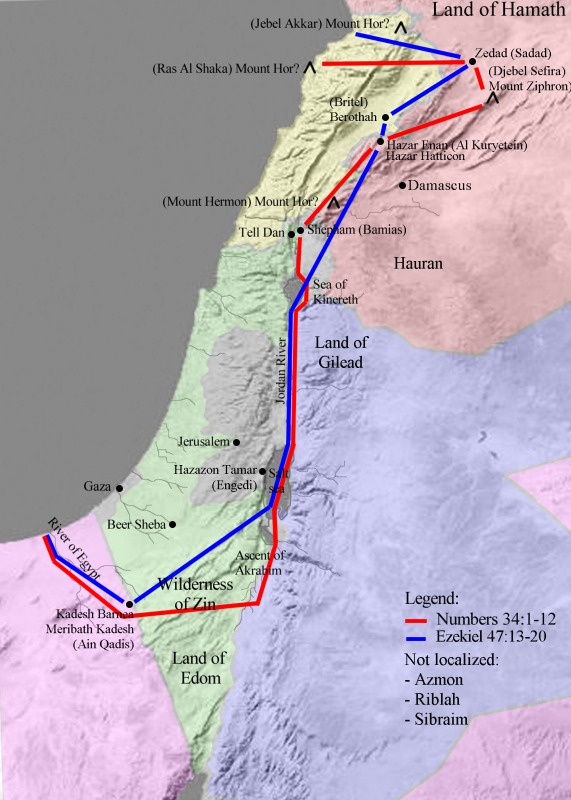
It covered most of modern day Israel and about all of Beirut.
Looking at the following words:
MARK OFF (DESIGNATE, POINT OUT)
The Hebrew word for mark off (designate, point out) is "tah-ah"- Tav, Aleph, Heh (hat). It is from Strong's Concordance number 8376, and its definition
A primitive root; to mark off, that is, (intensively) designate: - point out.
EXTEND (MARK OUT)
The Hebrew word for extend (mark out) is "ah-vah"- Aleph, Vav, Heh (hwa). It is from Strong's Concordance number 184, and its definition
A primitive root; to extend or mark out: - point out.
Notice the similarities in the Hebrew and in the English translations of these two words.
Verses sixteen through twenty nine
16 And hwhy spoke to Moses, to say, 17 These are the names of the men which they shall make inherit ta-the land for you: Eleazar, the Priest, and Joshua, son of Nun. 18 And you shall take one ruler, one ruler, from a tribe to inherit ta-the land. 19 And these are the names of the men:
Of the tribe of Judah was Caleb, son of Jephunneh,
20 and of the tribe of the sons of Simeon was Shemuel, son of Ammihud.
21 Of the tribe of Benjamin was Elidad, son of Chislon,
22 and of the tribe of the sons of Dan, the ruler was Bukki, son of Jogli.
23 Of the sons of Joseph, of the tribe of the sons of Manasseh, the ruler was Hanniel, son of Ephod,
24 and of the tribe of the sons of Ephraim, the ruler was Kemuel, son of Shiphtan,
25 and of the tribe of the sons of Zebulun, the ruler was Elizaphan, son of Parnach,
26 and of the tribe of the sons of Issachar, the ruler was Paltiel, son of Azzan,
27 and of the tribe of the sons of Asher, the ruler was Ahihud, son of Shelomi,
28 and of the tribe of the sons of Naphtali, the ruler was Pedahel, son of Ammihud.
29 These are whom hwhy commanded to make inherit ta-the sons of Israel, in the land of Canaan.
These are the rulers whom Eleazar, the Priest, and Joshua will be in charge of distributing the land by the leaders of every tribe.
These are the sons' names and their definitions (Note: Strong's Concordance numbers will be noted by an "S"):
THE SONS
JUDAH: Caleb (In Hebrew "Kaleyv" (blk) S3611): Dog, yelp
SIMEON: Shemuel (In Hebrew "Sh'moo-eyl" (lawms) S8050 [8085 + 410]): El hears
BENJAMIN: Elidad (In Hebrew "Eleedad" (ddyla) S449): El of love
DAN: Bukki (In Hebrew "Bookee" (yqb) S1231): Wasteful, empty, depopulate, spread out
OF JOSEPH: MANASSEH: Hanniel (In Hebrew "Khanee-eyl" (laynx) S2592 [2603 + 410]): Favor of El
OF JOSEPH: EPHRAIM: Kemuel (In Hebrew "K'moo-eyl" (lawmq) S7055 [6965 + 410]): Raised of El
ZEBULUN: Elizaphan (In Hebrew "Elee-tsaphahn" (Npuyla) S469 [410 + 6845]): El of treasure
ISSACHAR: Paltiel (In Hebrew "Paltee-eyl" (layjlp) S6409 [6404 + 410]): Deliverance of El
ASHER: Ahihud (In Hebrew "Akhee-hood" (dwhyxa) S282 [251 + 1935]): Brother of renown
NAPHTALI: Pedahel (In Hebrew "P'dah-eyl" (lahdp) S6300 [6299 + 410]): El has ransomed
These are the fathers' names and their definitions (Note: Strong's Concordance numbers will be noted by an "S"):
THE FATHERS
JUDAH: Jephunneh (In Hebrew "Y'phooneh" (hnpy) S3312): Prepare, respect, turn
SIMEON: Ammihud (In Hebrew "Ameehood" (dwhyme) S5989 [5971 + 1935]): People of splendor
BENJAMIN: Chislon (In Hebrew "Kees-lohn" (Nwlok) S3692): Hopeful, fat, silly
DAN: Jogli (In Hebrew "Yaglee" (ylgy) S3020): Exile, reveal
OF JOSEPH: MANASSEH: Ephod (In Hebrew "Ey-phohd" (dpa) S641): Girdle, shoulder piece, image
OF JOSEPH: EPHRAIM: Shiphtan (In Hebrew "Sheeph-tahn" (Njps) S8204): Judge
ZEBULUN: Parnach (In Hebrew "Parnakh" (Knrp) S6355): Unknown (Could be two different words; Par- bullock, and Nakh- struck, hence "a struck bullock")
ISSACHAR: Azzan (In Hebrew "ahz-zahn" (Nze) S5821): Strong one
ASHER: Shelomi (In Hebrew "Sh'oh-mee" (ymls) S8015): Peaceable
NAPHTALI: Ammihud (In Hebrew "Ahmee-hood" (dwhyme) S5989 [5971 + 1935]): People of splendor
Putting the definitions of each of the sons and fathers from each tribe together, they make phrases:
THE SONS AND FATHERS TOGETHER
JUDAH: A yelper of respect
This relates to Yeshua who was a big "yelper" against the Jewish leaders of the day, but is a respectful Person in righteousness and truth for those who believed in Him.
SIMEON: El hears the people of splendor
This is hwhy who hears His People of splendor, the Isrelites, as well as He, through Yeshua the Messiah, hears us, because we are His People of splendor, and as the Bride of the Messiah.
BENJAMIN: El of love for the hopeful
Throughout the Tanakh (Old Testament) and the Brith Khadashah (New Covenant), hwhy/Yeshua is Love, which the apostle John noted in his epistle
1 John 4:16 And we have known and believed the love that hwhy hath to us. hwhy is Love; and he that dwelleth in Love dwelleth in hwhy, and hwhy in him.
He also gives love to His hopeful ones, both His heritage People, the Isarelites, as well as the people of the world, especially for those who are believers in the Messiah.
DAN: Spread out in exile
The Israelites, both the Lost Ten Northern Tribes (Known as the House of Ephraim, also known as Joseph, or Israel) and the Two Southern Tribes (the House of Judah) were spread out in exile, because of they disobeyed His Word, and part of the purpose of Yeshua's existence on the earth was to redeem them, as the "Redeemed and Renewed First Husband" for His Bride "the Israelites".
OF JOSEPH: MANASSEH: The favor of El is His Image
This is Yeshua manefested in the flesh revealing His Image to the people, while He was on the earth.
OF JOSEPH: EPHRAIM: Raised of El shall judge
This relates to Yeshua who was raised from the dead by the Heavenly Father on the day of First Fruits, during the days of the Feast of Unleavened Bread, on the first day of the Biblical week (at sunset on Saturday night), and shall judge the people of the world at the end times.
ZEBULUN: El of treasure of a struck bullock
This relates to Yeshua, being the symbolic bullock, a domesticated animal, was sacrificed. Yeshua is also the symbolic Red Heifer who was crucified on the cross.
ISSACHAR: The deliverance of El is a strong one
This is Yeshua, who is "the Deliverer", who is "the Creator", and is the strength is His Father's Word.
ASHER: Brother of renown is peaceable
Yeshua is renown all over the world for about two thousand years, He is "the Prince of Peace" (Isaiah 9:6), and He is peacable in our hearts.
NAPHTALI: El has ransomed the people of splendor
This is also Yeshua who ransomed the People of splendor, the Israelites, as well as the people of the world, who receive Him as their Lord and Savior.
Question: "Where are the other two tribes, Reuben and Gad, and why were they not included in the roster"? Because Moses only noted the tribes who going over to inherit the land across the Jordan, which are noted in verses fourteen through seventeen of this week's Torah portion chapter
14 for the tribe of the sons of Reubenites by the house of their fathers, and the tribe of the sons of Gadites by the house of their fathers, they have received, and the half tribe of Manasseh, they have received their inheritance:... 16 And hwhy spoke to Moses, to say, 17 These are the names of the men which they shall make inherit ta-the land for you:...
These two and a half tribes had already received their inheritance on the east side of the Jordan River, in their fulfillment of their agreement with Moses, which is noted in the Torah portion of Matoth, in the book of Numbers, and in the book of Joshua
Numbers 32:6 And Moses said to the sons of Gad, and to the sons of Reuben, Your brothers [(the brothers of you)], shall they go to the war, and you, shall you dwell here?... 16 And they approached to him, and they said, We will build here inclosures of flocks for our livestock, and cities for our little ones: 17 and we, we will equip (depart) hastily to the face of the Sons of Israel, until which if we have brought them to their place: and our little ones shall dwell in the fortified (isolated, fenced) cities from the face of the dwellers of the land. 18 We will not return to our houses, until the Sons of Israel has inherited a man of his inheritance, 19 for we will not inherit with them with the going over by the Jordan, and the beyond; for our inheritance has come to us from going over the Jordan, rayrisingward. 20 And Moses said to them, If you will do ta-this word, if you will equip (depart) to the Face of hwhy for the war, 21 and all to you equip (depart) shall go over ta-the Jordan to the Face of hwhy, until ta-His enemies have been driven of him out from His Face, 22 and shall subdue (conquer) of her the land to the Face of hwhy: and afterward, you shall return, and you shall be guiltless (innocent) from hwhy, and from Israel; and this land, she shall be to yourselves for a seizing (possession) to the Face of hwhy, 23 and if you will not do so, behold, you have sinned to hwhy: and your sins, they shall know, which she shall find you out. 24 Build for yourselves cities for your little ones, and inclosures for your flocks; and you shall do that goes out from your mouth. 25 And the sons of Gad and the sons of Reuben said to Moses, to say, Your servants shall do as the which my lord (master) commands. 26 Our little ones, our wives, our livestock, and all of our animals, they shall be there in the cities of the Gilead: 27 and your servants, they shall go over, all equipped (departing) armed, to the Face of hwhy to the war, as the which my lord (master) spoke.
Joshua 22:9 And the sons of Reuben and the sons of Gad and the half tribe of Manasseh returned, and departed from the Sons of Israel out of Shiloh, which is in the land of Canaan, to go unto the country of Gilead, to the land of their possession, whereof they were possessed, according to the word of hwhy by the hand of Moses.
CHAPTER 35
Numbers 35:1-34
Num 35:1 And hwhy spoke to Moses in the Plains of Moab upon (over) Jordan at Jericho [(Jordan-Jericho)], to say, 2 Command ta-the Sons of Israel, and they shall give to the Levites from the inheritance of their seizings (possessions) Cities to dwell; and the grazing lands of the Cities surrounding (all around) them, you shall give to the Levites, 3 and the Cities, they shall be for them to dwell; and their grazing lands, they shall be for their animals, and for their substances (goods), and for all of their beasts. 4 And the grazing lands of the cities which you shall give to the Levites, from the wall of the City and outward (outgoing) shall be a thousand on the cubit all around, 5 and you shall measure outside of the City ta-the east mouth (end) two thousand on the cubit, and ta-the negeb (south) mouth (end) two thousand on the cubit, and ta-the sea (west) mouth (end) two thousand cubits, and ta the hidden (north) mouth (end) two thousand on the cubit; and the City shall be in the midst: this shall be to them the grazing lands of the Cities.
6 And ta the Cities which you shall give to the Levites shall be ta six Cities of the Refuge, which you shall give for the fleer there, the slayer (murderer): and you shall give upon them forty and two Cities. 7 All of the Cities which you shall give to the Levites shall be forty and eight Cities: them, and ta-their grazing lands, 8 and the Cities which you shall give from the seizing (possession) of the Sons of Israel: from ta the much you shall multiply; and from ta the few you shall diminish: a man according to (as) the mouth of his inheritance which they shall inherit shall give from his Cities to the Levites.
9 And hwhy spoke to Moses, to, 10 Speak to the Sons of Israel, and you shall say to them, When you go over ta-the Jordan to the land of Canaan; 11 and you shall make befall to you Cities, they shall be to you Cities of Refuge (for Refuge); and the slayer that strikes a soul in ignorance shall flee there. 12 And they shall be to you the Cities for Refuge from the avenger (revenger); and the slayer shall not die until he stands to the face of the Congregation for the judgment. 13 And the Cities which you shall give: six Cities of Refuge, they shall be to you. 14 ta Three of the Cities you shall give from over by the Jordan, and ta three of the Cities shall you shall give in the land of Canaan, they shall be Cities of Refuge. 15 To the Sons of Israel, and to the stranger (sojourner), and to the dweller (tenant) in their midst, they shall be these six Cities for refuge: for the fleeing there of anyone striking a soul in ignorance.
16 And if has struck him on a vessel of iron an the death [(and dies)], he is a murderer. Dying, the murderer (slayer) shall die,
17 and if on a stone at hand which shall die on her, strikes him and the death [(and dies)], he is a murderer (slayer). Dying, the murderer (slayer) shall die.
18 or on a vessel of a tree (wood) at hand which shall die on him has struck him, and the death [(and dies)], he is a murderer (slayer). Dying, the murderer (slayer) shall die.
19 The avenger (revenger) of the blood, he shall make die (execute) ta-the murderer (slayer): he shall make him die [(execute him)] in his impinging against him.
20 And if has pushed him in hatred, or has thrown (had cast) upon him in laying of wait, and the death (and dies), 21 or in enmity has struck him on his hand and the death [(and dies)], dying, the striker shall die; he is a murderer (slayer): the avenger (revenger) of the blood shall make die (execute) ta-the murderer (slayer) in his impinging on him.
22 And if in a moment (instant) on no emnity he pushed him, or threw (cast) any vessel upon him in no laying of wait, 23 or on any stone which shall die on her in not seeing, and shall fall upon him, and the death [(and dies)], and he was not an enemy to him, and was not seeking (beseeching) his evil: 24 And the Congregation, they shall judge between the striker and between the avenger (revenger) of the blood upon these Judgments: 25 and the Congregation, they shall deliver ta-the slayer from the hand of the avenger (revenger) of the blood, and the Congregation, they shall return him to the City of his Refuge which had fled there: and shall return in her until the death of the High Priest which was anointed him on the Sacred (Holy) Oil.
26 And if going out, the slayer shall go out of ta-the border of the City of his Refuge which had fled there; 27 and the avenger (revenger) of the blood finds him out from outside by the border of the City of his Refuge, and the avenger (revenger) of the blood slays (murders) ta-the slayer; blood shall not be to him: 28 for was to dwell in the City of his Refuge until the death of the High Priest: and after the death of the High Priest, the slayer can return to the land of his seizing (possession). 29 And these shall be to you for a Statute of Judgment for your generations in all of your dwellings.
30 Anyone striking a soul, by the mouth of witnessess shall slay ta-the slayer: and one witness shall not eye-testify (heed) against a soul to the death. 31 And you shall not take a cover-ransom for the soul of a murderer (slayer), whom he was guilty (wicked) to the death: for dying, shall die. 32 And you shall not take a cover-ransom to flee to the City of his Refuge, to return to the dwelling in the land, until the death of the Priest. 33 And you shall not pollute (profane) ta-the land which you are in her: for the blood, he pollutes (profanes) ta-the land: and for the land, shall not be cover-ransomed for the blood which was shed in her, for but on the blood shedded of him. 34 And you shall not make unclean [(shall not defile)] ta-the land which you reside (dwell) in her which I tabernacle in her midst: for I, hwhy, am tabernacling in the midst of the Sons of Israel.
(NOTE: Not all verses will have comments)
Verses one through eight
1 And hwhy spoke to Moses in the Plains of Moab upon (over) Jordan at Jericho [(Jordan-Jericho)], to say, 2 Command ta-the Sons of Israel, and they shall give to the Levites from the inheritance of their seizings (possessions) Cities to dwell; and the grazing lands of the Cities surrounding (all around) them, you shall give to the Levites, 3 and the Cities, they shall be for them to dwell; and their grazing lands, they shall be for their animals, and for their substances (goods), and for all of their beasts. 4 And the grazing lands of the cities which you shall give to the Levites, from the wall of the City and outward (outgoing) shall be a thousand on the cubit all around, 5 and you shall measure outside of the City ta-the east mouth (end) two thousand on the cubit, and ta-the negeb (south) mouth (end) two thousand on the cubit, and ta-the sea (west) mouth (end) two thousand cubits, and ta the hidden (north) mouth (end) two thousand on the cubit; and the City shall be in the midst: this shall be to them the grazing lands of the Cities. 6 And ta the Cities which you shall give to the Levites shall be ta six Cities of the Refuge, which you shall give for the fleer there, the slayer (murderer): and you shall give upon them forty and two Cities. 7 All of the Cities which you shall give to the Levites shall be forty and eight Cities: them, and ta-their grazing lands, 8 and the Cities which you shall give from the seizing (possession) of the Sons of Israel: from ta the much you shall multiply; and from ta the few you shall diminish: a man according to (as) the mouth of his inheritance which they shall inherit shall give from his Cities to the Levites.
Each of the forty eight citities the Levites were to occupy would include 2,000 cubits of the length of each side of the city walls.
These are the measurements relating to the Levitical city:
1 mile = 5,280 feet
1 cubit = 1.5 feet, or 18 inches
2,000 cubits x 1.5 feet = 3000 feet
3,000 feet / 5,280 feet = about .57 miles
This calculated the Levitical grazing land distance to just over a half a mile
Looking at the word GRAZING
The Hebrew word for grazing is "mee-grash"- Mem, Gimel, Resh, Shin (srgm). It is from Strong's Concordance number 4054, and its definition
From H1644; a suburb (that is, open country whither flocks are driven for pasture); hence the area around a building, or the margin of the sea: - cast out, suburb.
from 1644 "gah-rash" (srg), and its definition
A primitive root; to drive out from a possession; especially to expatriate or divorce: - cast up (out), divorced (woman), drive away (forth, out), expel, X surely put away, trouble, thrust out.
This is where we get our modern englis word "grass" and "graze".
Verses nine through twenty nine
These were the jails of ancient times, but they were mainly for those who didn't intend to kill anyone.
About all of the Cities of Refuge are noted in the book of Joshua. Thsese are the locations of the cities mentioned in the book of Joshua: (Note: they are colored coded for the different Levitical tribes, the twelve tribes which gave the cities, and the Cities of Refuge):
KEY
YELLOW: The sons of Aaron, the tribal cities the grazing areas were alotted to, and the grazing areas they obtained.
GREEN: The sons of Kohath, the tribeal cities they were alotted to, and the grazing areas they obtained.
RED: The sons of Gershon, the tribal cities they were alotted to, and the grazing areas they obtained.
BLUE: The sons of Merari, the tribal cities they were alotted to, and the grazing areas they obtained.
PUPRLE: The places of the Cities of Refuge.
About all of the cities of refuge are noted in the book of Joshua
Joshua 21:1 Then came near the heads of the fathers of the Levites unto Eleazar, the Priest, and unto Joshua, son of Nun, and unto the heads of the fathers of the tribes of the Sons of Israel; 2 And they spake unto them at Shiloh in the land of Canaan, saying, hwhy commanded by the hand of Moses to give us Cities to dwell in, with the grazing areas thereof for our cattle. 3 And the Sons of Israel gave unto the Levites out of their inheritance, at the Commandment of hwhy, ta-these Cities and ta-their grazing areas.
4 And the lot came out for the families of the Kohathites: and the sons of Aaron, the Priest, which were of the Levites, had by lot from the tribe of Judah, and from the tribe of Simeon, and from the tribe of Benjamin, thirteen Cities.
5 And the rest of the sons of Kohath had by lot out from families from tribe of Ephraim, and from the tribe of Dan, and from the half tribe of Manasseh, ten Cities.
6 And the sons of Gershon had by lot out from families of the tribe of Issachar, and out of the tribe of Asher, and out of the tribe of Naphtali, and out of the half tribe of Manasseh in Bashan, thirteen Cities.
7 The sons of Merari by their families had out from tribe of Reuben, and out from tribe of Gad, and out from tribe of Zebulun, twelve cities. 8 And the Sons of Israel gave by lot unto the Levites ta-these Cities with ta-their suburbs, as hwhy commanded by the hand of Moses.
9 And they gave from the tribe of the sons of Judah, and from the tribe of the sons of Simeon, ta these Cities which are here mentioned by name, 10 Which the sons of Aaron, being of the families of the Kohathites, who were of the sons of Levi, had: for theirs was the first lot. 11 And they gave them ta-the City of Arba, father of Anak, which is the city Hebron, in the hill country of Judah, with ta-the suburbs thereof round about it. 12 But ta-the fields of the City, and ta-the villages thereof, gave they to Caleb, son of Jephunneh, for his possession.
13 Thus they gave to the sons of Aaron, the Priest, ta-Hebron with ta-her grazing areas, to be ta-a City of Refuge for the slayer; and ta-Libnah with ta-her grazing areas, 14 And ta-Jattir with ta-her suburbs, and ta-Eshtemoa with ta-her grazing areas, 15 And ta-Holon with ta-her suburbs, and ta-Debir with ta-her grazing areas, 16 And ta-Ain with ta-her suburbs, and ta-Juttah with ta-her grazing areas, and ta-Bethshemesh with ta-her grazing areas; nine Cities from ta those two tribes.
17 And from the tribe of Benjamin, ta-Gibeon with ta-her grazing areas, ta-Geba with ta-her grazing areas, 18 ta-Anathoth with ta-her grazing areas, and ta-Almon with ta-her grazing areas; four Cities. 19 All the Cities of the sons of Aaron, the Priests, were thirteen Cities with their grazing areas.
20 And the families of the sons of Kohath, the Levites which remained of the sons of Kohath, even they had the Cities of their lot out from the tribe of Ephraim. 21 For they gave them ta-Shechem with ta-her grazing areas in Mount Ephraim, to be ta-a City of Refuge for the slayer; and ta-Gezer with ta-her grazing areas, 22 And ta-Kibzaim with ta-her grazing areas, and ta-Bethhoron with ta-her grazing areas; four Cities.
23 And from the tribe of Dan, ta-Eltekeh with ta-her grazing areas, ta-Gibbethon with ta-her grazing areas, 24 ta-Aijalon with ta-her grazing areas, ta-Gathrimmon with ta-her grazing areas; four Cities.
25 And from the half tribe of Manasseh, ta-Tanach with ta-her grazing areas, and ta-Gathrimmon with ta-her grazing areas; two Cities. 26 All of the Cities were ten with their grazing areas for the families of the sons of Kohath that remained.
27 And unto the sons of Gershon, of the families of the Levites, from the other half tribe of Manasseh they gave ta-Golan in Bashan with ta-her grazing areas, to be ta-a City of Refuge for the slayer; and ta-Beeshterah with ta-her grazing areas; two Cities.
28 And from the tribe of Issachar, ta-Kishon with ta-her grazing areas, ta-Dabareh with ta-her grazing areas, 29 ta-Jarmuth with ta-her grazing areas, ta-Engannim with ta-her grazing areas; four Cities.
30 And from the tribe of Asher, ta-Mishal with ta-her grazing areas, ta-Abdon with ta-her grazing areas, 31 ta-Helkath with ta-her grazing areas, and ta-Rehob with ta-her suburbs; four Cities.
32 And from the tribe of Naphtali, ta-Kedesh in Galilee with ta-her suburbs, to be ta-a City of Refuge for the slayer; and ta-Hammothdor with ta-her suburbs, and ta-Kartan with ta-her grazing areas; three Cities. 33 All of the Cities of the Gershonites according to their families were thirteen Cities with their grazing areas.
34 And unto the families of the sons of Merari, the rest of the Levites, from ta the tribe of Zebulun, ta-Jokneam with ta-her grazing areas, and ta-Kartah with ta-her grazing areas, 35 ta-Dimnah with ta-her grazing areas, ta-Nahalal with ta-her grazing areas; four Cities.
36 And from the tribe of Reuben, ta-Bezer with ta-her grazing areas, and ta-Jahazah with ta-her grazing areas, 37 ta-Kedemoth with ta-her grazing areas, and ta-Mephaath with ta-her grazing areas; four cities.
38 And from the tribe of Gad, ta-Ramoth in Gilead with ta-her grazing areas, to be ta-a City of Refuge for the slayer; and ta-Mahanaim with ta-her grazing areas, 39 ta-Heshbon with ta-her grazing areas, ta-Jazer with ta-her grazing areas; four Cities in all. 40 All of the Cities for the sons of Merari by their families, which were remaining of the families of the Levites, were by their lot twelve cities.
41 All of the cities of the Levites within the inheritance of the Sons of Israel were forty and eight Cities with their grazing areas. 42 These Cities were every one with their grazing areas all around them: thus were all of these cities.
There are 112 Aleph-Tavs found in this Joshua passage. If you include the last few verses of this Joshua chapter not included, there are a total of 114 Aleph-Tavs. This chapter has the most Aleph-Tavs of any chapter outside of the Torah, and it is based on the Levitical cities. hwhy made it very important to emphasize the Aleph-Tavs here. Yeshua is the Aleph-Tav, and He is most emphasized in this issue, because He is a descendant of the High Priestly Levitical line of Aaron via his Aaronite mother, Mary.
Notice that there are only five Cities of Refuge noted in this week's Torah portion chapter. So why wasn't the sixth City of Refuge noted here, and what was the sixth City of Refuge? It is noted in the Torah portion of Va'Ethkhanan, in the book of Deuteronomy
Deuteronomy 4:41 Then Moses separated (distinguished) three cities in over the Jordan to the rayrising of the sun; 42 for the slayer fleeing there who slayed ta-his neighbor in failing at knowing, and he had not hatred to him from yesterday, of three; and shall flee to one of these cities and shall live: 43 ta-Bezer in the wilderness in the leveled area (leveled plain area) of the Reubenites; and ta-Ramoth in the Gilead of the Gadites; and ta-Golan in the Bashan of the Manassites.
The sixth City of Refuge was Bezer, located in the eastern side of the Jordan River.
Below are a couple of maps showing the Levitical cities and their cities of refuge. Both maps showing the Cities of Refuge are marked in red.
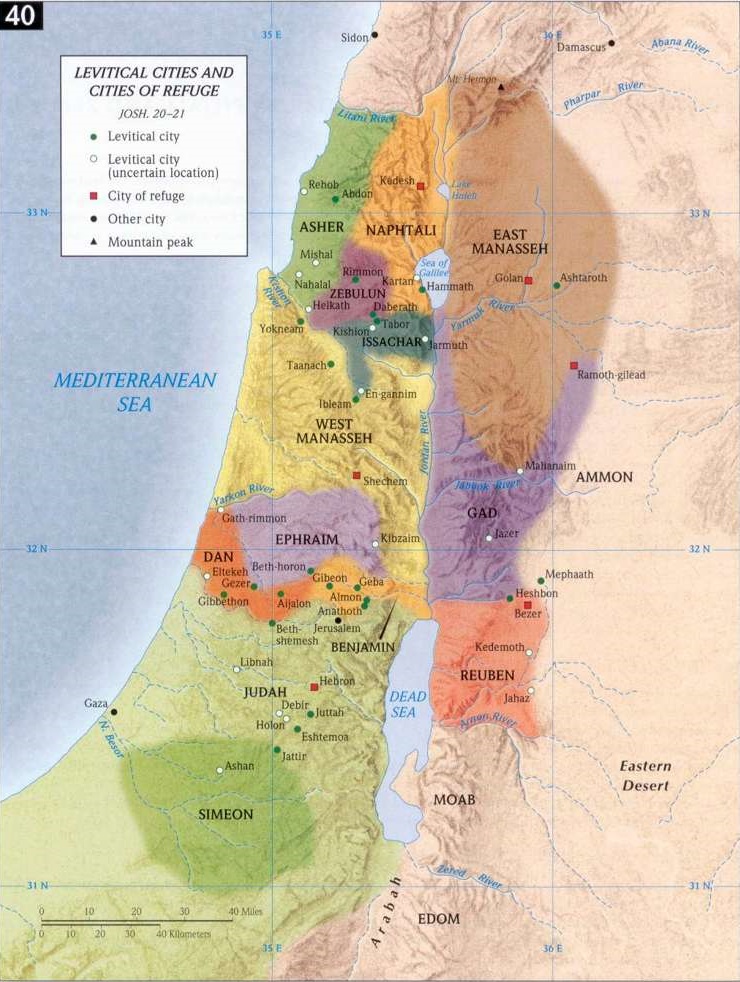
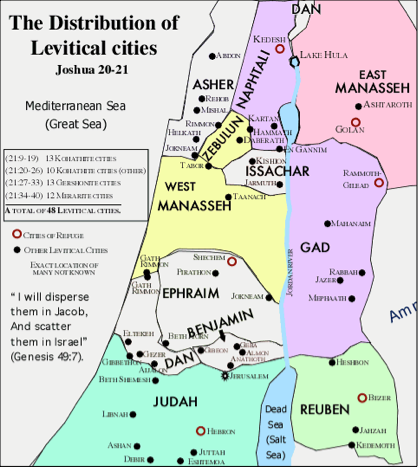
Mark Biltz of El Shaddai Ministries noted that the locations of these Ciites of Refuges relate to each of Jacob's wives in their separate borders based on six of their sons' tribal locations. This is a map on how Jacob's wives were situated based on these Cities of Refuges
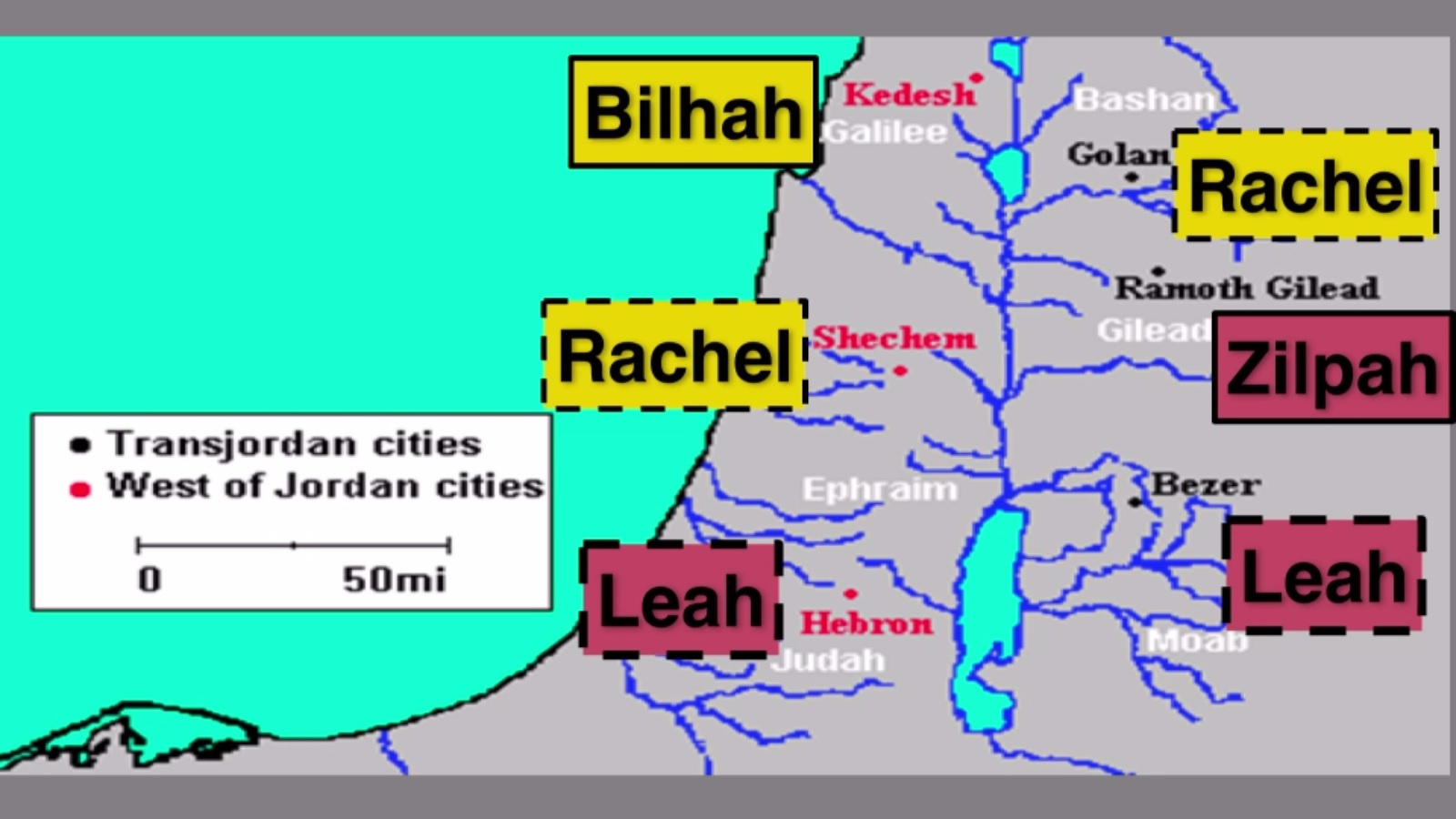
This list contain the meanings of each of the cities' names, using the same color key representing each of the Levitical families (Note: Strong's Concordance numbers will be noted by an "S"):
THE SONS OF AARON
OF JUDAH
Hebron (In Hebrew "Khevrohn" (Nwrbx) S2275): Seat of association, society, charmer, company, join
Libnah (In Hebrew "Leevnah" (hnbl) S3841): Whitish
Jattir (In Hebrew "Yat-teer" (rty) S3492): Redundant, excel, to be remain or left
Eshtemoa (In Hebrew "Esh-t'mo-ah" (emtsa) S851): To hear intelligently, obedience
Holon (In Hebrew "Kholohn" (Nlx) S2473): Sandy
Debir (In Hebrew "D'veer" (rbd) S1688): The shrine of the innermost part of the sanctuary, arrange, speak, subdue
Ayin (In Hebrew "Ah-yeen" (Nye) S5871): Fountain
Juttah (In Hebrew "Yootah" (hjy) S3194): Extended
Beth Shemesh (In Hebrew "Beyth Shemesh" (sms tyb) S1053): House of the sun
OF BENJAMIN
Gibeon (In Hebrew "Geev-ohn" (Nwebg) S1391): Hilly
Geba (In Hebrew "Geva" (ebg) S1387): A hillock
Anathoth (In Hebrew "Anathoth" (twtne) S6068): Answers
Almon (In Hebrew "Almohn" (Nwmle) S5960): Hidden
THE SONS OF KOHATH
OF EPHRAIM
Shechem (In Hebrew "Sh'khehm" (Mks) S7927): Ridge, neck, shoulder
Gezer (In Hebrew "Gehzehr" (rzg) S1507): Something cut off, a portion
Kibzaim (In Hebrew "Keev-tsa-yeem" (Myubq) S6911): Double heap
Beth Horon (In Hebrew "Beyth Khorohn" (Nwrx tyb) S1302): House of hollowness
OF DAN
Eltekeh (In Hebrew "Ehl-t'key" (aqtla) S514): [From Hebrew-Greek Key Study Bible] Meeting place
Gibbethon (In Hebrew "Geeb-b'thohn" (Nwtbg) S1405): A hilly spot
Aijalon (In Hebrew "Ai-yalohn" (Nwlya) S357): Deer-field
Gath Rimmon (In Hebrew "Gath Reemohn" (Nwmr tg) S1667): Wine-press of the pomegranate
OF THE HALF TRIBE OF MANASSEH
Tanach (In Hebrew "Ta-nakh" (Knet) S8590): (Unknown)
Gath Rimmon (In Hebrew "Gath Reemohn" (Nwmr tg) S1667): Wine-press of the pomegranate
THE SONS OF GERSHON
OF THE HALF TRIBE OF MANASSEH
Golan (In Hebrew "Golahn" (Nwlg) S1474): Captive, exile
Beeshterah (In Hebrew "B'esh-t'rah" (hrtseb) S1203): With Ashtoreth (increase)
OF ISSACHAR
Kishon (In Hebrew "Keesh-yohn" (Nwysq) S7191):- Hard ground
Dabareh (In Hebrew "Davrath" (trbd) S1705): Word
Jarmuth (In Hebrew "Yarmooth" (twmry) S3142): Elevation
En Gannim (In Hebrew "Eyn Gahn-neem" (Myng Nye) S5873): Fountain of gardens
OF ASHER
Mishal (In Hebrew "Meesh-ahl" (lasm) S4861): Request
Abdon (In Hebrew "Ahv-dohn" (Nwdbe) S5658): Servitude
Helkath (In Hebrew "Khel-kath" (tqlx) S2520): Smoothness
Rehob (In Hebrew "R'khohv" (bxr) S7340): A width, avenue or area
OF NAPHTALI
Kedesh (In Hebrew "Kedesh" (sdq) S6943): Sanctum (or clean) of circle (turning, round), defiled circle
Hammoth Dor (In Hebrew "Khamoth Dohr" (rad tmx) S2576): Hot springs of dwelling (generation)
Kartan (In Hebrew "Kartahn" (Ntrq) S7178): City-plot
THE SONS OF MERARI
OF ZEBULUN
Jokneam (In Hebrew "Yak-n'ahm" (Menqy) S3362): People will be lamented
Kartah (In Hebrew "Kahr-tah" (htrq) S7177): City
Dimnah (In Hebrew "Deemnah" (hnmd) S1829): Dung heap (this is where we get our English word "damn" from)
Nahalal (In Hebrew "Na-halal" (llhn) S5096): Pasture
OF REUBEN
Bezer (In Hebrew "Betsehr" (rub) S1221): Clipping, cut off, fenced, fortify, gold (as dug out)
Jahazah (In Hebrew "Yah-tsah" (huhy) S3096): Perhaps threshing-floor
Kedemoth (In Hebrew "K'dey-moth" (twmdq) S6932): Beginnings
Mephaath (In Hebrew "Mey-pha-ath" (tepym) S4158): Illuminative, shine
OF GAD
Ramoth Gilead (In Hebrew "Ramoth" (tmr) S7433): Heights
Mahanaim (In Hebrew "Ma-khana-yeem (Mynxm) S4266): Double camp
Heshbon (In Hebrew "Khesh-bohn" (Nwbsx) S2809): Contrivance, intelligence, think, regard
Jazer (In Hebrew "Ya-zeyr" (rzey) S3270): Helpful
These are the names of the cities of refuge and their definitions mentioned above:
Hebron: Seat of association, society, spell, join, fascinate, charmer
Shechem: Ridge, neck, shoulder
Golan: Captive, exile
Kedesh of Galilee: Sanctum (or clean) of circle (turning, round), Holy circle
Bezer: Clipping, cut off, fenced, fortify, gold (as dug out)
Ramoth: Heights/high place
These names of the cities of refuge creates a story:
A society was upon His Shoulder, who was captive and exiled, but to sanctify them He had to be cut off at the heights/high place.
The meanings of the names of these Cities of Refuge tell a prophetic story of Yeshua going into Jerusalem on the tenth day of the first Biblical month of Aviv/Nissan, then is captured at the Garden of Gethsemene on the fourteenth day of Aviv/Nissan on the night of Passover, was taken captive in Jerusalem, and then was sent by the involvement of the Jews and the Roman authorities (the society) to be crucified (cut off) at the Mount of Olives (heights/high place), during the daytime on the same Passover day, in which he bears the sins of the Israelite society and the world upon His "Shoulders" to "sanctify them" through His death and resurrection, which included the Lost Ten Northern Tribes of Israel who were exiled, and the Southern House of Judah who are in captivity still within themselves. It is Yeshua's fulfillment of the Israelites' Exodus story, which is noted in the Torah portion Bo, in the book of Exodus
Exodus 12:1 And hwhy spoke to Moses and Aaron in the land of Egypt, to say, 2 This renewed month shall be to you the head of renewed months: he shall be to you the first for the renewed months of the year. 3 Speak to all of the Congregation of Israel, to say, On the ten of this renewed month, and they shall take a man for themselves a lamb for a house of their father, a lamb for the house: 4 And if the household shall be little with being with the lamb, and he and his dweller that is near to his house shall take on the enumeration (number) of the souls; You shall count (number) upon the lamb a man by the mouth of his eating. 5 A lamb shall be a perfect male of a son of a year: shall be for yourselves from the lambs, and you shall take from the kids (young goats): 6 And shall be for you to keep (guard, watch) until the four ten (fourteen) day of this renewed month: and all of the Assembly of the Congregation of Israel, they shall slaughter him between the mixing periods. 7 And they shall take of the blood and shall give him upon the two side posts, and upon the upper door post (lentil) upon the houses which they shall eat him in them.
Yeshua came in to the city of Jerusalem four days before the Passover, which is noted in the Gospel of John
John 12:12 On the next day [10th day of Aviv/Nissan] much People that were come to the Feast, when they heard that Yeshua was coming to Jerusalem, 13 Took branches of palm trees, and went forth to meet Him, and cried, Hosanna: Blessed is the King of Israel that cometh in the Name of hwhy. 14 And Yeshua, when He had found a young ass, sat thereon; as it is written, 15 Fear not, daughter of Sion: behold, thy King cometh, sitting on an ass's colt. 16 These things understood not His disciples at the first: but when Yeshua was glorified, then remembered they that these things were written of him, and that they had done these things unto him.
This become the annual Spring High Holy Day of Passover, noted in the Torah portion of Emor, in the book of Leviticus
Leviticus 23:5 In the first renewed month, on the four ten (fourteen) of the renewed month, between the mixing periods (evenings), is the Passover to hwhy.
Yeshua became our Passover sacrifice, which the apostle Paul noted in his letter to the assembly in Corinth
1 Corinthians 5:7 Purge out therefore the old leaven, that ye may be a new lump, as ye are unleavened. For even Messiah, our Passover is sacrificed for us:
!!!!!hwhy Kl dbk
Indirectly related, King David noted hwhy being his Refuge which is noted in the book of the Psalms
Psalms 46:1 To the chief Musician for the sons of Korah, A Song upon Alamoth. Elohim is our refuge and strength, a very present help in trouble.
Psalms 46:7 hwhy of Armies (Hosts) is with us; the Elohim of Jacob is our Refuge. Selah.
Psalms 46:11 hwhy of Armies (Hosts) is with us; the Elohim of Jacob is our Refuge. Selah.
Verse twenty five
25 and the Congregation shall deliver ta-the slayer from the hand of the avenger (revenger) of the blood, and the Congregation shall return him to the City of his Refuge which had fled there: and shall return in her until the death of the High Priest of whom was anointed him on the Sacred (Holy) Oil.
Mark Biltz of El Shaddai Ministries displayed a chart of the amount of High Priests to the years of certain periods of time:
From the time of Moses to the time of Solomon's Temple erected:
612 years / 13 High Priest = 47 years average
From the time of Solomon's Temple to the time of the destruction of Solomon's Temple:
466.5 years / 18 High Priests = 25.9 years average
Mark Biltz noted that those innocent manslayers who went to the Cities of Refuge hoped that the High Priests were about to die, so that they wouldn't be there for a long time.
Verse twenty eight
for was to dwell in the City of his Refuge until the death of the High Priest: and after the death of the High Priest, the slayer can return to the land of his possession.
As I commented multiple times in previous certain Torah portions, Yeshua became the last physical legitimite High Priest on earth before He was crucified. In the application to this week's Torah portion passage, when Yeshua died, He became the last legitimate physical High Priest to die for all of the slayers of Israel. Now He has became the Savior for ALL slayers. There have been many examples of that in recent times. One of the most well known is Nicki Cruz, who was portrayed by Eric Estrada with Pat Boone playing David Wilkerson in "The Cross and the Switchblade".
Indirectly realted, Yeshua also followed this week's Torah portion chapter, and a scenario could have occurred, which could have been based in the Gospels of Matthew and John
Matthew 26:51 And, behold, one of them which were with Yeshua stretched out his hand, and drew his sword, and struck a servant of the High Priest's, and smote off his ear. 52 Then said Yeshua unto him, Put up again thy sword into his place: for all they that take the sword shall perish with the sword.
John 18:10 Then Simon Peter having a sword drew it, and smote the High Priest's servant, and cut off his right ear. The servant's name was Malchus. 11 Then said Yeshua unto Peter, Put up thy sword into the sheath: the cup which my Father hath given me, shall I not drink it?
Based on this week's Torah portion chapter, if this is correct, Yeshua knew that if this servant could have potentially died, Peter would have had to escape to one of the Cities of Refuge, but would have been tried and be killed by the relative, would could have been the potential avenger of blood, which is noted in the Gospel of John
John 18:26 One of the servants of the High Priest, being his kinsman whose ear Peter cut off, saith, Did not I see thee in the garden with Him? 27 Peter then denied again: and immediately the cock crew.
This servant of the High Priest who relative's ear Peter cut off, and died, could have been the avenger of blood, and could have killed Peter by right according the Torah.
Mar
Mark Biltz of El Shaddai Ministries displayed the chart of the High Priests between between Aaron as the first High Priest and Solomon's Temple, and between Solomon's Temple to the Temple's destruction resulting in the Babylonian Captivity
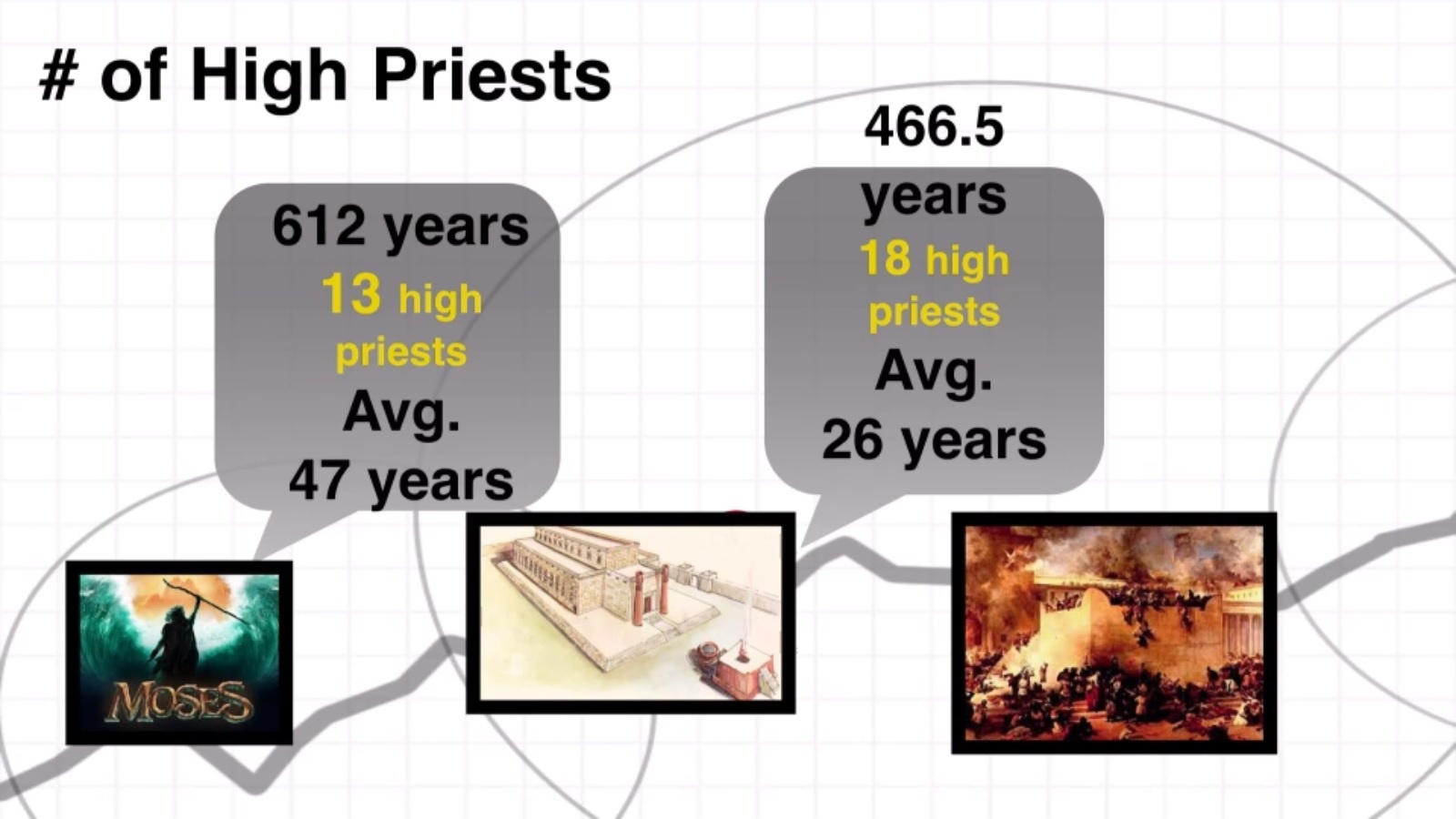
The average life of a High Priest was much longer to Solomon's Temple, than from Solomon's Temple to Babylonian Captivity, which means that those who sent to one of the Cities of Refuge hoped that the High Priest didn't have long to live.
From 37BC and 70 AD, about 107 years, there were twenty eight High Priests, and the average of the timeline of the life of each High Priest was 3.8 years, which is shown in Mark Biltz's other chart
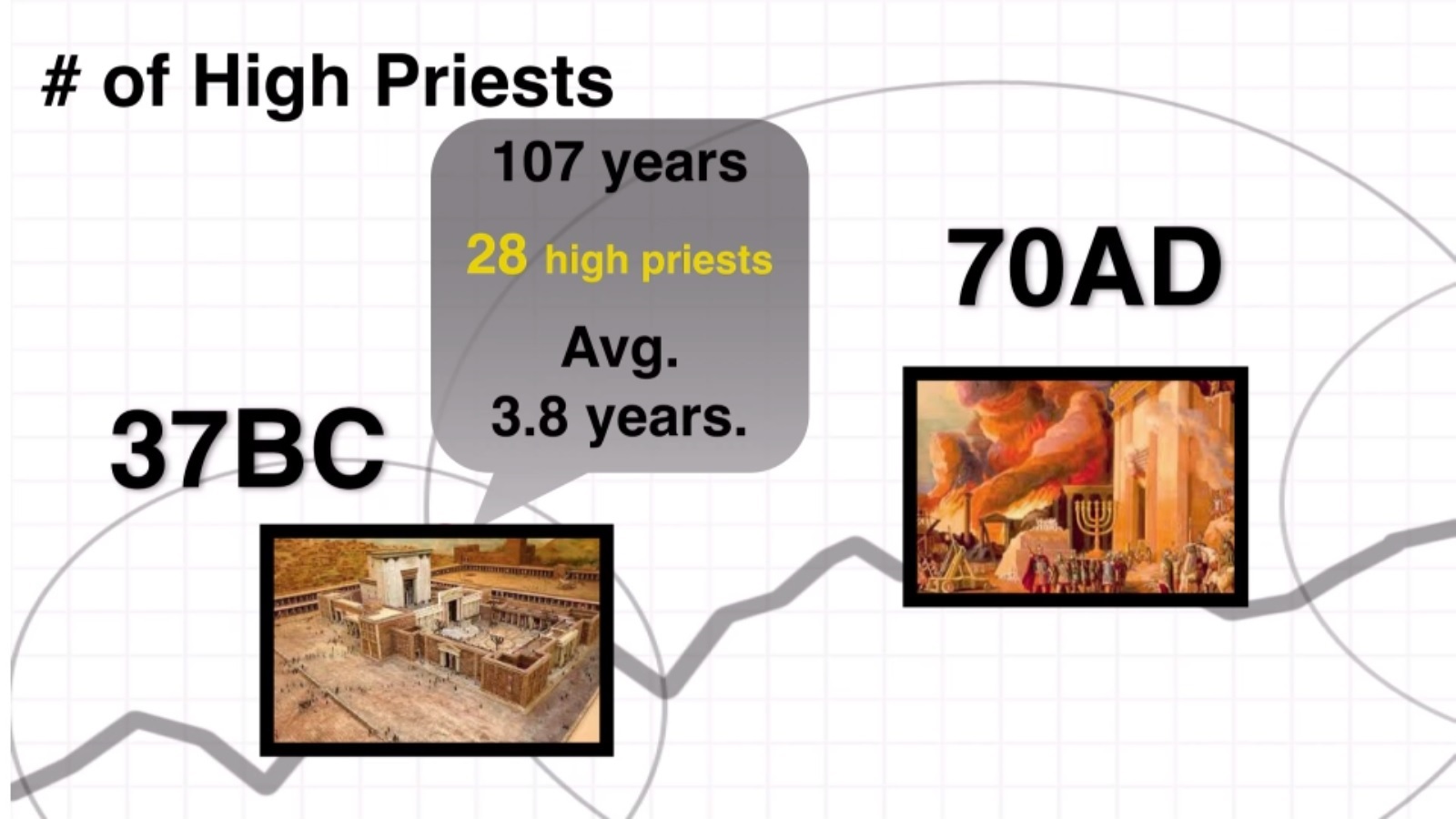
Mark also noted that the High Priesthood position was bought out, and they kicked out the previous High Priest. That means that the previous High Priests during the 107 year timeline did not die, and for the Commandment for those who are in the Cities of Refuge, as long as the High Priesthood was bought and causing the previous High Priest to be kicked out while alive, they were guaranteed to die while in refuge. Don't think that Yeshua didn't know this Commandment. It was right for Yeshua to take over the High Priesthood, so that He could die for the sins of the world, and to fulfill the Commandment for the High Priest to die.
This week's Torah portion passage could be a basis of Yeshua's death as the High Priest for those who are and were in the Cities of Refuge who should have been set free, which is noted in the Gospel of John
Matthew 27:45 Now from the sixth hour there was darkness over all the land unto the ninth hour. 46 And about the ninth hour, Yeshua cried with a Loud Voice, saying, Eli, Eli, lama sabachthani? That is to say, My El, my El, why hast thou forsaken me? 47 Some of them that stood there, when they heard that, said, This Man calleth for Elias. 48 And straightway one of them ran, and took a spunge, and filled it with vinegar, and put it on a reed, and gave Him to drink. 49 The rest said, Let be, let us see whether Elias will come to save Him. 50 Yeshua, when He had cried again with a Loud Voice, yielded up the Spirit. 51 And, behold, the veil of the Temple was rent in twain from the top to the bottom; and the earth did quake, and the rocks rent; 52 And the graves were opened; and many bodies of the saints which slept arose, 53 And came out of the graves after His Resurrection, and went into the Holy City, and appeared unto many.
Also, one can also say that Yeshua, the Messiah, is our City of Refuge when we as believers accepted Him as our Savior and Lord and now lives in our hearts.
!!!!!hwhy Kl dbk
Today, instead of Cities of Refuge, we have jails. We do not have a legitimite High Priest on earth, but the government. If we went by the Torah in this matter today, none of those who are in jail for killing someone will be let out, because Yeshua is our Eternal High Priest today, and He is never going to die again.
There was a true story of a woman from Texas years ago that was sent to jail and was put on death row for murdering a woman with an axe while her husband was having an affair. While in jail, she found the Messiah via a ministry, and the man that led her to the Messiah later married her. She became a completely changed person and worshiped Messiah with all of her heart. Her husband appealed her execution to the governor in Texas, who at the time was George W. Bush. On the day of the execution, Governor Bush refused to stay the execution, and they put her to death. A Christian company made a movie about it.
In my opinion, Bush, a believer himself, showed no compassion in her case. Even if former governor Bush could have given her a chance to live, did this Torah segment apply to her, because she killed a person on purpose? I will end it on that question.
Verse thirty three
33 And you shall not pollute (profane) ta-the land which you are in her: for the blood, he pollutes (profanes) ta-the land: and for the land, shall not be cover-ransomed for the blood that was shed in her, for but on the blood shedded of him.
This began with the first shedding of blood shedded on the ground, which is noted in the Torah portion of B'reyshith, in the book of Genesis
Genesis 4:8 And Cain spoke to Abel his brother: and was, in their being in the field, and Cain rose up to Abel his brother, and killed (slaughtered) him. 9 And hwhy said to Cain, Where is Abel your brother? And said, I do not know: Am I the guardian of my brother? 10 And said, What have you done? The voice of the blood of your brother cries to me from the Ground. 11 And now, cursed are you from the Ground which hath opened ta-her mouth to receive ta-the blood of your brother from your hand; 12 When you till ta-the Ground, she shall not again give her strength to you; you shall be a fugitive and a vagabond on the Earth.
Because Cain defiled the earth with Abel's blood, hwhy punished Cain with the earth not providing him with food.
CHAPTER 36
Numbers 36:1-13
Num 36:1 And came near the heads of the fathers of the families of the sons of Gilead, son of Machir, son of Manasseh, from the families of the sons of Joseph, and they spoke to the face of Moses, and to the face of the Rulers, the Heads of the Fathers of the Sons of Israel: 2 and they said, hwhy commanded ta-my lord (master) to give ta-the land among an inheritance on the lot to the Sons of Israel: and my lord (master) was commanded on hwhy to give ta-the inheritance of Zelophehad, our brother, to his daughters. 3 And they shall be to one from the sons of the tribes of the Sons of Israel for wives, and their inheritance shall be scraped away (shaved away, removed) from the inheritance of our fathers, and shall be added upon the inheritance of the tribe which they shall belong to them: and our inheritance from the lot shall be scraped away (shaved away, removed). 4 And if the Jubilee shall be to the Sons of Israel, and their inheritance shall be added upon the inheritance of the tribe which they shall belong to them: and from the inheritance of the tribe of our fathers, their inheritance shall be scraped away (shaved away, removed).
5 And Moses commanded ta-the Sons of Israel upon (over) the Mouth of hwhy, to say, Thus, the tribe of the sons of Joseph speaks. 6 This is the Word which hwhy commanded to the daughters of Zelophehad, to say, For the goodness in their eyes, they shall surely (only) be wives to the family of the tribe of their father, they shall be for wives. 7 And she shall not circumvent (revolve) the inheritance of the Sons of Israel from tribe to tribe: for a man of the Sons of Israel shall cling on the inheritance of the tribe of his fathers, 8 and any daughter possessing an inheritance from the tribes of the Sons of Israel, she shall be for a wife to one from the families of the tribe of her father, by that, the Sons of Israel, they shall possess a man an inheritance of his fathers. 9 and she shall not circumvent (revolve) the inheritance from a tribe to another tribe, for the tribes of the Sons of Israel, they shall cling a man on his inheritance.
10 As the which hwhy commanded ta-Moses, so the daughters of Zelophehad, they did: 11 And Mahlah, Tirzah, and Hoglah, and Milcah, and Noah, the daughters of Zelophehad, they were for wives to the sons of their uncles (father brothers): 12 they were for wives with the families of the sons of Manasseh, son of Joseph. and she was their inheritance upon (over) the tribe of the family of their father. 13 These are the Commandments and the Judgments, which hwhy commanded on the hand of Moses to the Sons of Israel, in the plains (going overs) of Moab, upon Jordan at Jericho [(Jordan-Jericho)].
(NOTE: Not all verses will have comments)
This was "Part Two" on the saga of the daughters of Zelophehad entitled, "The Inter-Tribal Marriage Case", which is noted from the Torah portion Pinkhas, in the book of Numbers
Numbers 27:1 And the daughters of Zelophehad, son of Hepher, son of Gilead, son of Machir, son of Manasseh, of the family of Manasseh, son of Joseph, they came near: and these are the names of his daughters; Mahlah, Noah, and Hoglah, and Milcah, and Tirzah. 2 And they stood to the face of Moses, and to the face of Eleazar, the Priest, and to the face of the Rulers and all of the Congregation, at the Entrance of the Tent of Appointment, to say, 3 Our father died in the wilderness, and he was not in the midst of the Congregation that were appointed upon (over) hwhy in the congregation of Korah; that had died in his sin, and there were no sons to him. 4 To why should the name of our father be scraped away (shaved away) from the midst of his family, for was not to him a son?! Give to us a possession (seize) among the midst of the brothers of our father.
5 And Moses brought near ta-their charge (cause, custom issue) to the Face of hwhy. 6 And hwhy spoke to Moses, to say, 7 Thus the daughters of Zelophehad had spoken: Giving, you shall give to them a scraping (shaving) of an inheritance in the midst of the brothers of their father; and you shall have ta-the inheritance of their father go over to them. 8 And you shall speak to the Sons of Israel, to say, When a man shall die, and has not a son to him, And you shall have ta-his inheritance go over to his daughter. 9 And if has not a daughter to him, and you shall give ta-his inheritance to his brother. 10 And if has not to him brothers, and you shall give ta-his inheritance to the brother of his father. 11 And if have no brothers to his father, and you shall give ta-his inheritance to his relative that is near to him from his family, and shall possess her: and she shall be to the Sons of Israel for a Statute of Judgment, as the which hwhy commanded ta-Moses.
It is now the men of Manasseh's turn to bring a case to Moses regarding the daughters of Zelophehad. In this issue, they were concerned that Zelophehad's daughters could marry men from another Israelite tribe, and the men of Manasseh were also concerned that the land of their tribe would diminish by having it given to another tribe through "Inter-Tribal Marriage". Also, they were concerned that in the year of the Jubilee, they would not get the land back, because of the Inter-Tribal Marriage.
Moses went to hwhy to state their case. The reason their case came to Moses, was that the men of Manasseh went through the steps of the lower courts, as was suggested by Moses' father-in-law, Jethro, which is noted in the Torah portion Yithro, in the book of Exodus
Exodus 18:17 And the father-in-law of Moses said to him, The word which you are doing is not good. 18 Fainting (Wearing), you will faint (wear out), also you, also this People which are with you: for the word is heavy with you; You are not able to do him by your aloneness. 19 Now listen in my voice. I will consult you, and Elohim shall be with you: You will be for the People before (at front of) The Elohim, and you, you will bring ta-the words to The Elohim: 20 And you shall delegate (enlighten, warn) them ta-the Statutes and ta-the Teachings (Torahs), and you shall make known to them ta-the way they shall walk (go) in her and ta-the doings which they should do. 21 And you, you shall provide (perceive, envision, gaze) from all of the People men of valor (valiance), fearing Elohim, men of truth, haters of gain (profit, covetousness); and you will set over (upon) them for princes of thousands, princes of hundreds, princes of fifties, and princes of tens: 22 And they will judge ta-the People in all times: And shall be, they shall bring to you any of the great word, and any of the little (small) word they shall judge themseles: And shall be easier (lighter) from upon yourself, and they shall bear with you. 23 If you do ta-this word, and Elohim commands you, and you shall be able at standing, and also all of this People shall go over (upon) their place in peace.
24 And Moses listened to the voice of his father-in-law, and did all which was said. 25 And Moses chose men of valor (valiance) from all of Israel, and gave them of heads over (upon) the People, of princes of Thousands, of princes of Hundreds, of princes of Fifties, and of princes of Tens. 26 And they judged ta-the People in all times: They brought to Moses ta-the hard word, and they judged themselves any of the little (small) word. 27 And Moses sent away ta-his father-in-law; and went by himself to his land.
Based on this week's Torah portion chapter, the men of Menasseh went through the lower courts, and after all the appeals, they now have reached the "Supreme Court" of the Israelite judicial system.... Moses.
After the men stated their case to Moses, and Moses went to hwhy about it, hwhy made the judgement that any daughter having an inheritance were to marry "within" their own tribes and not another tribe, so that the Jubilee will be valid within their own tribe.
Today, in the United States, it would be impossible to apply this Commandment, with all the past influx of immigrants compared to the original landowners in the early years of this nation. The first phase of this destruction of mainting the family lands came with the G.I.'s that came back from World War II, and there was a home building boom by the government, in which applied "Eminent Domain" that was based from the Fifth Amendment in the United States Constitution in 1791. The Eminent Domain gives the United States government the right to take property away for the Government's purpose, even if the land rightly belongs to the owner.
In the end of the men of Menasseh's case, one can say that the men were satisfied with hwhy's decision.
"CASE CLOSED"!!!
That ends this week's Torah portion commentary.
This also ends the book of Numbers
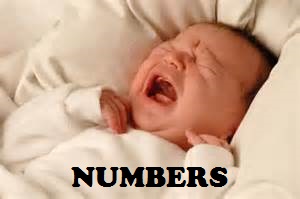
Don't cry. We will read you again next year, hwhy willing.
!qzxtnw !qzx !qzx
"Khazak! Khazak! V'neeth-khazeyk!"
"BE STRONG! BE STRONG! AND MAY WE BE STRENGTHENED!"
Any questions or comments can be written to
the.aleph-tav.project@msn.com
SHABBATH SHALOM

_______________________________________________________________________________________________________________________________________________
_______________________________________________________________________________________________________________________________________________
Copyright 2014 The Aleph-Tav Project - NVU's Website Design Software by The Premier Group